Class Poll on
Leadership
Inspired by a
TED Talk, I've been
asking my students about leadership - where do leaders come from, how
are good leaders created, what should those African countries do when
they have bad leaders. According to
Patrick Awuah
from
Ghana, leaders come from
a liberal arts education, and the root cause of poor leadership in his country is the
emphasis on rote learning, rather than developing values and critical
thinking.
It's ironic that Confucius was the
inventor of active learning. He told his followers: If a student
comes to you with a question, do not give him the answer. Tell him
how to find the answer for himself. Unfortunately, lazy teachers
over the centuries codified the thoughts of Confucius and made students
memorize them word for word, thus turning his active learning into rote
learning and ruining the reputation of Chinese education to this day.

I tell my students that they are
the smartest people in China, or else they wouldn't be in university.
This is where the future leaders of China will come from. But of
course not everybody is going to be a leader. Most don't want the
job, though I had one class where the vote was nearly even.
Comment
on this Post
Small Business, China
Style
Ruth discovered a hole in her
favourite light weight hiking pants. I've had holes in my pockets
for years. So we went off looking for a seamstress and found this
lady at work beside the meat and vegetable market.

She
did an excellent job, and charged us the princely sum of 3 RMB, about
five cents Canadian.
Comment
on this Post
Street Food Revisited
One of our favourite light lunches
here are the pita pockets this couple makes while we watch.
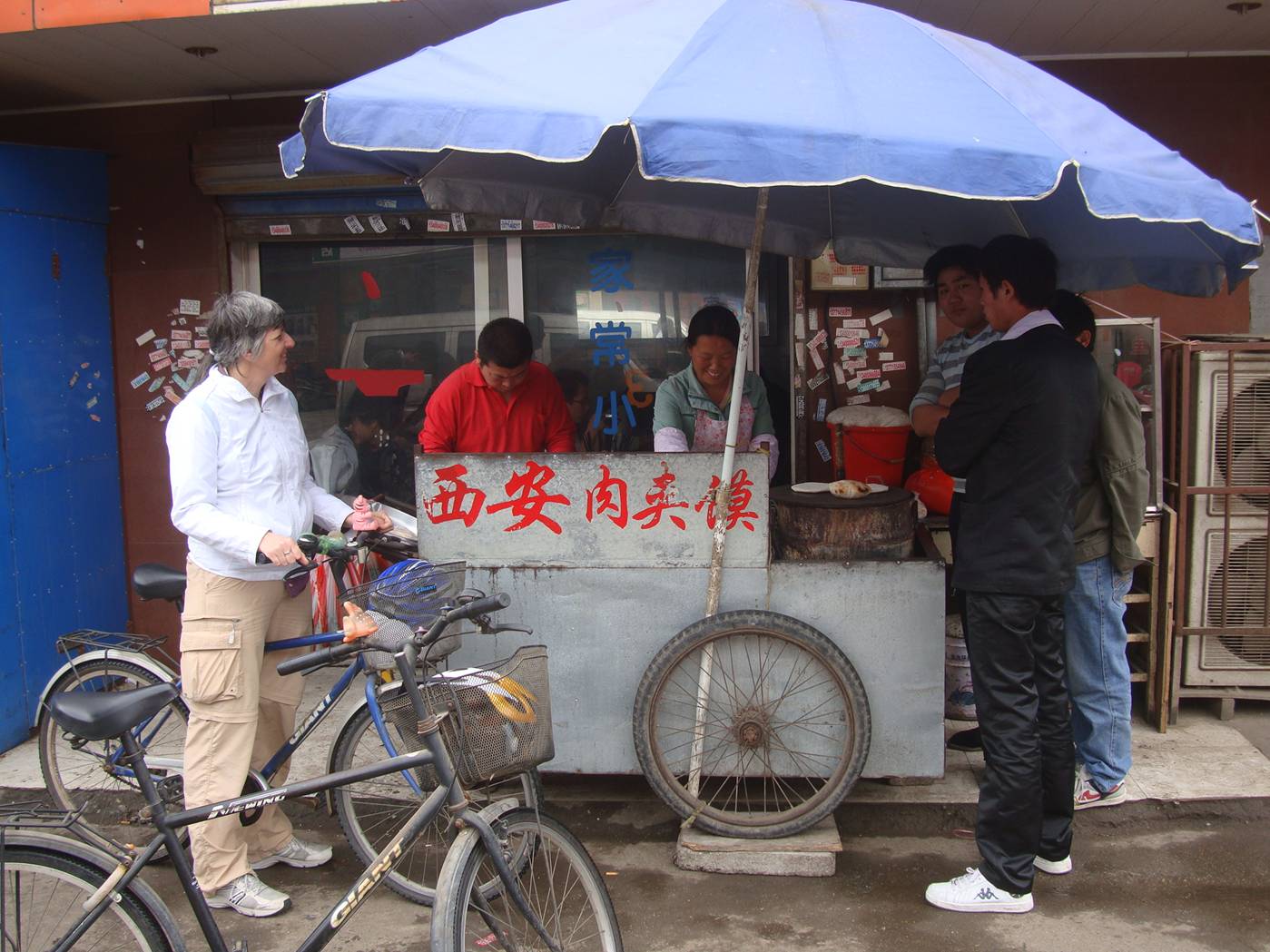
It's a husband and wife operation,
with her rolling out the dough, doing the baking, and handling the cash.
He's kept busy preparing the filling and packaging the product.
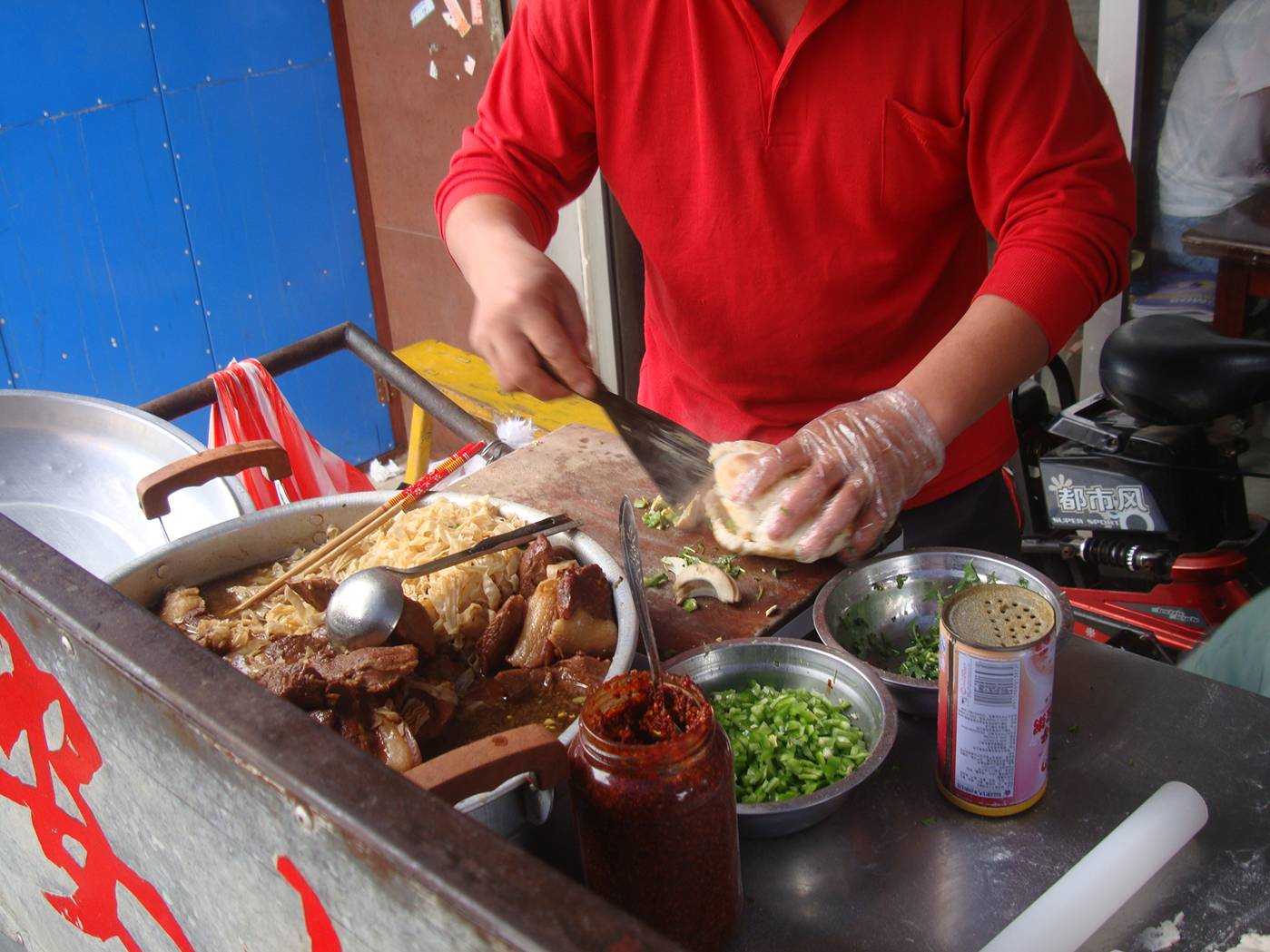
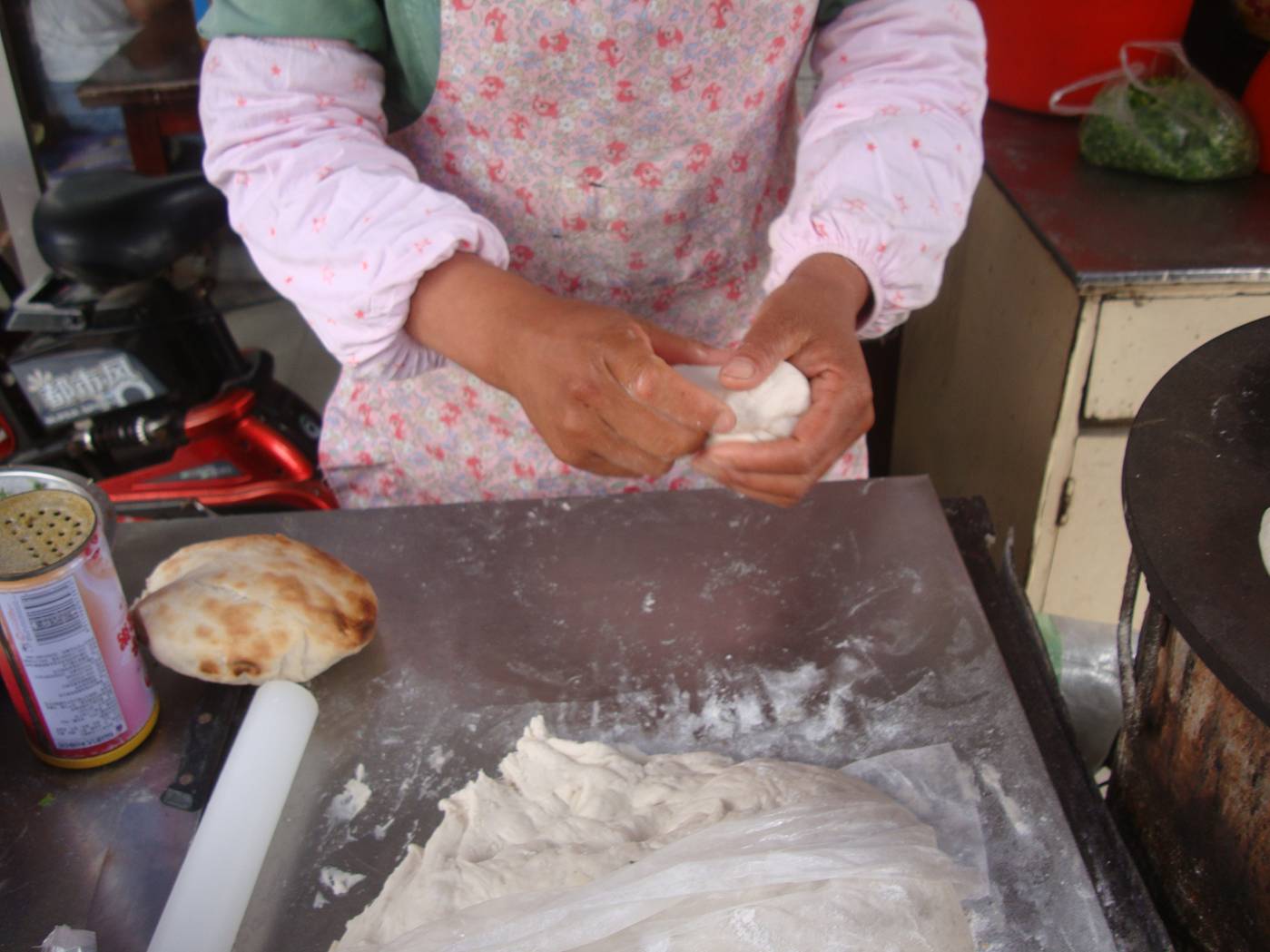
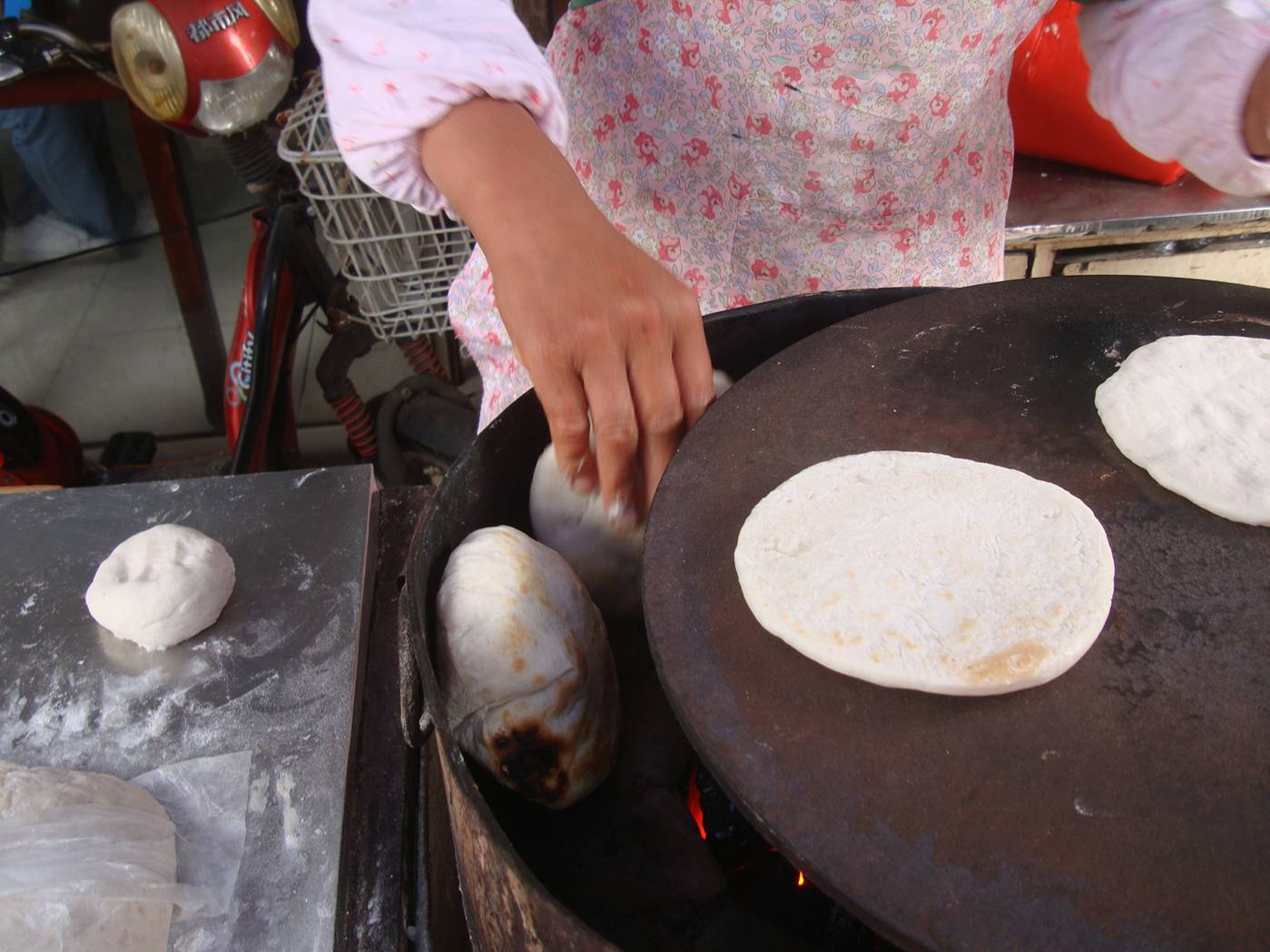
The end result is delicious, and
I'm really tempted to set something like this up back in Canada,
complete with funky oven made from a forty-five gallon oil drum.
It would be fun to see how such street food goes over in English Bay, or
maybe the waterfront park in Nanaimo in the summer. I wonder how
much red tape I'd have to go through to get the permit.
Comment
on this Post
The End of a Village
Just down the
road, half a block from our street food couple, it looks like a war zone.
So long Shi Tang Cun, the little
village within walking distance of our campus. Already the major
residential part has been leveled, and we're expecting the market and main street to
go soon, all to be replaced with modern high rise apartments.
China will be a nice country when they get it finished.

China
is being renovated. A mixed blessing.
We're losing our little village.
Perhaps the people who have had to
live in the old buildings won't miss them, but we will. The charm
of a village where the streets are built to walking or bicycle scale,
and where the life spills out of the houses, is gradually making way for
the automobile and shiny soulless architecture.
The Chinese have an
expression. 旧的不去,新的不来 (jiù de bù qù, xīn de bú
lái) "Old not go, new not come." In a country with as much old as
China, we can see how they would be choked by antiquity if they got
sentimental about every old neighbourhood. Still, we get
sentimental. We like the little village, and we're pretty sure
we're not going to like the new apartment complex nearly as much.
Comment
on this Post
Appreciating Clever
Image Idea
We found this poster ad on the wall
of our favourite fast food noodle restaurant.
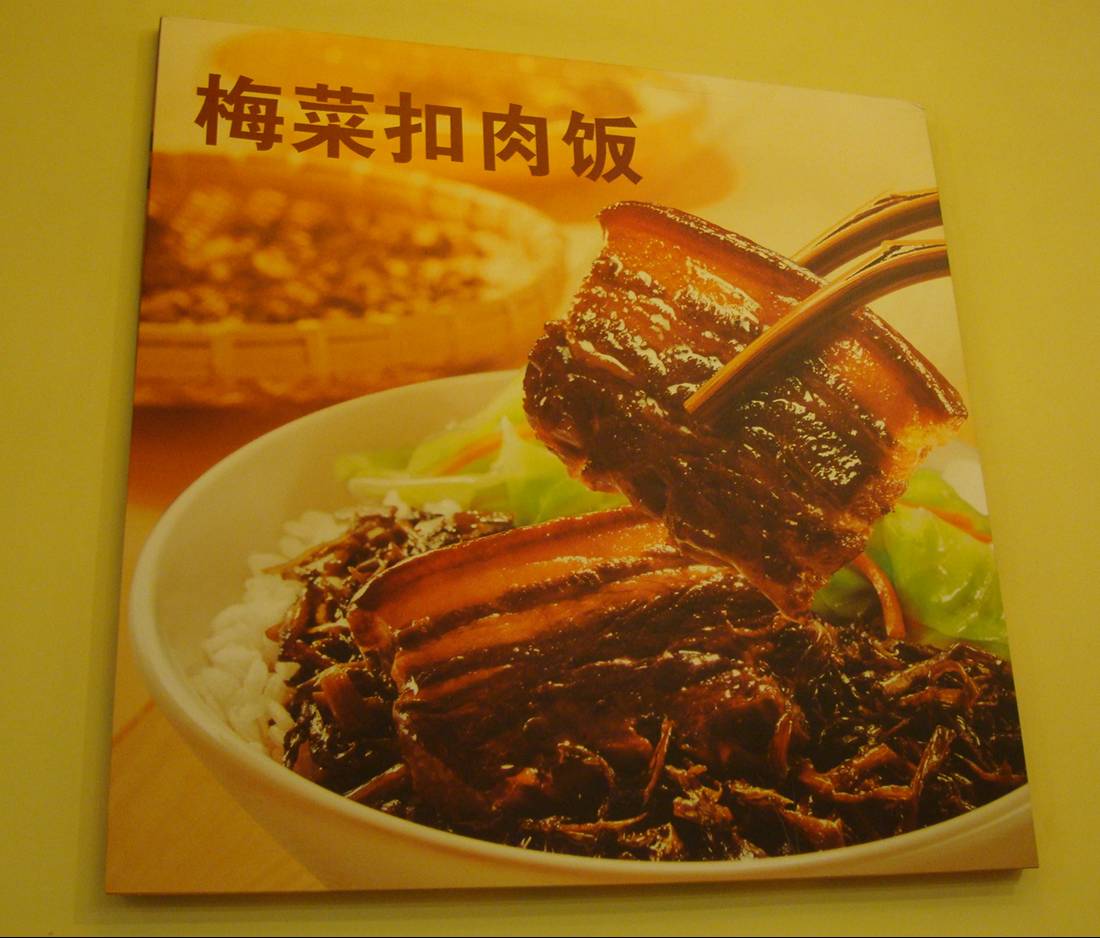
I like this
because it's slightly subtle, if that isn't redundant. Note
the broken chopsticks. Chunks of pork so thick and heavy they'll
break your chopsticks? Clever.
Comment
on this Post

Chinese Word of the
Day: 工作
(gōngzuò literally "work" + "do") n. work or job
Bonus word, 饭碗
(fànwǎn literally "rice bowl) = 1. rice bowl 2. job, means of
livelihood
May 09, 2011 It's
Official - New Jobs Next Year
This is our last term at Jiangnan
University. Apparently there is a rule at some level that
foreigners can't work for more than five consecutive years at the same
school. So, since this is the end of our fifth year at Jiaggnan
University, we'll be moving on.
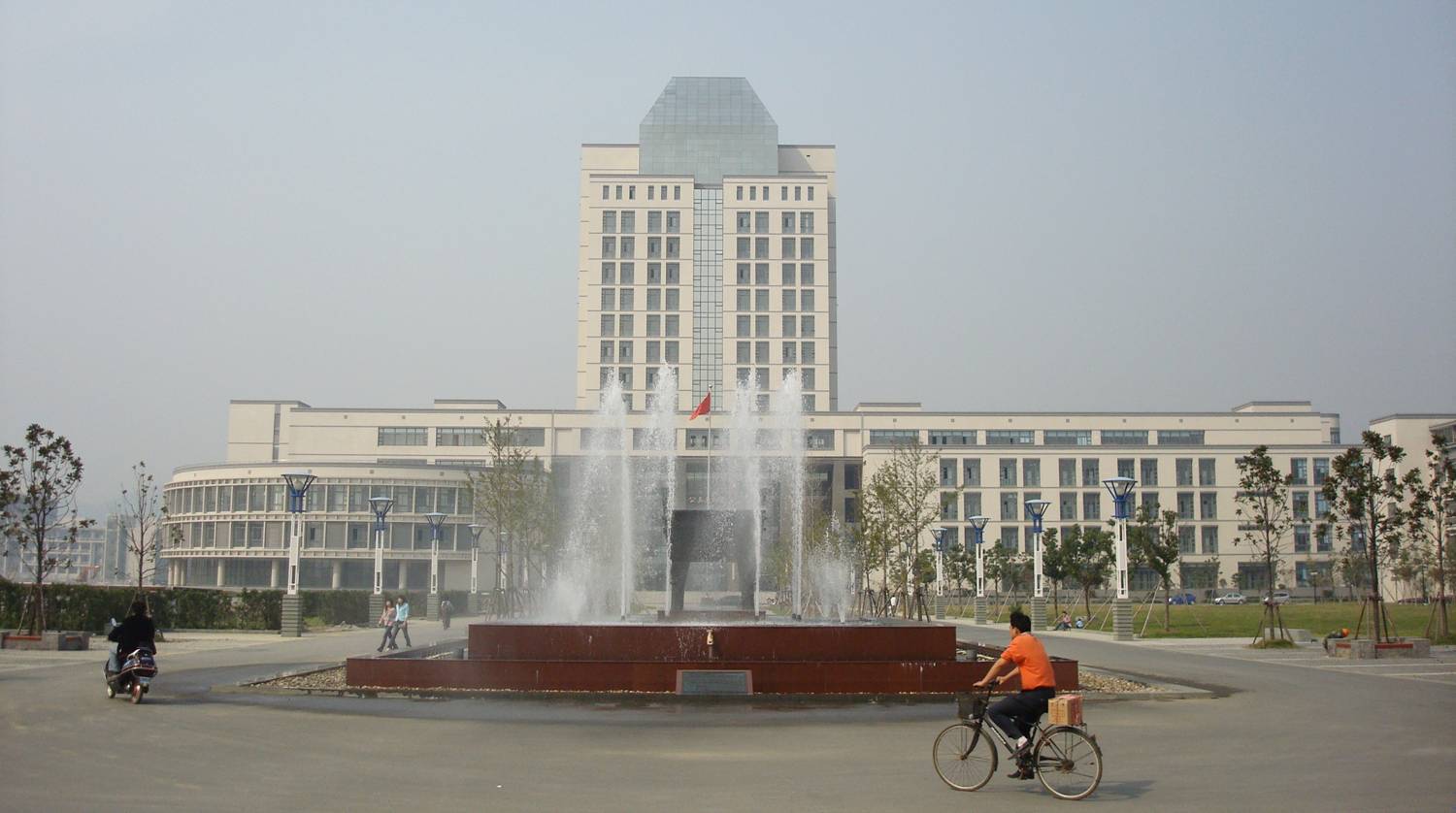

Goodbye Jiangnan University
Hello Lambton College
That's the sad news. Jiangnan
University and the administration staff here have treated us very well,
and made us feel valued. It's been a very enjoyable five years, too
short a time by half.
The good news is that we won't be moving far.
We've been offered work at Lambton College, an affiliate of an Ontario
university, that shares the campus with Jiangnan University. So
same campus, maybe even same apartment. Different administration,
but not all that different since our former boss at Jiangnan University,
Ms. Liu, is now the head of Lambton. We're hoping for minimal disruption to our lives, and we're
very happy to be staying in Wuxi close to our Chinese friends.
Comment
on this Post

Chinese Word of the
Day: 公园
(gōngyuán literally public + garden) n. park
May 07, 2011 Random Adventures and
News
I've been building my second
bullwhip. Our Australian friend, Marion, brought me back two
beautiful kangaroo hides when she returned to Wuxi this past October.
Now I'm cutting lace and trying to duplicate the whip I bought in
Seattle way back in 1974. My excuse was that I needed a prop for a
western I wanted to make, but really I want to play with a good
bullwhip. I've come to appreciate what a great bullwhip that one
is. Though very old now, with a couple of broken strands, it's
still tight and solid and the kangaroo hide is still looking good.
You can read in the comments last month a question from a student, asking me why I
would make a bullwhip. "Are you a farm hand or a maniac?"
the student asks.
Maybe a bit of both. I've been interested in bullwhips since
growing up on the adventures of
Lash LaRue, a major cowboy star back in the fifties.
He used his whip not so much as a weapon or to inflict pain, but to
disarm the bad guy, taking the gun out of his hand. He also was
one of the most romantic of cowboys, and I remember one scene in which
he lounged in a meadow with a pretty woman and used his whip to pick her
a flower. My kind of cowboy hero.
Despite the current association of whips with the S&M
scene, they are legitimate ranch tools and can be very useful. But
they are also fun to play with, and the only way I know of to break the
sound barrier without owning a jet airplane. That's what makes the
bang when you crack a whip. The tip actually travels faster than
the speed of sound.


The
new whip is taking shape, and promises to be an improvement over last
year's model. But no easier to make.
As part of this effort, I
needed to find sheep fat from which to make plaiting soap.
One would think that this would be easy to find in a city where
every second street corner has barbeque lamb on skewers. Not so.
The meat of the people in China is pork, and that was all we found
in this huge meat market, except for one large and very expensive
mutton roast one of the vendors had in his freezer.
We'll be eating Scotch broth
for lunch for weeks, but I did manage to render down enough fat to
make my plaiting soap. I saved half of
it to make the beeswax leather dressing, but now I only have a quarter
of it because GouGou found it in my office and what dog could
resist a feast of sheep fat?


Leaving the meat market, we
discovered a huge pet store area, with a monster fish department and all
kinds of birds and dogs and bunny rabbits.

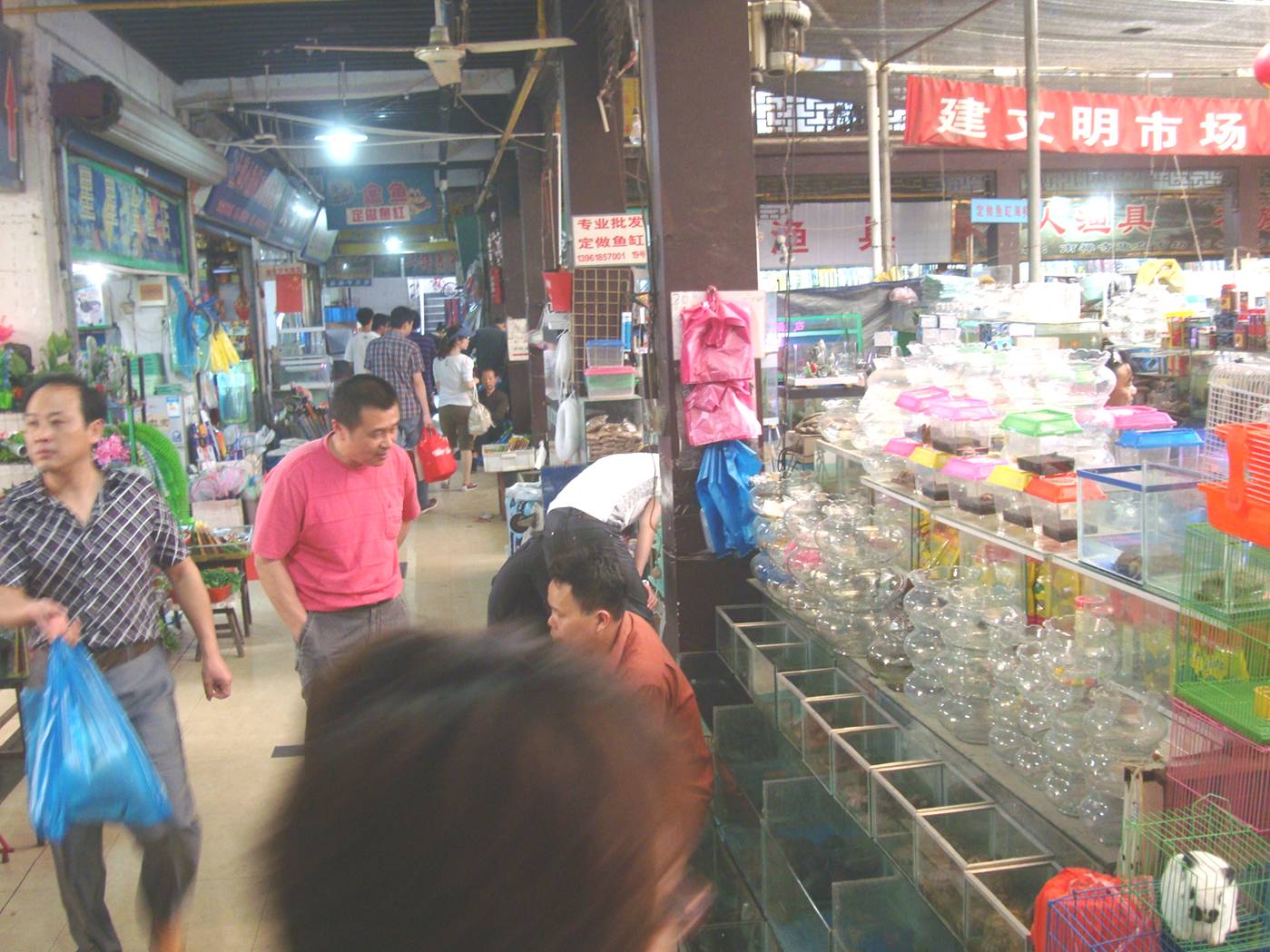
We'd been wondering where the pet
sellers from Nan Chan Si had gone, and now we know.
Comment
on this Post
Small Business in China
I found this man repairing shoes
near the student dormitories. This is something you are never
going to see in Canada.
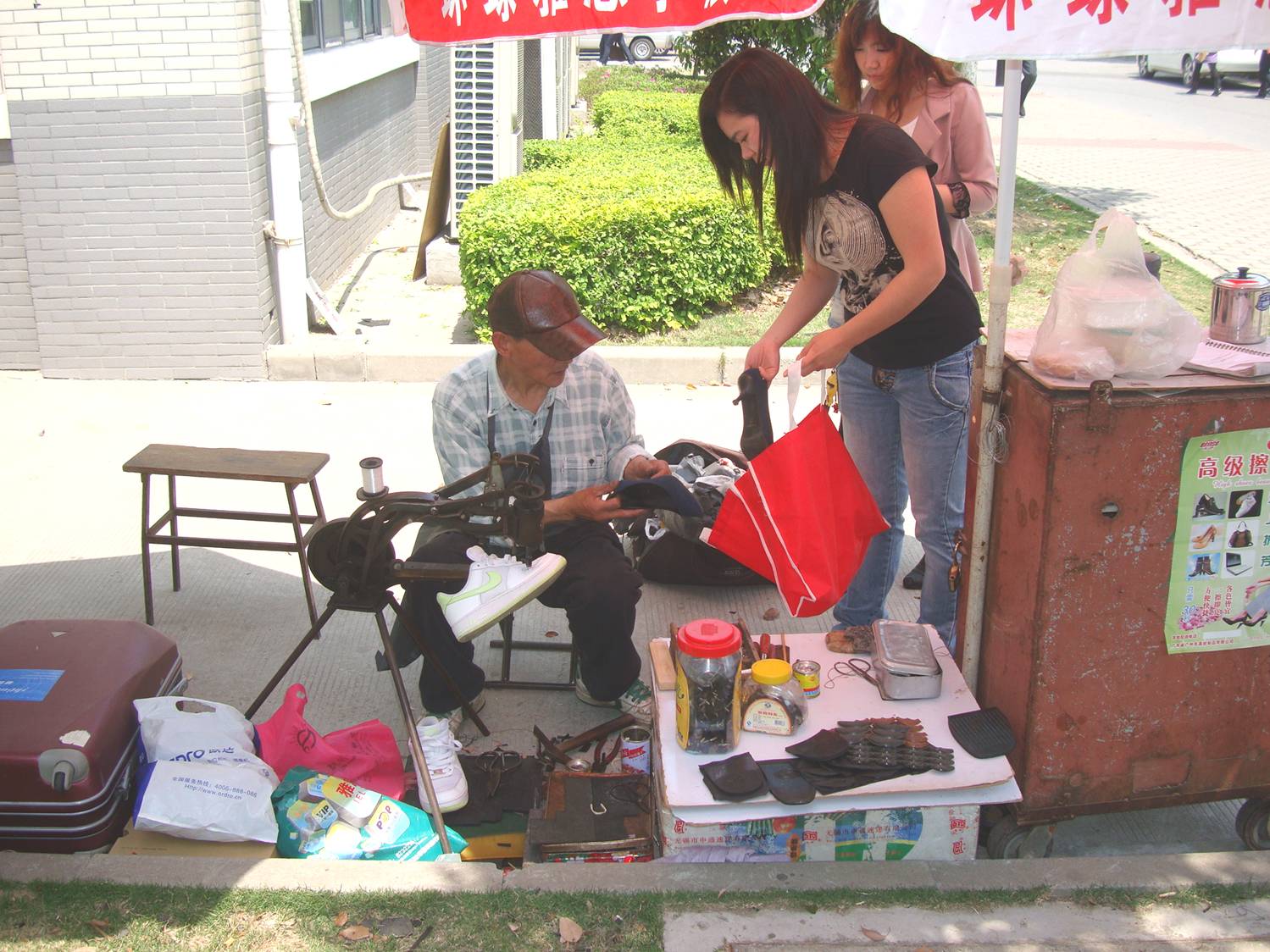
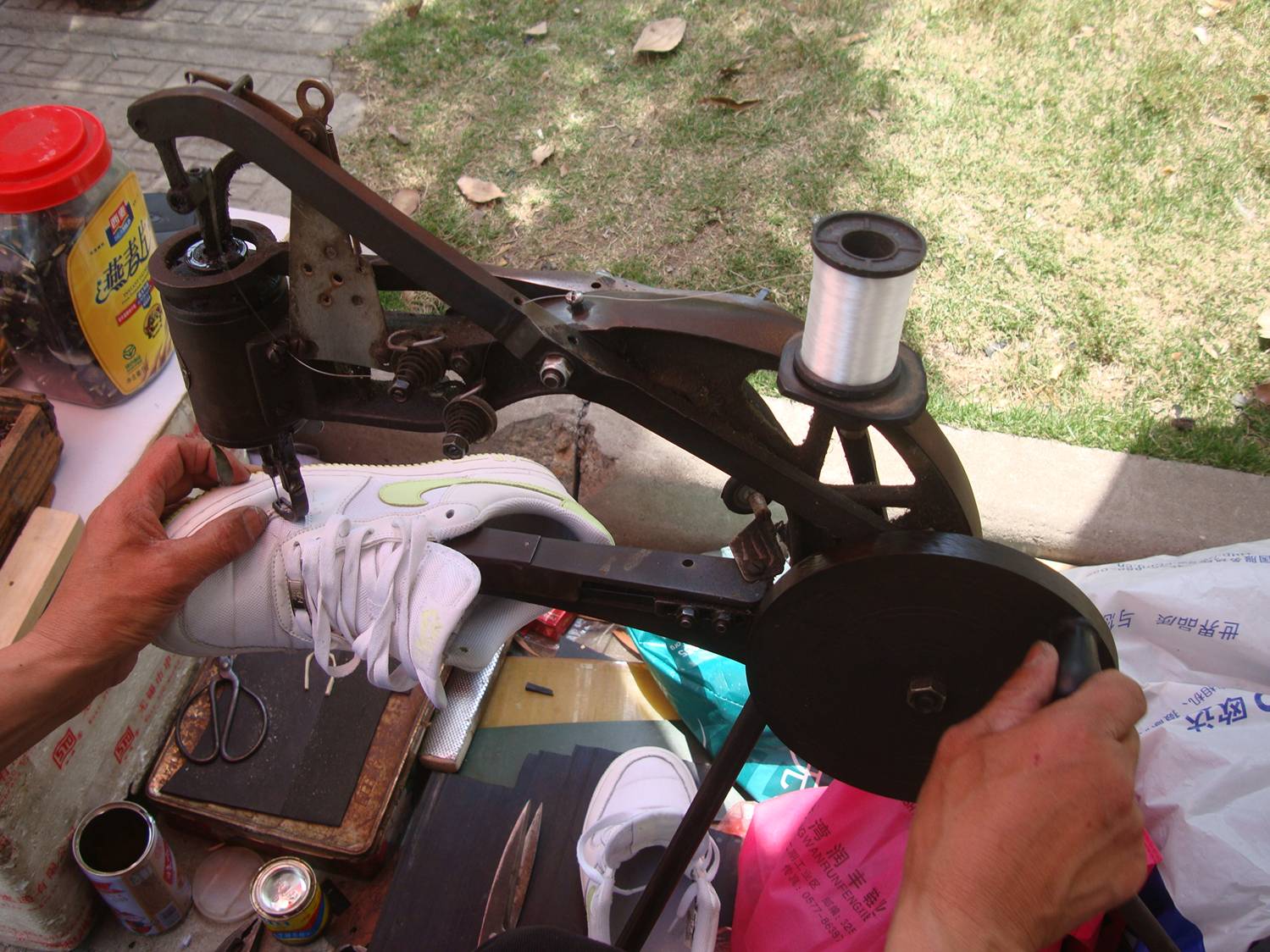
I love this guy's hand cranked
sewing machine. Leather and rubber are tough to sew. This
machine must be geared down for really tough material, and it requires
no electricity. I don't know when I'd ever use it or what I would
ever use it for, but I'm buying one if I can find it here. I have
sailor friends back home who would really appreciate a machine like this
one. Like washboards, it's probably still being manufactured in
China. Hard to find in the west.
Comment
on this Post
Too Much Fur
I got a call from the boss of the
bike store, the man who gave us GouGou, saying he had another dog he was
trying to place. We don't really want another dog, but our friend
Prince wants a dog so we introduced them. She's not ready to adopt
yet, but she called me to say she wanted to give the bike store dog a
bath at our place. It turned out that Prince is still nervous
around dogs, and was worried that this one would bite her. So I
got undressed and into the shower with the puppy.
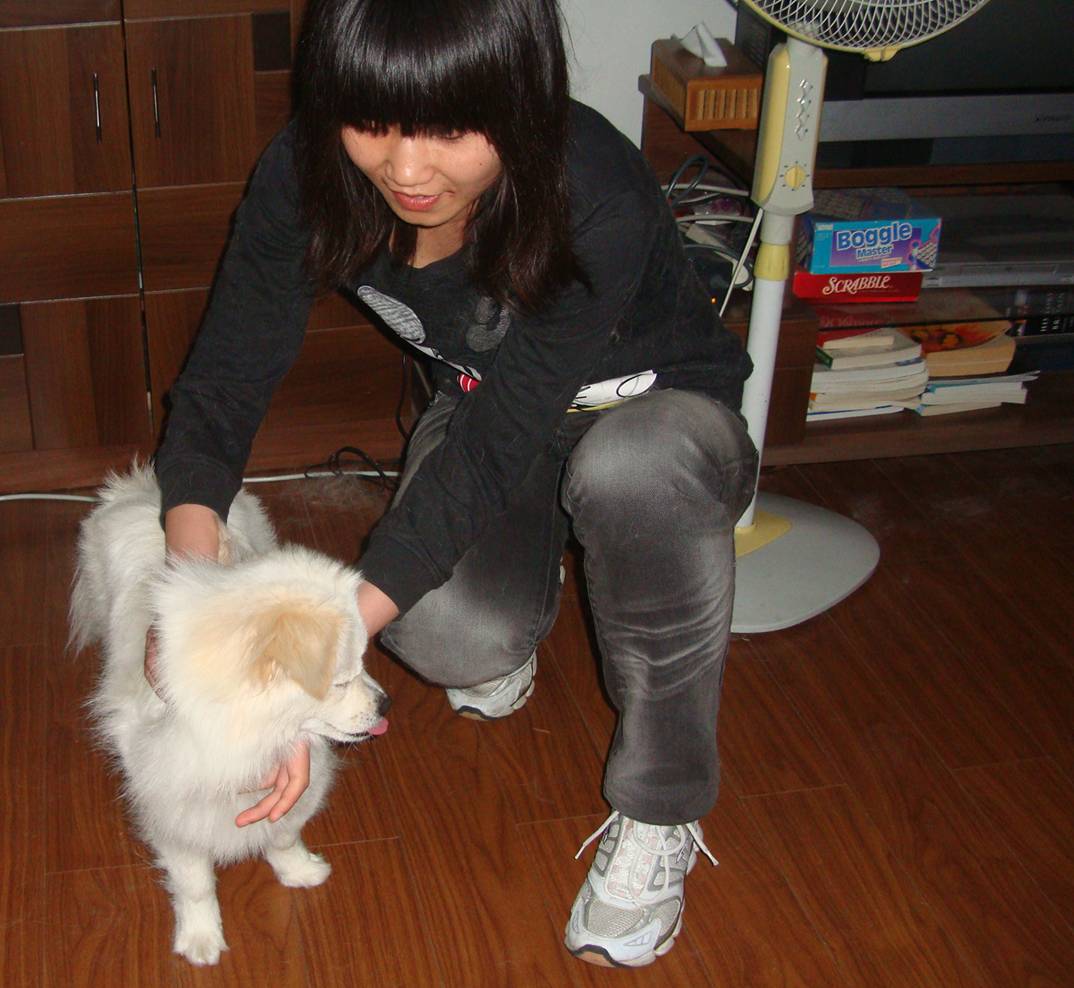

I wish I'd taken a "before"
picture. This dog was DIRTY. Water ran black in the shower.
And his fur was incredibly matted into Rasta dreads. It took an
hour or more of brushing before the dog you see above emerged.
What a cutie. I'm tempted to adopt him myself, but we already have
a lot of dog hair in our apartment. One dog is enough. Sigh.
Comment
on this Post
A Walk in the Park
This time of year we like to get
downtown to Xi Hui Park, just to take in the flowers. Wuxi has
been doing an incredible job of sprucing up all public places, and Xi
Hui Park is no exception. New walkways, new gate house, new
bridges. Everything is clean and upscale.

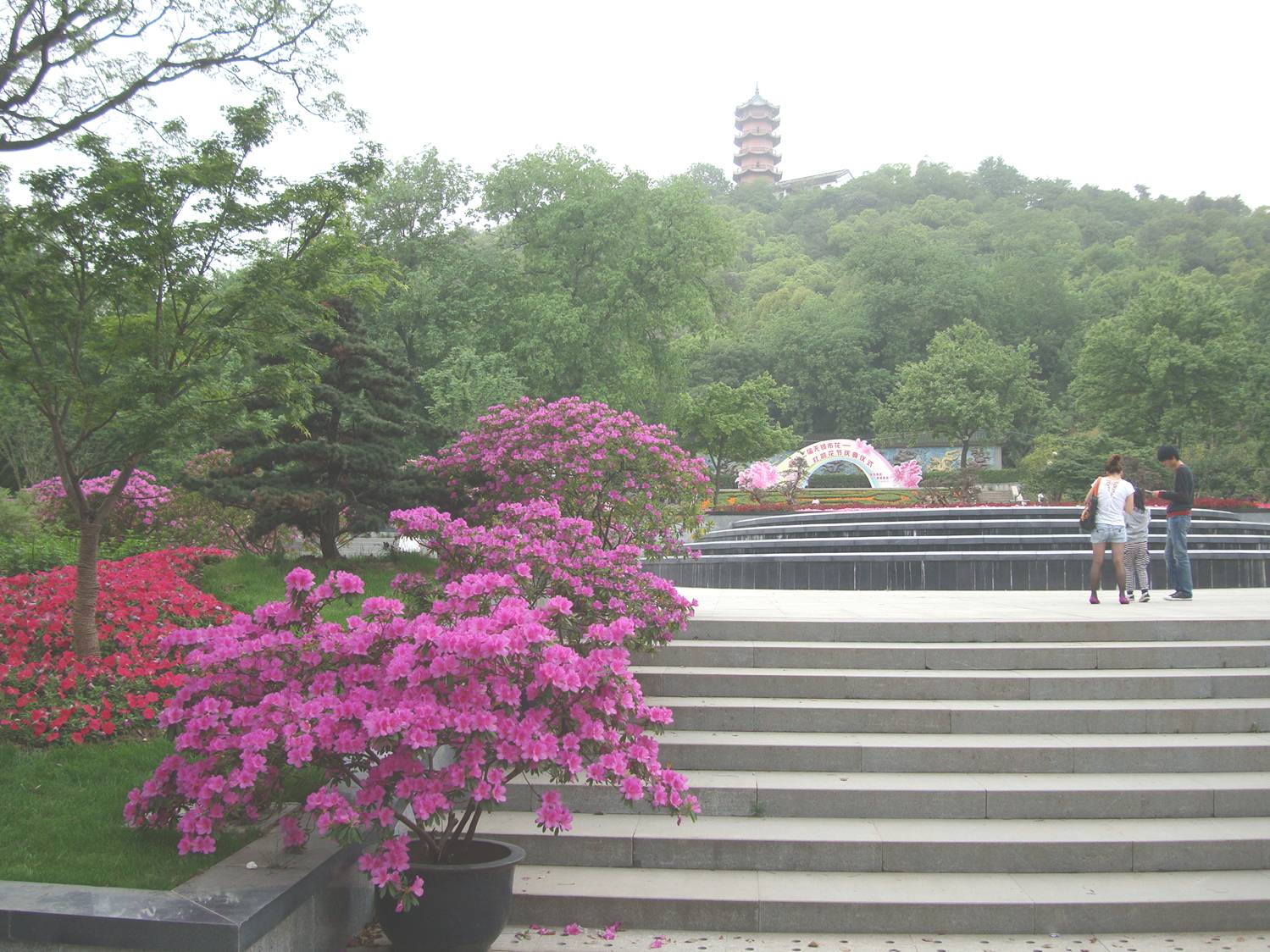
I was surprised to see the park so
nearly empty. It was May 2, a day we expected to be a holiday.
So logic said that the park should be shoulder to shoulder crowded.
But it wasn't. Apparently on this Labor Day, the laborers were
laboring.

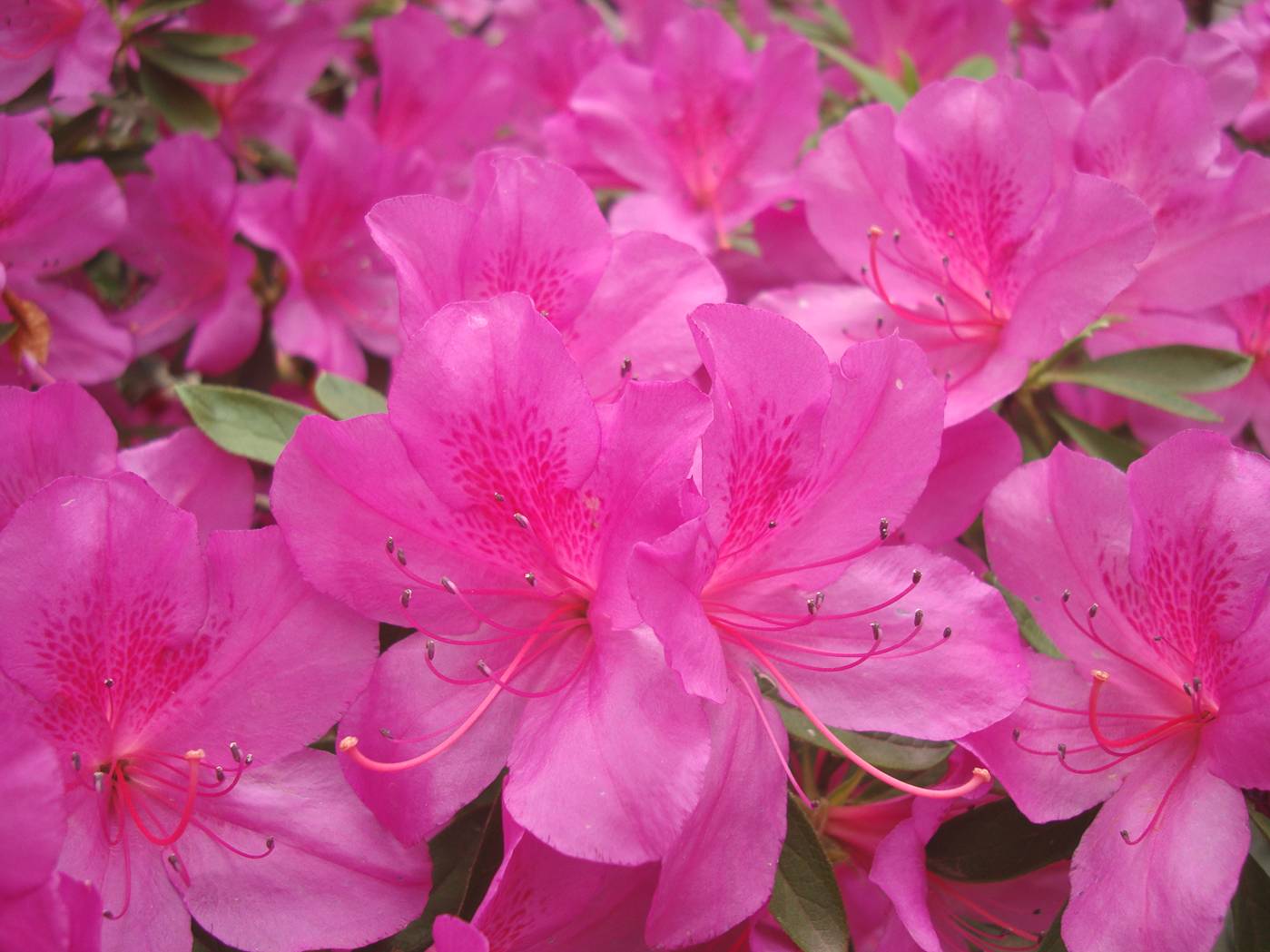


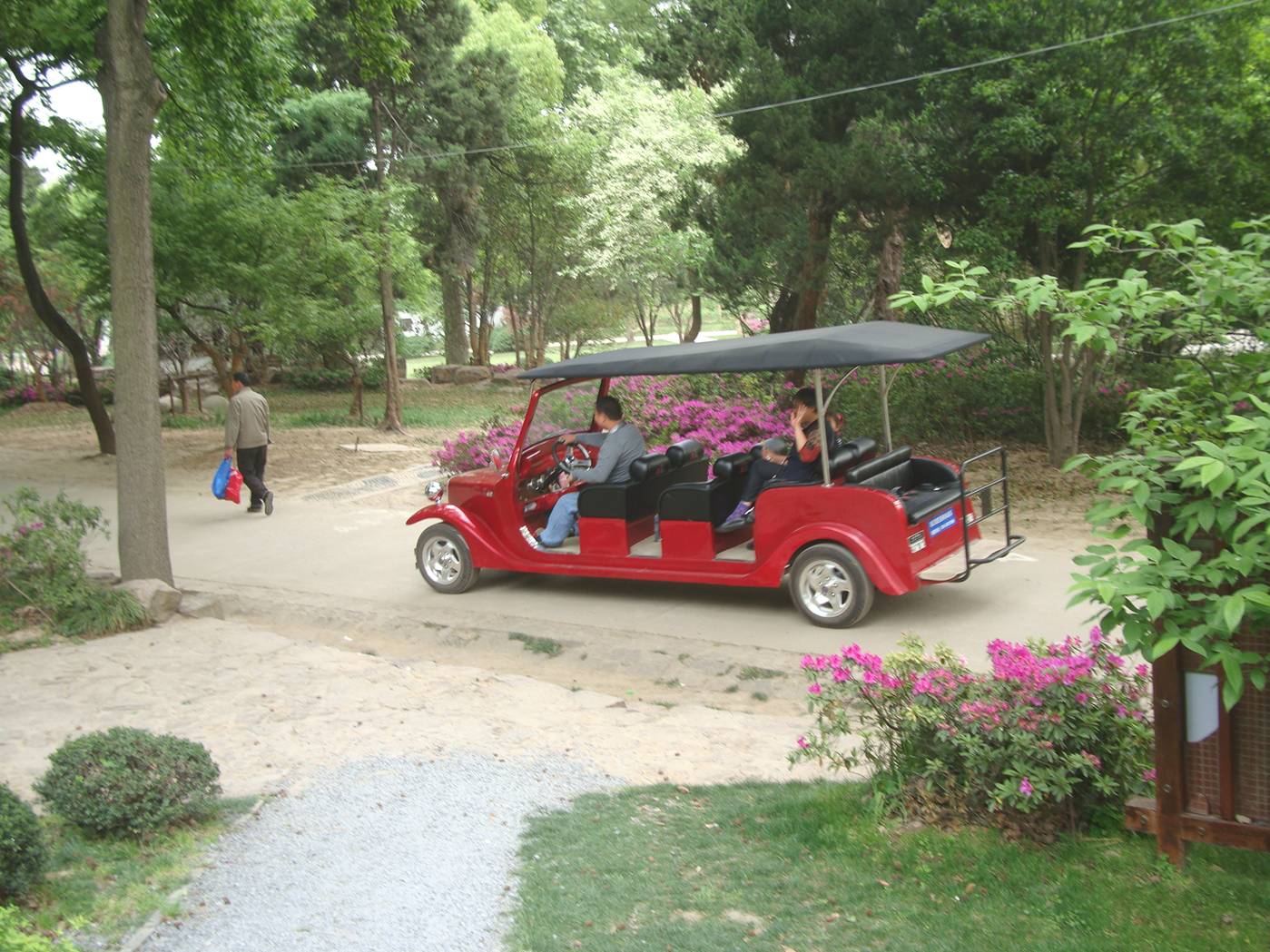


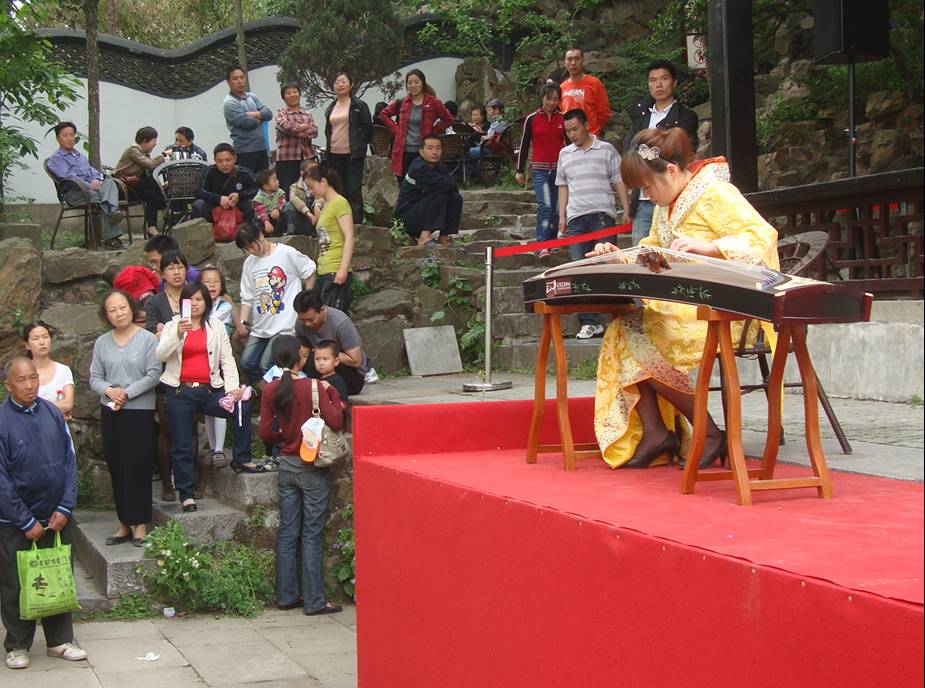


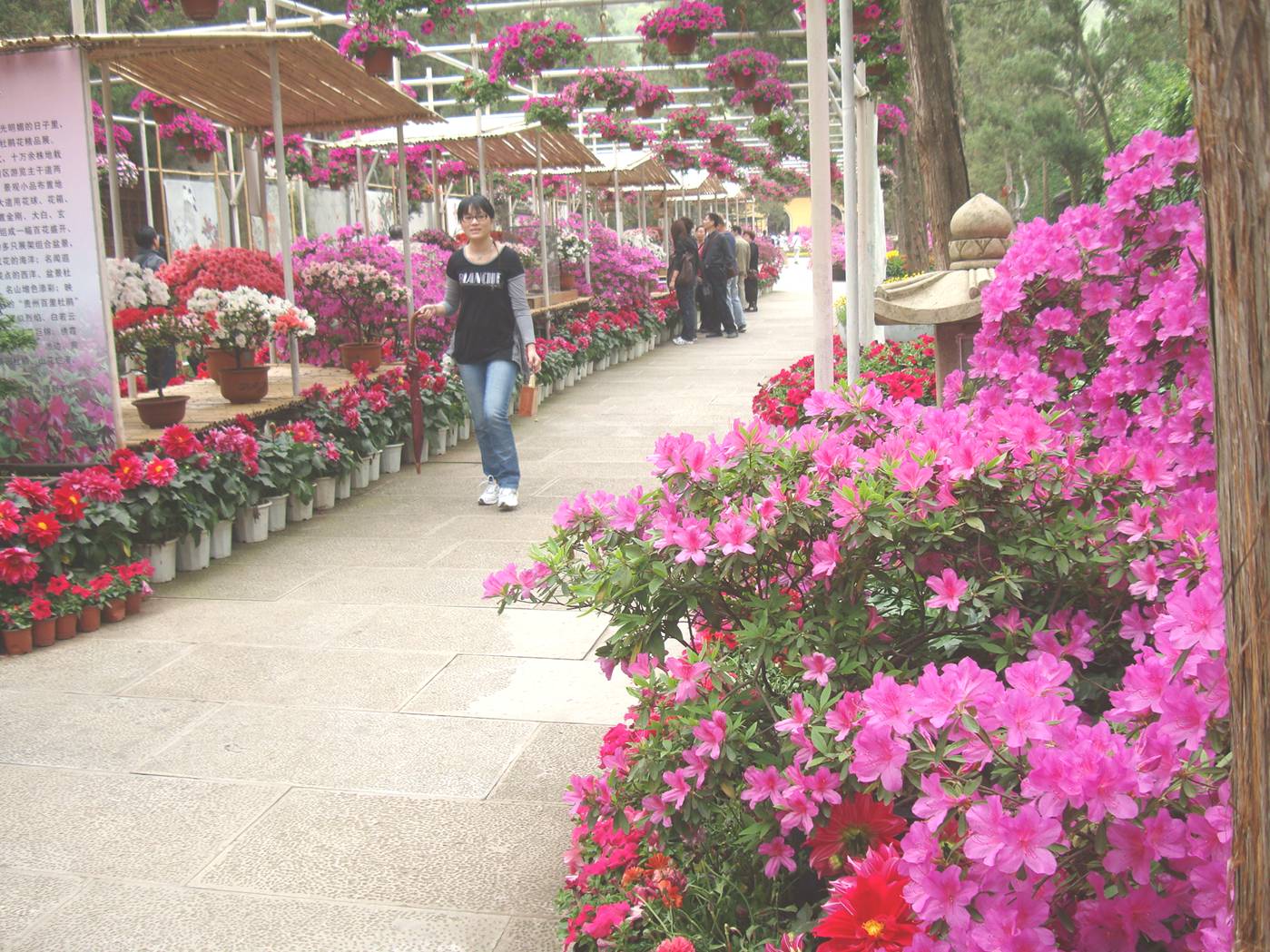
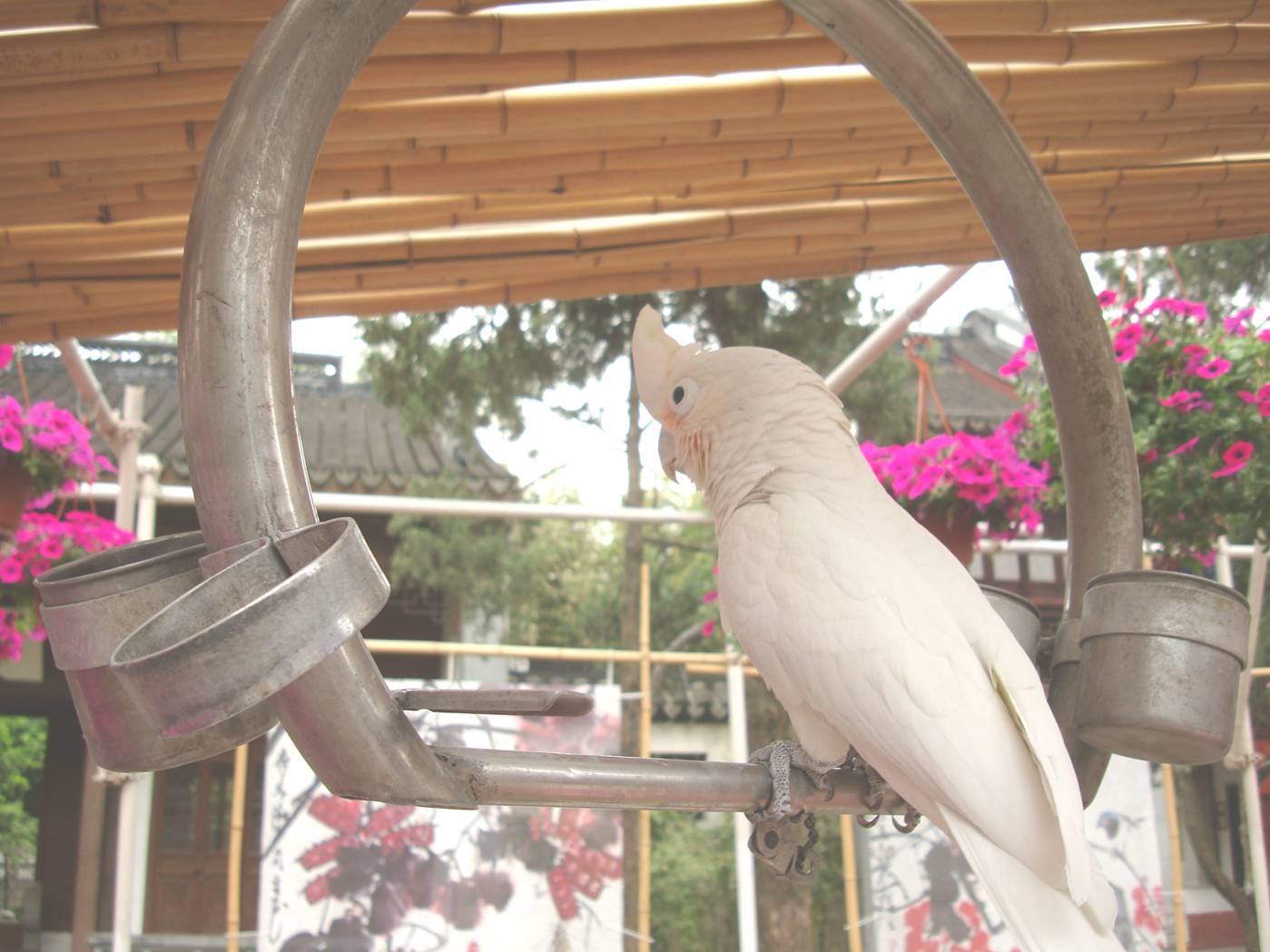
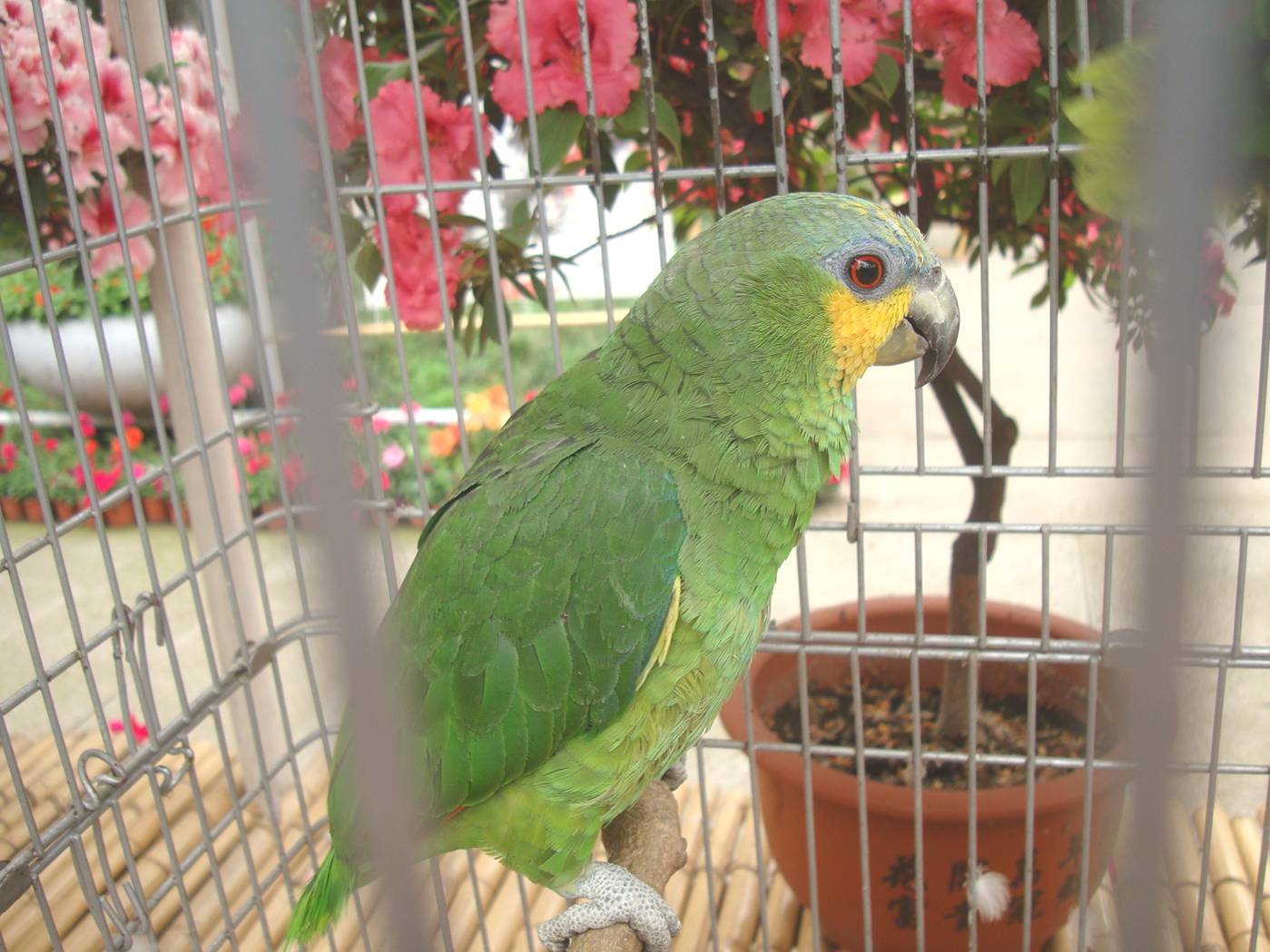
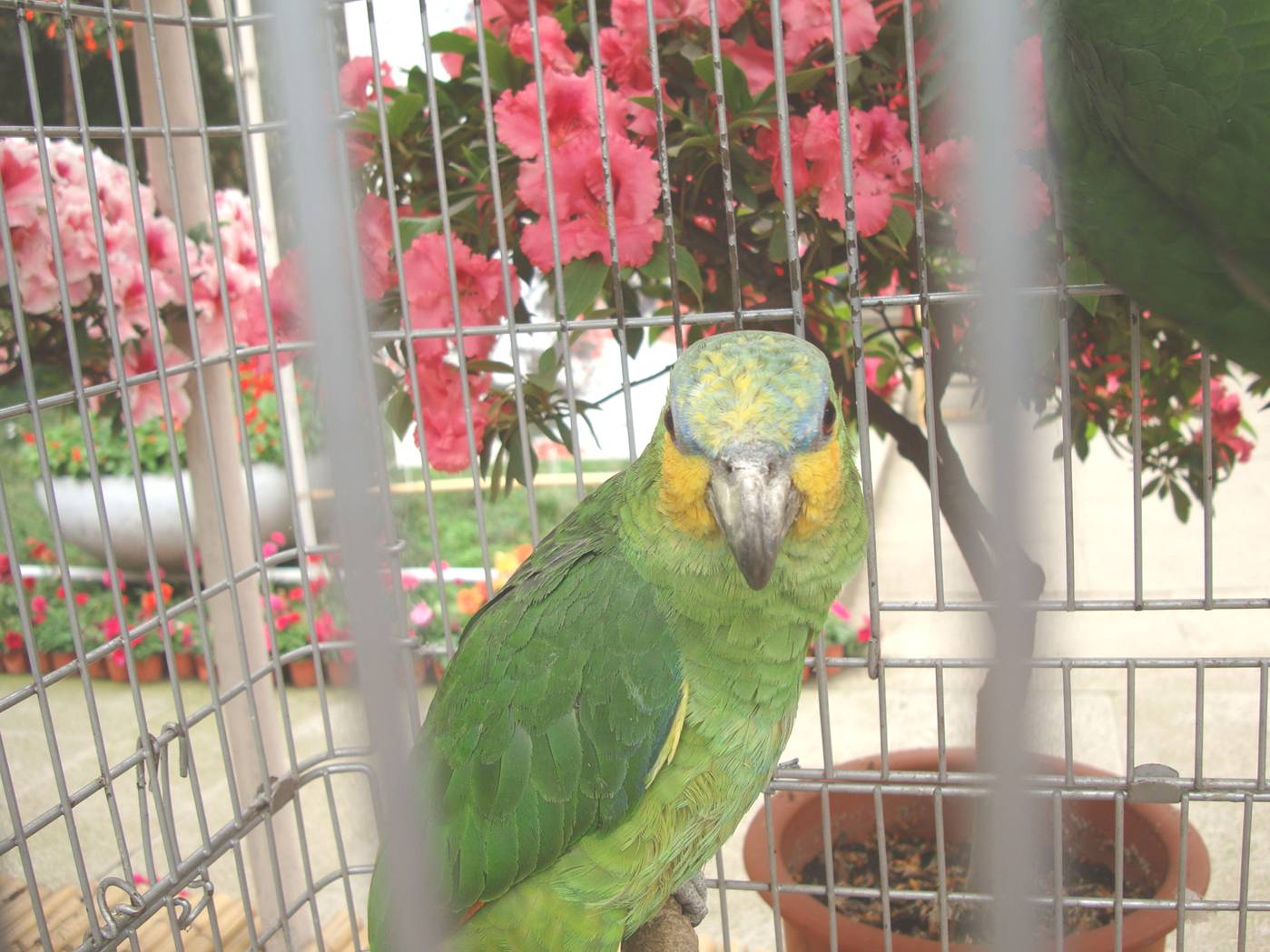



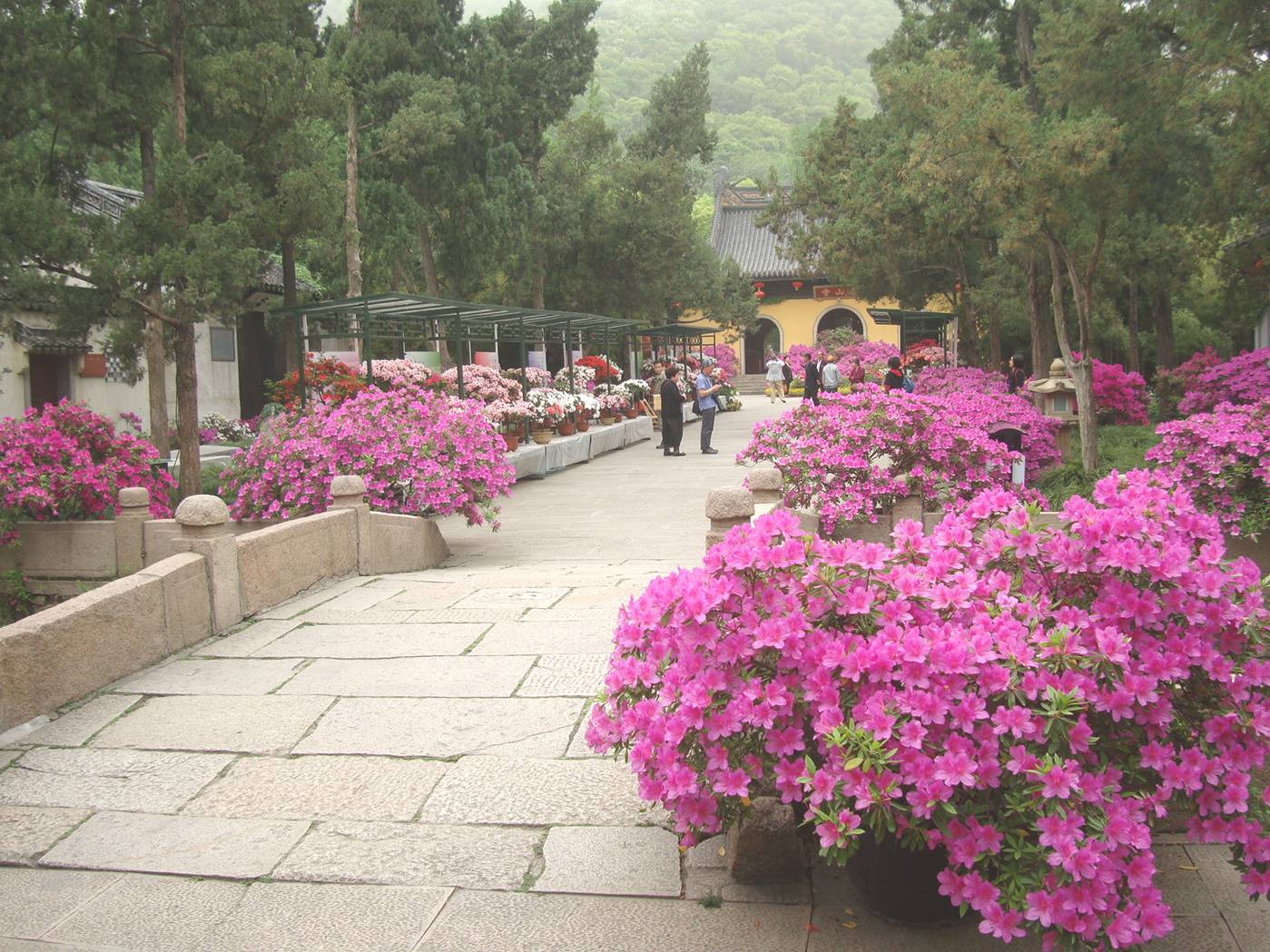

And that took us to the exit we
wanted, the way into the restored ancient city of Wuxi.

Just Outside the Park
They're doing a beautiful job of
restoring the old part of town, and it feels wonderful to stroll the
street along the old canal. They've made great progress since our
visit last year.


Looking west from the bridge, the renovated canal, and looking East from
the bridge, canal under construction.
The grounds of the museum are
particularly beautiful, a favourite place for the art students to
practice their craft.
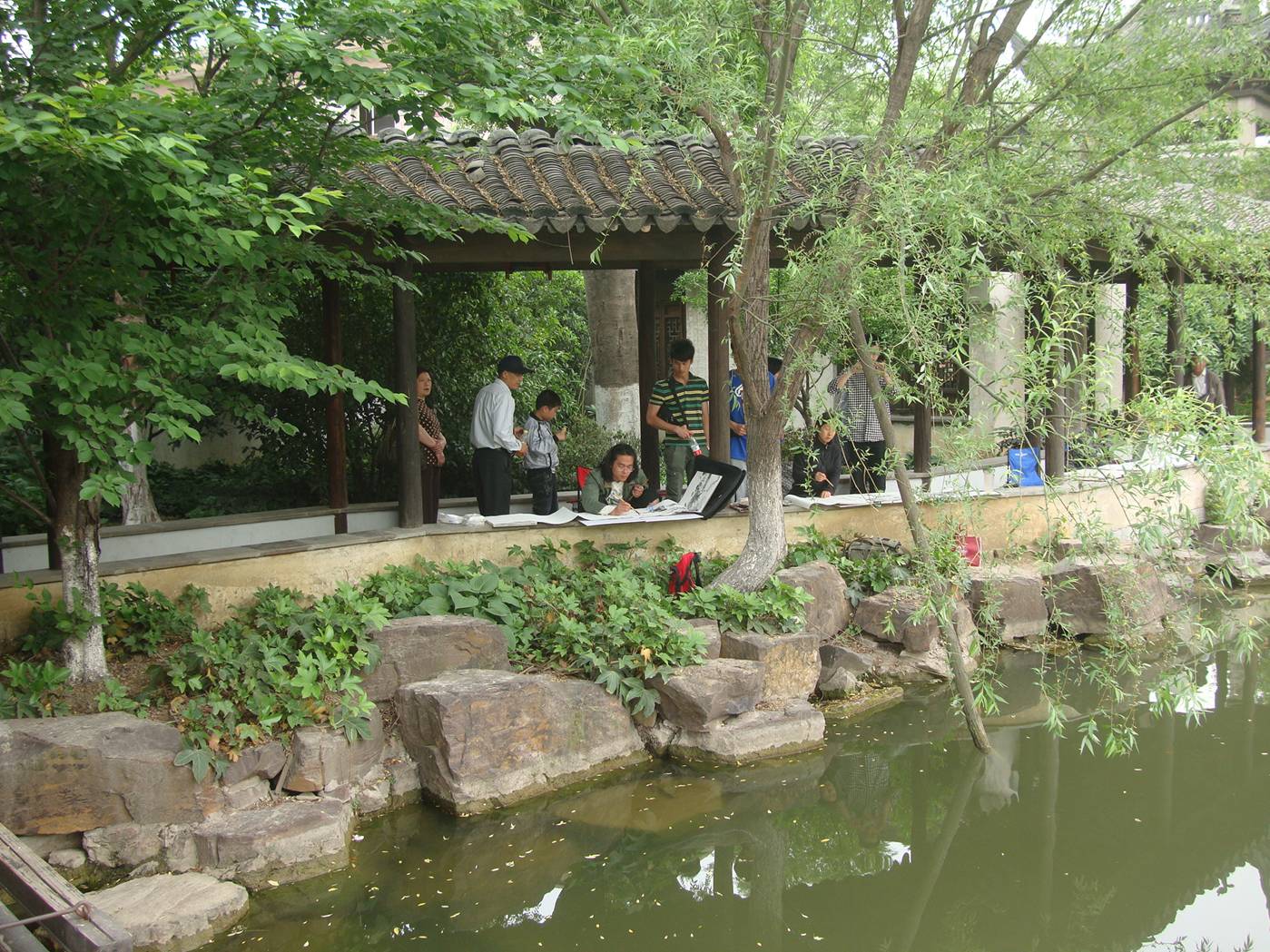
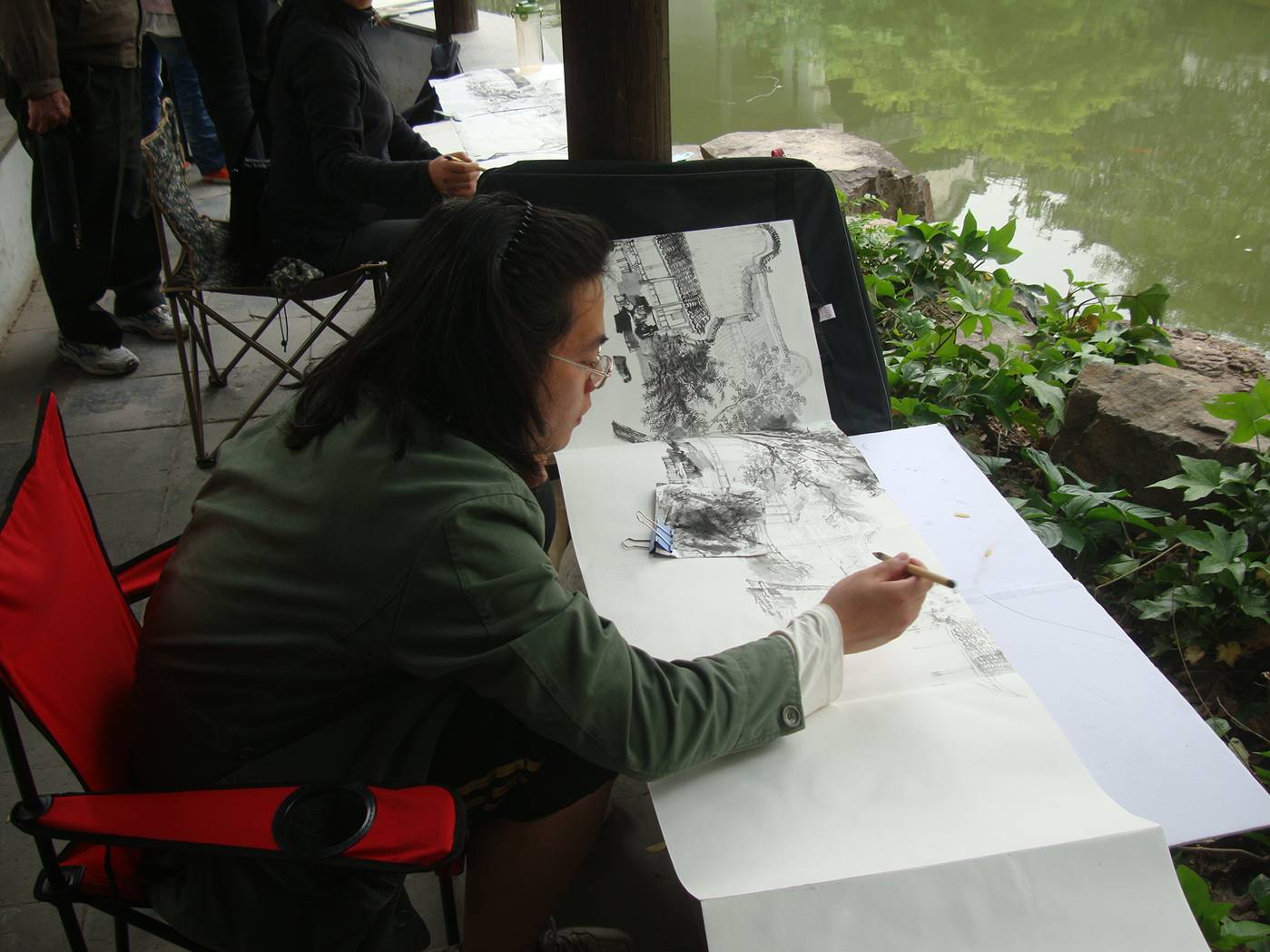
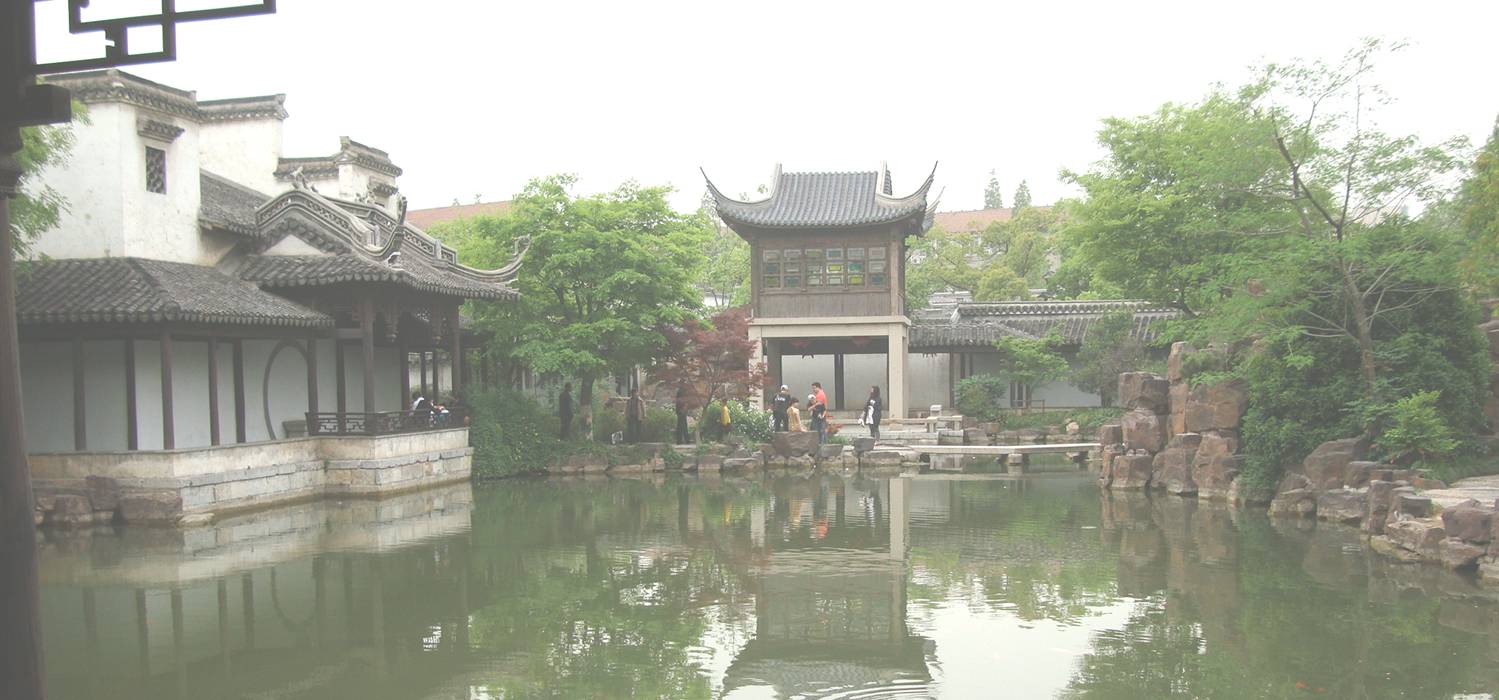

And a favourite place for a father
to spend quality time with his son.
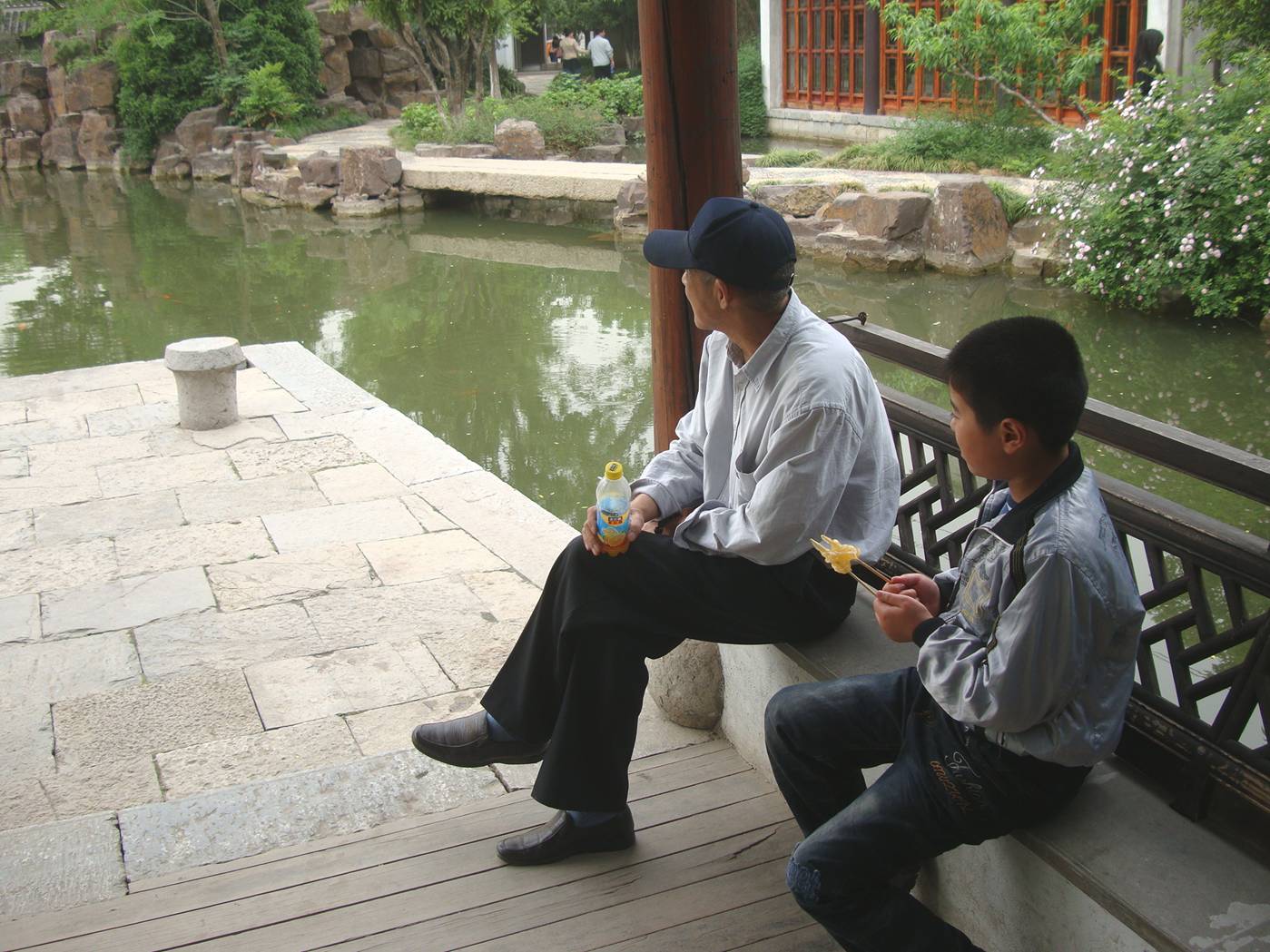

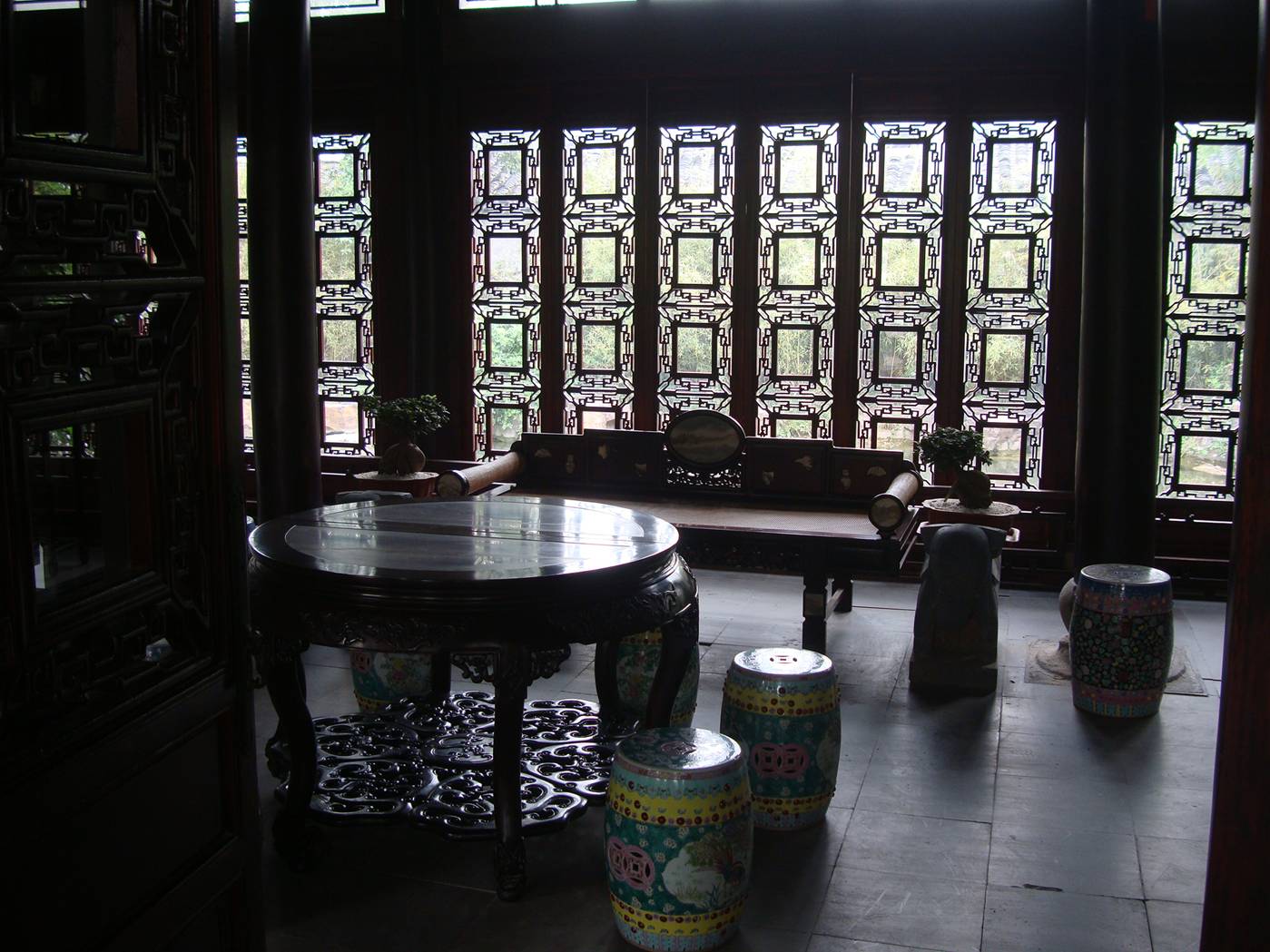
Classical Chinese style - a mixture of the elaborate and the simple
arrangements. Classy.

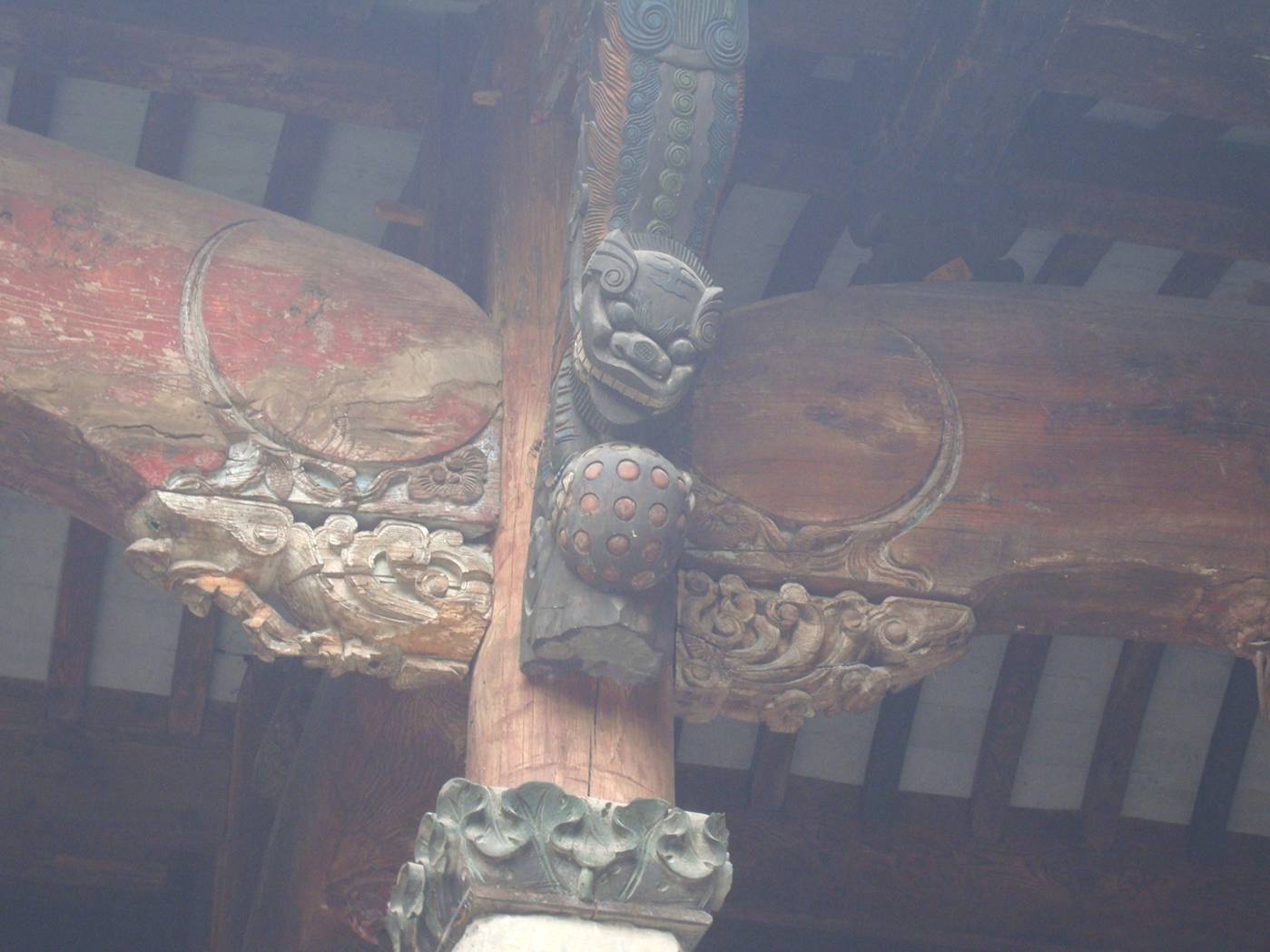
Comment
on this Post
Job Security for Ancient Scribes
In the museum just outside the
park, we came upon this display of ancient Chinese writing. It
confirms a suspicion I've held for some time now. The more I study
Chinese, and the more I try to learn Chinese characters, the more
convinced I am that the writing system was created in part to accentuate
the social distance between the elite educated class and the workers.
:

When we look at the ancient symbol
for "eye", we see something that anybody, anyplace in the world, would
recognize as "eye". But just look what this has become in
"simplified" modern Chinese characters.
 yǎnjing n. eye
yǎnjing n. eye
I can only see one explanation for
this. Ancient scribes and scholars complicated the characters to
make learning them more difficult, and to ensure that their elite
position was not challenged by the common people. Before you go
accusing me of cultural bias, consider this: The European world
did the same thing. For centuries, educated people wrote and spoke
Latin. The bible was only available in Latin. You could tell
a common person by the inability to recite Latin declensions. It took
Guttenberg and the Enlightenment to change this, and the change did not
happen without resistance.
Here is the modern Chinese
character for jiàn meaning arrow.
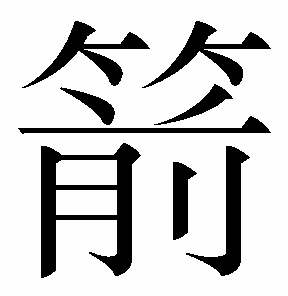 jiàn
n. arrow
jiàn
n. arrow
It
consists of two radicals characters, zhú, (the ones that look like the
letter K) that mean bamboo above qián which means "forward" (and an
arrow should indeed go forward or the archer is in trouble.) and is
described as phonetic in the dictionary, as in "qián" sounds a lot like
"jiàn" and may even have sounded the same in ancient times. Note:
"qián" itself is made up of a radical meaning "moon" beside a radical
meaning "knife", both under a radical that originally meant "foot". But
please. Is anybody going to tell me that this is the simplest and
most straight forward way to get across the idea of "arrow". Looks
like featherbedding to me.
Comment
on this Post
What the Students Think
I've been continuing my informal
class polls whenever an interesting subject comes along. Here are
a few of the latest results.

In
this officially atheist country, I was hoping to find a bit less
superstition. Doesn't seem to be the case.

This
is encouraging. The Chinese are far more aware of environmental
impact than you might think. After all, it's their country that
has been trashed by the western world exporting our pollution.

I
don't have a problem with GM foods myself, and I think labeling them
would just ensure that nobody buys them.

Osama
Bin Laden has been fish food for only a few days, and already my
students are turning into "deathers"
insisting that America hid the truth of his death for years. Like
Bush wanted to hand the glory to Obama?
Comment
on this Post

Chinese Word of the
Day: 分心
(fēn xīn literally "divide" + "heart") = v./n distract or
distraction. A divided heart is distracted.
April 24, 2011 The
Struggle Continues
I'm tossing this into the site
instead of doing a proper update. Just too busy these days.
The effort to learn Chinese vocabulary and characters continues.
We're making great progress on our vocabulary game, inspired by the map
game you can find if you scroll down this page, and I'm hoping to have a
prototype for testing in a week or so, both English and Chinese
versions. In the meantime I continue with the flash cards, which
feel increasingly frustrating, and with developing mnemonics for
characters, which feels terribly slow.
I asked my students if they can remember how they learned
Chinese characters. Of course they already knew the language by
the time they started school, and most of them learned a lot of
characters so far back in childhood that they've forgotten learning
them. They tell me they started in school with the alphabet, and
learning the 拼音 (pīnyīn the standard system of Romanized Mandarin
spelling) for the words they could speak. This was a big surprise
to me. They also told me that they didn't use mnemonics, for the most
part, but simply wrote complicated characters so many times that they
drilled them into their memory. Sigh.
Sometimes creating a mnemonic for a character can be
fun, if a bit scatological. Here's a mnemonic for the word
"excrement". I'll let you come up with your own mental images.
|
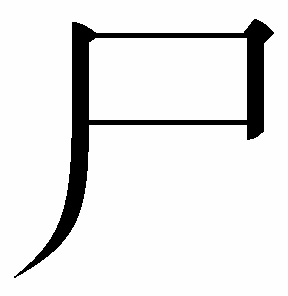 shī = corpse or dead body
shī = corpse or dead body
above
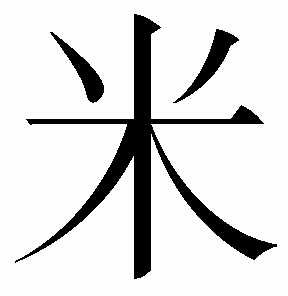 mǐ = rice
mǐ = rice
=
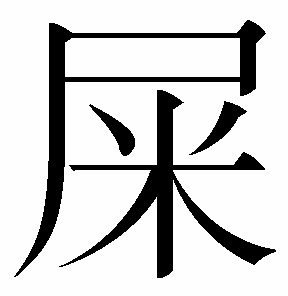 shǐ
= excrement shǐ
= excrement
Excrement is the
"corpse" of rice or rice after it has been eaten becomes
excrement. I imagine a zombie on a toilet eating rice to
remember this.
|
Comment
on this Post
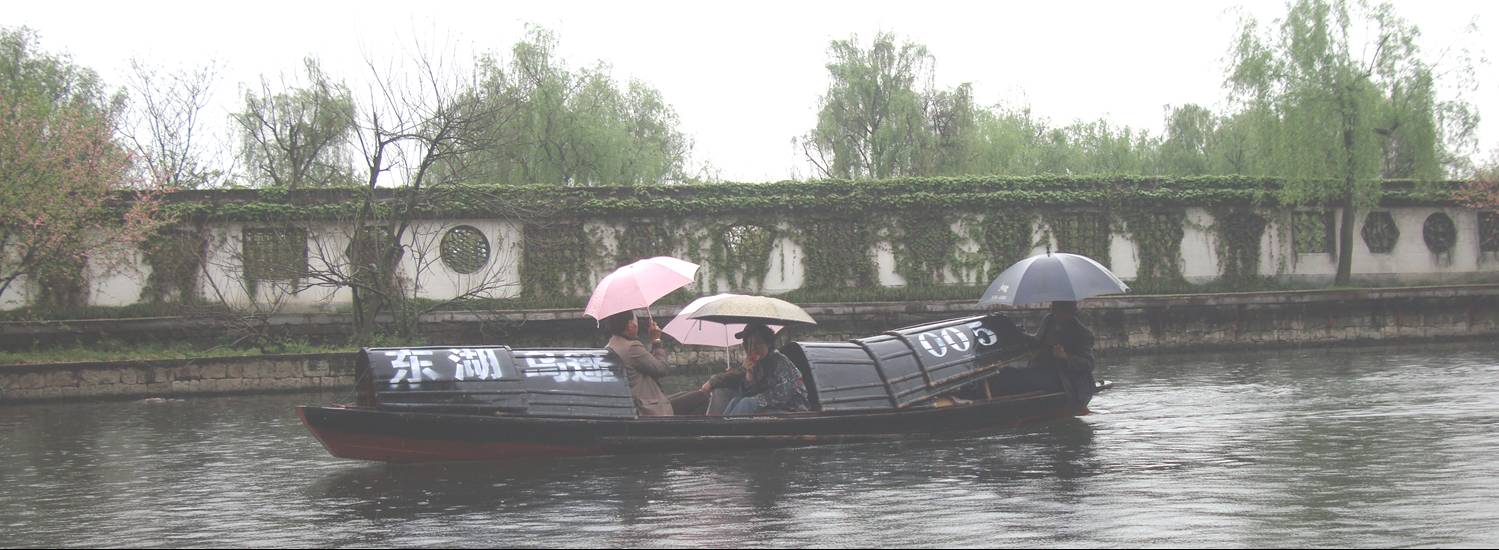
Chinese Word of the
Day: 旅游
(lǚ yóu literally "travel" + "swim/float") = tour
April 29, 2011
Good Grief
My last post, way back on April 04,
I said I wasn't going to update for a while because the site needs to be
completely reorganized. How's that going? Not at all.
Life gets in the way, and there's been too much going on. I
haven't even started the reorganization. Admittedly I have excuses
- I want switch from using the no longer supported Microsoft FrontPage
to using Adobe Dreamweaver, and that requires installation and a
learning curve. My Australian friend, Marion, delivered two
beautiful cognac coloured kangaroo skins, so I've started on my second
bullwhip. Class prep and teaching does take some attention, and
deserves more. Life is full.
So this is an interim post. It will be a while
before I get around to another one. If you are a regular reader,
please don't desert the site completely. Wander the archives.
I'll be back soon.
Another Fabulous Tour

黄酒[黃-] huángjiǔ or yellow wine ranges from very dry to quite sweet.
Sweet is better, and the locals prefer medium.
Once again, the school has treated
us to a wonderful weekend. This one was fairly wine soaked, since
it started with a tour of the Shaoxing 黄酒 (huángjiǔ = yellow wine)
museum where I, the only obvious enthusiast in the group, was given a
large jug of wine.
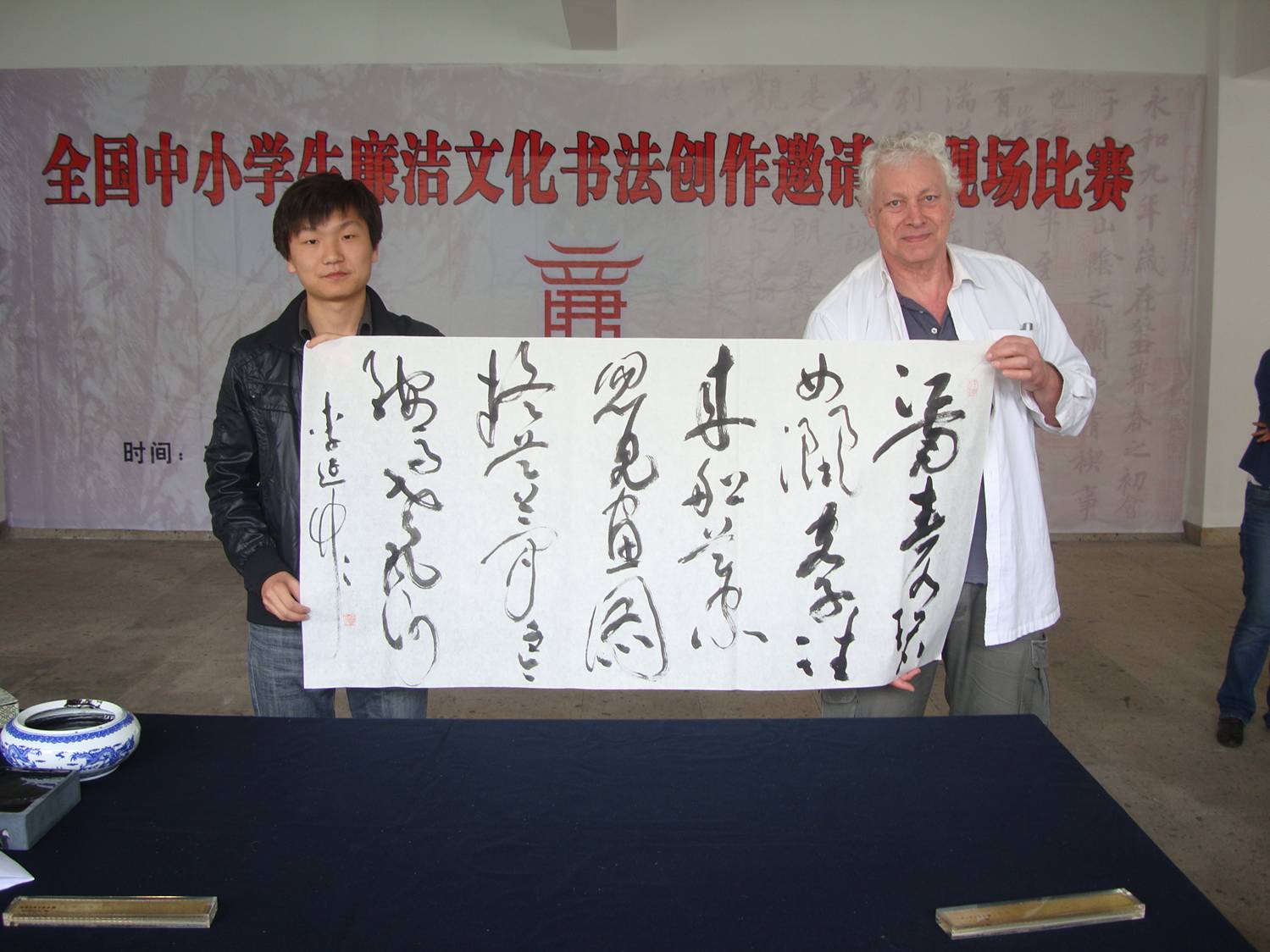
Enrollment in the calligraphy college is extremely limited, with only
forty admitted out of thousands of applicants.
Ruth and I were also presented
with this beautiful example of classic Chinese calligraphy, done as we
watched by a star pupil, a man the principal assures us will someday be
famous. Unfortunately we didn't catch his name.
From here on I'll have to let the pictures speak for
themselves, since I was very lax with my note taking.

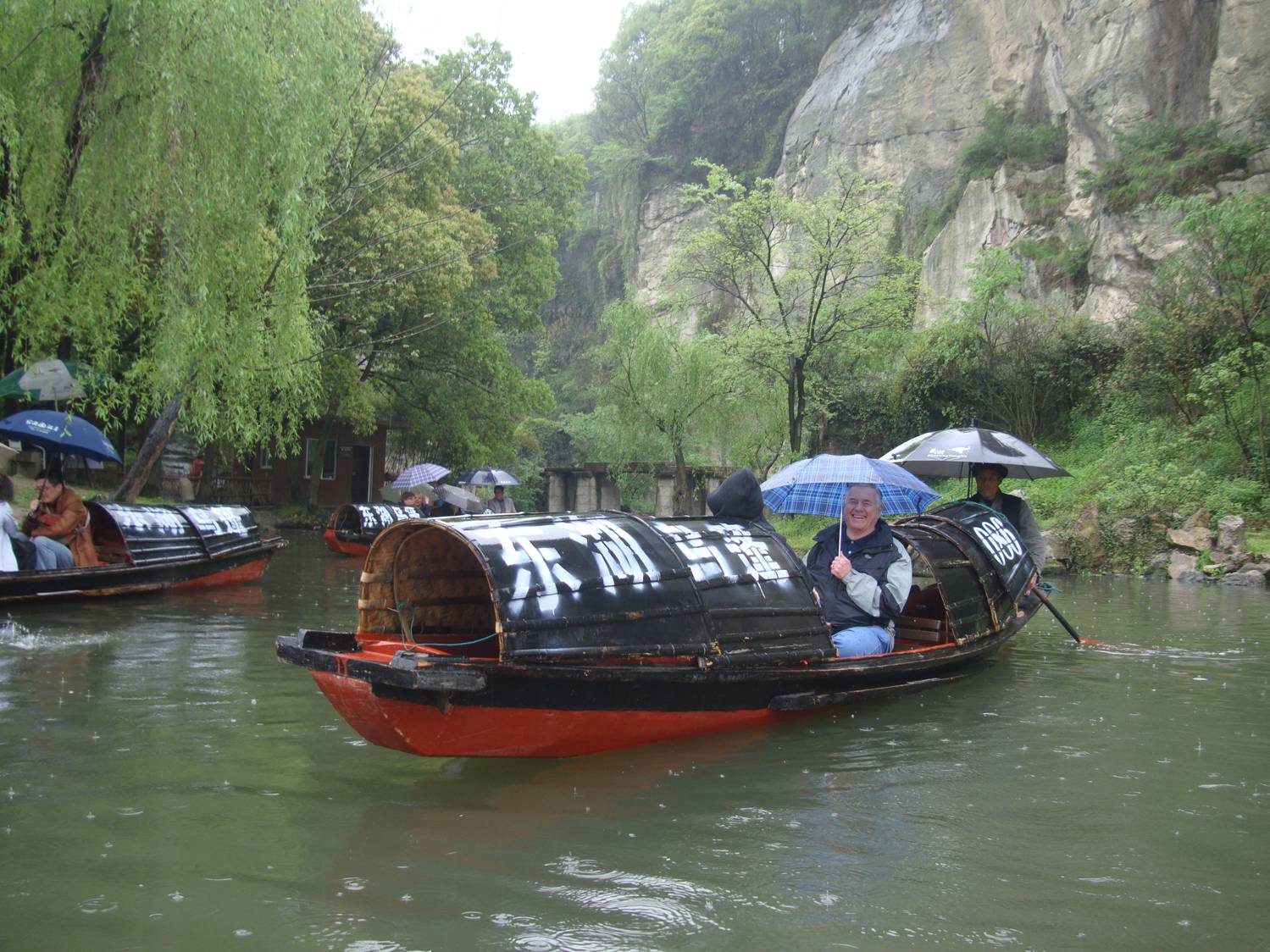

The
boatman is actually paddling with his feet. He only uses the
paddle in his hands to steer.
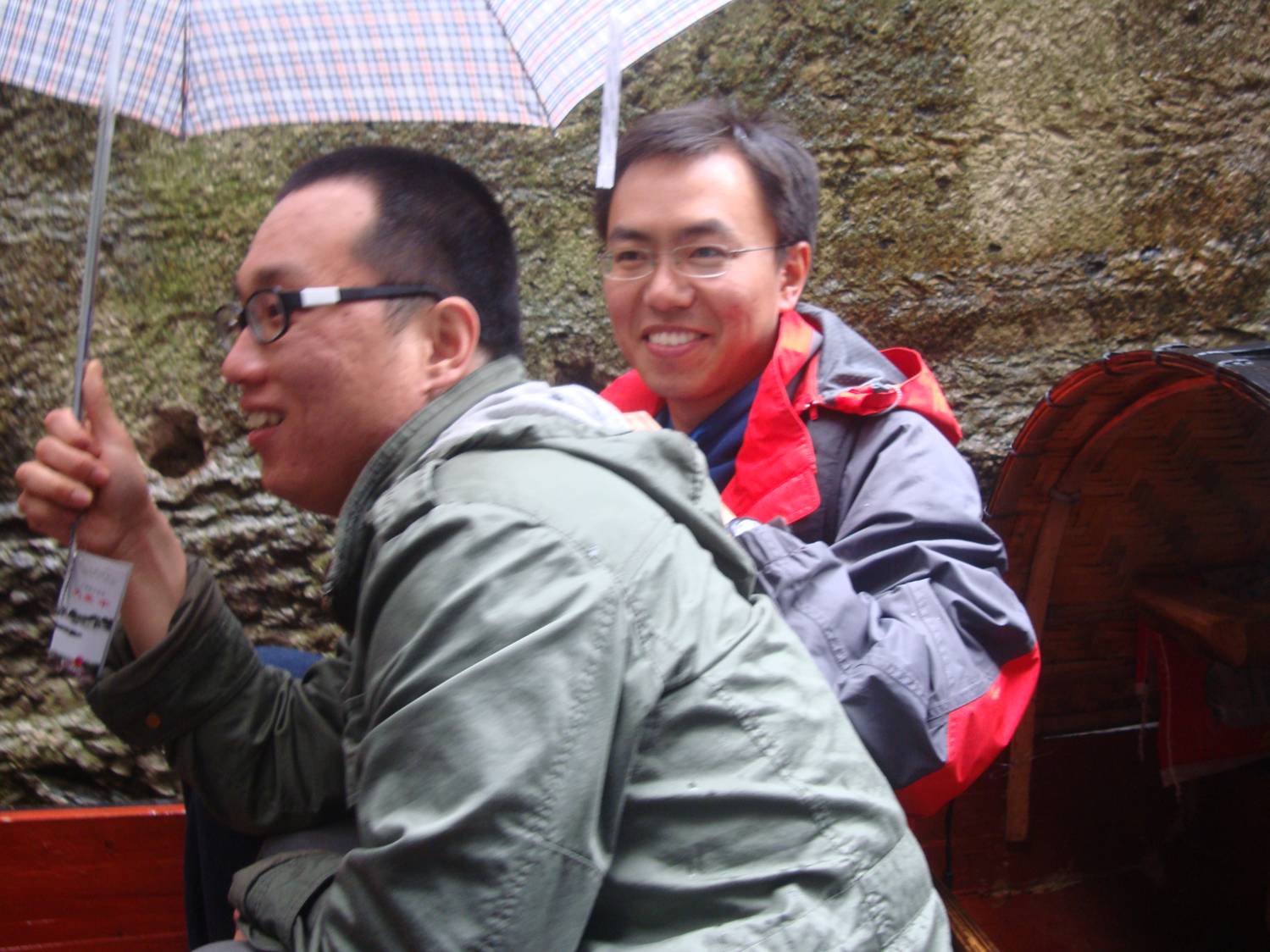



The
Chinese are a very romantic people. They love a tragic love story.
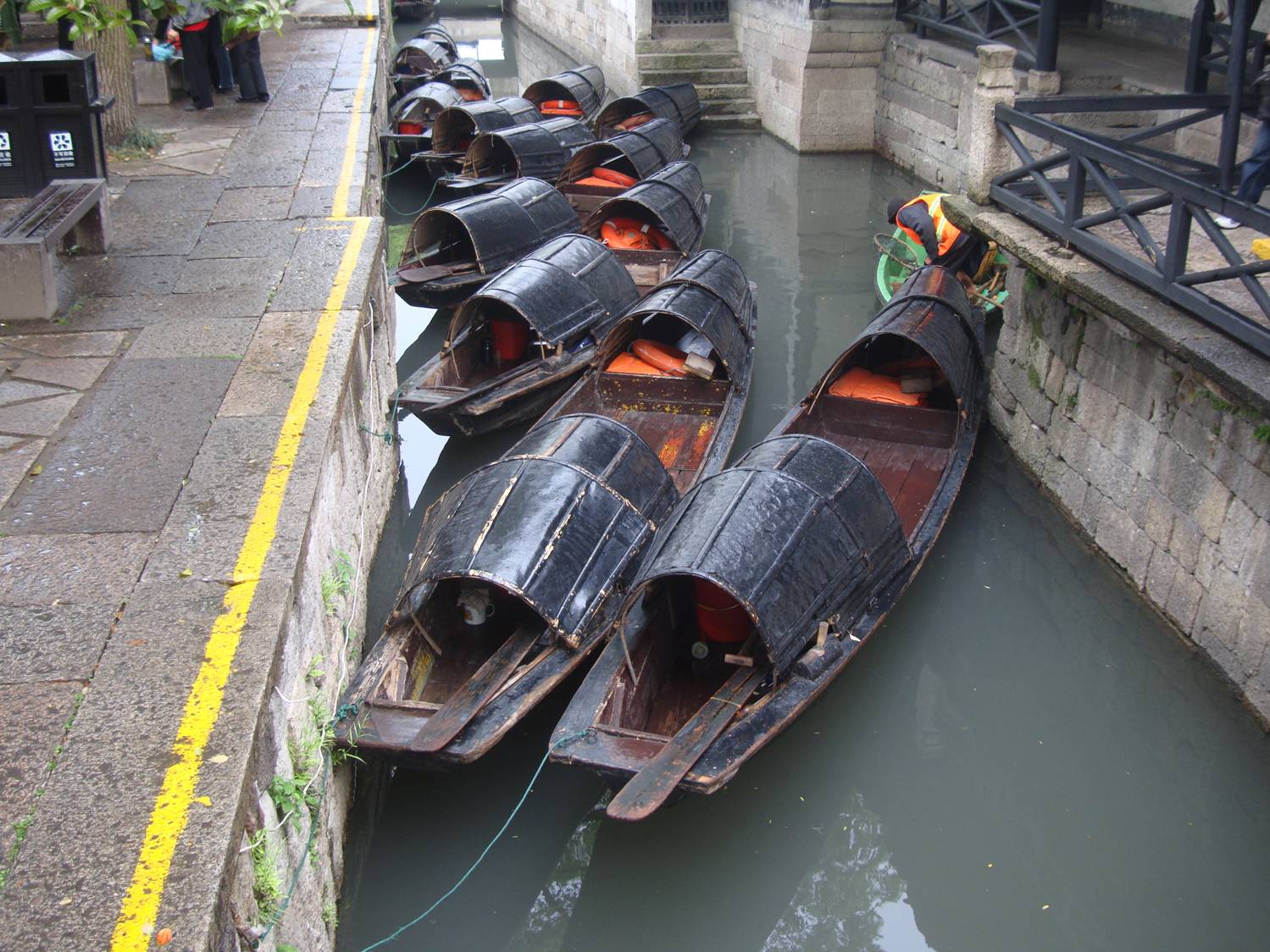

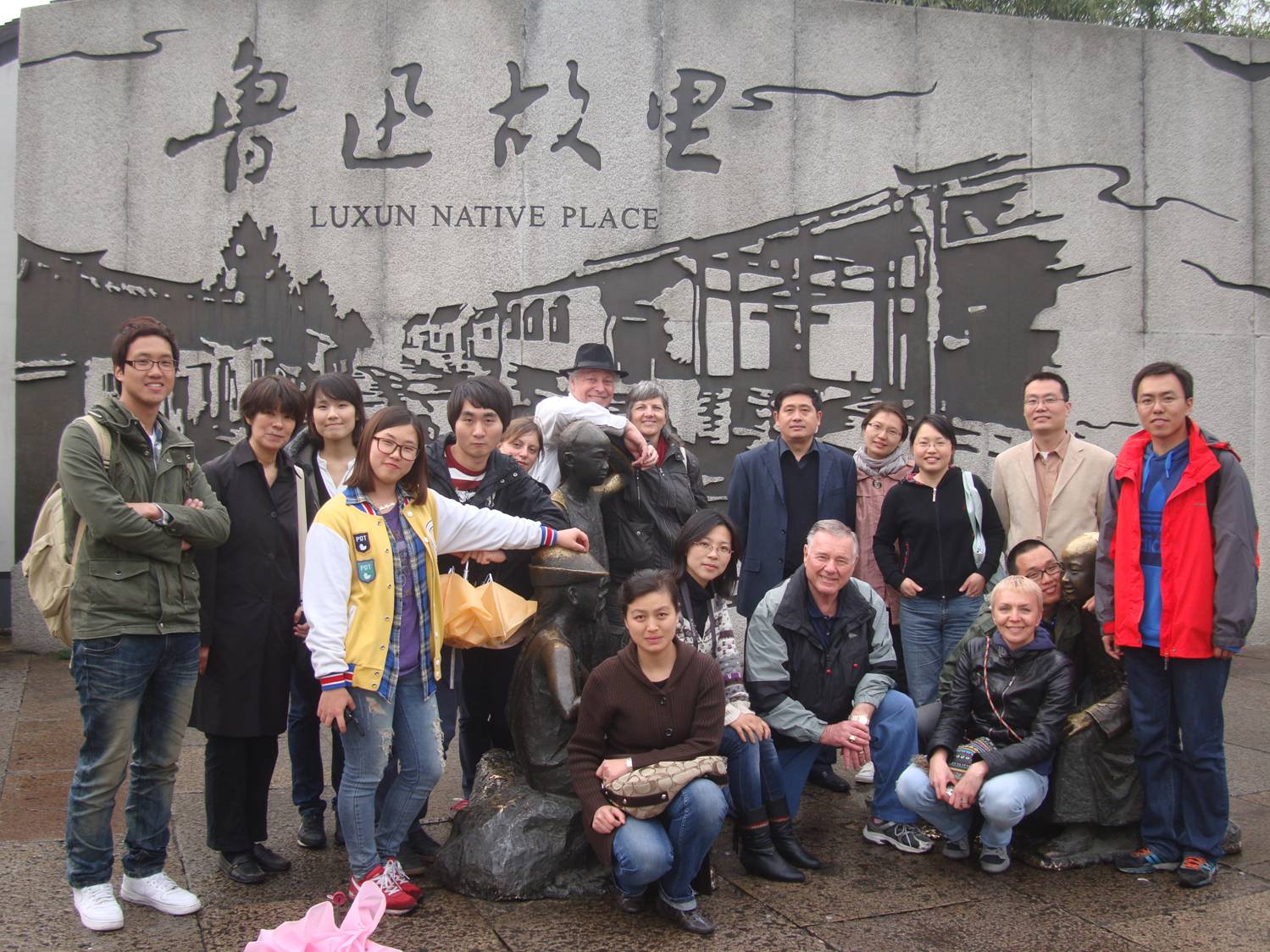
Another wonderful weekend. Once again we thank our administration
for taking such good care of us here.
This is the best job in the world.
This Term it's been Presentations
I've changed my style for Oral
English classes this term. I decided it's time to challenge the
students, and stop talking so much myself. So each class we've had
a group of four students use the first period to make a presentation.
Some of these have been, frankly, uninspired. But then some of
them have been very interesting indeed. Topics have ranged from
popular TV shows (not a subject I think worthy of university students)
to presentations about Chinese pirates, Thailand's "ladygirls", and the
treatment of LGBT in Iran. Wonderful to see what the students will
do when challenged.

Presentation by the group calling themselves Stone Age on the subject of
prehistoric man.
Worth the price of admission just for the art work on the board.
Comment
on this Post
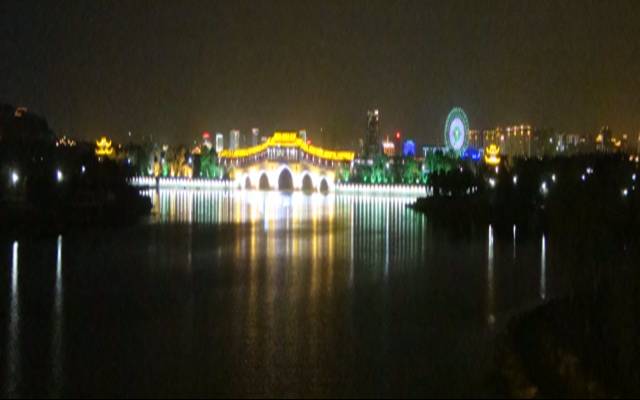
Chinese Word of the
Day: 笑话
(xiào hua) n. joke
April 04, 2011
April Fools Day Missed
I had a good April Fools day post
almost completely written and ready to publish, but then I was too busy
to upload it. Sigh. Maybe next year, but this one was timely
and won't work next year. All about the formation of a new
political party in Canada, the CCP or Chinese Canadian Party, a party
formed by Canadians of Chinese descent to attract Asian voters for the
coming election. Oh well, it probably wasn't all that funny
anyway. It's almost impossible to top my
April Fools post of
2008, announcing the merging of China and Canada to form the
largest and most powerful country in the world: Chinada.
That one even had students texting each other with the exciting news.

Meeting With Giant
Bicycle for the
Helmet Campaign
After literally months of phone
calls and letters on my behalf by my fellow conspirator, Panda, we
finally got into a meeting with the Giant Bicycle Company executives.
The result was exactly as I expected - we were not talking to a
managerial level that can make a decision. We were received
politely. I'm assured that the concept will be discussed with
those who can make a decision. It was as much as I could expect,
and it's a start.
We are a long way from running out of people to talk to in China about
this idea. Stay tuned.
Speaking of Staying
Tuned
My first post on The Man in China
was made on
April 24, 2007,
almost exactly four years ago. After this many frequent
updates, it's time to get organized so that people can find some of the
stuff that has value a little more easily. Read: so that I can
find the stuff I want to see again more easily. My wonderful wife, the
former computer programmer, has just learned to use DreamWeaver,
finished a great
reworking of her own site, The Woman in China,
and wants to help. Sounds like an opportunity not to be missed.
Also, we are very excited about the learning tool we are developing,
based on the map game you can find if you scroll down this page a bit.
The upshot is that we're very busy. I don't expect to update this
site again for a while, unless something very exciting happens, like we
get the learning tool finished and I can post it. But the pause
should be worth it. Please check back and see what the new site
looks like. Maybe in a couple of weeks. Or wander through
this site as it is. Get off the home page and into the archives.
Everything on this site should be active until we roll out the shiny new
and revised version. See you in a couple of weeks, I hope.
Comment
on this Post

Chinese Word of the
Day: 约会
(yuēhui) n. appointment, engagement, date
March 31, 2011 Progress
at Last on the
Helmet Campaign
After months of phone calls and
letters, mostly made by my incredibly persistent young friend, Panda, I
finally have an appointment to talk to the people at Giant Bicycle about
my helmet campaign. We should be in Kun Shan tomorrow early in the
afternoon, and hopefully I'll be able to pitch the whole concept to a
guy who may be able to feed it into the system. Giant Bicycles is
one of the largest bike companies in China. They also make and
sell bicycle helmets. So this seems like a natural fit as sponsors
of the helmet campaign.

One of the early supporters of my bike helmet campaign. Maybe now
we're getting someplace.
I've put together a PowerPoint
presentation I can show on my iPad, and I have our
little public service spot I can
run on the little laptop. So hopefully I'm well prepared.
Panda will come along as an interpreter. She's been incredibly
supportive of this effort, and I owe her a lot. I'll let you know
what comes of the meeting.
Are helmets a good idea? If
you want my answer, click on this link.
Warning: click on the link and you will see a graphic image that
is probably not work safe and may cause the more squeamish among you to
lose your breakfast.
Click here to see why helmets are a good idea.
Comment
on this Post
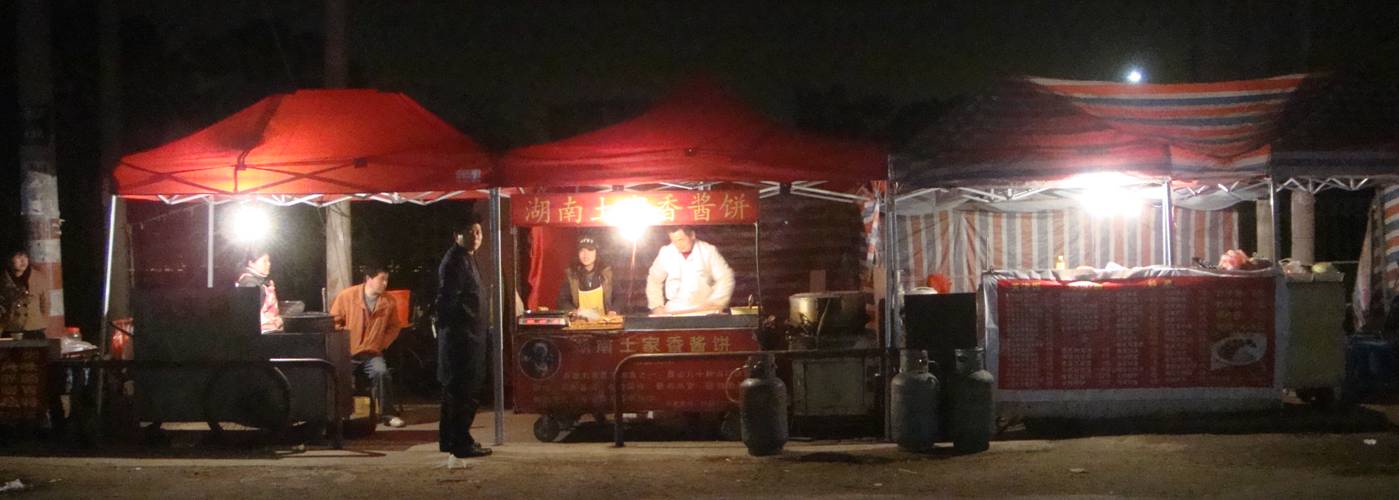
Chinese Word of the
Day: 持续
(chí xù) = persist
March 19, 2011 Feedback
on the Map Game, a Plea for Mastery
This is going to be a short post
with no pictures, because I'm really busy. But I did want to say
that I've been getting feedback on the map game in my last post.
Some have told me they tried it, and couldn't get many countries right.
When I asked, they admitted that they only tried it once. ONCE IS
NOT THE POINT. This isn't a test. It's a learning tool.
Everybody who does the game for twenty minutes gets 100% of the
countries right. Last night I ran my young student friend, Hilary,
through the game and made sure she kept re-starting it. After a
few runs through it, she was hooked. Then she wanted to get all
countries correctly placed. That took her about twenty minutes,
and I could see the satisfaction she got from the exercise. So if
you are tempted to do the game just once, just to prove to yourself how
ignorant you are, please don't. Twenty minutes later you can know
where every country is located, and that will feel good. Refresh
the page and restart the map.
This game makes us demand mastery
of ourselves. That's different from what our school system asks of
us. School tests let us pass with a large percentage incorrect.
Why? Think about the written test for a drivers license. In
China, a score of 90 out of 100 will let you have a license. What?
What if one of the questions you got wrong was: Do you need to stop at a
red traffic light? You could say no to that and still drive away,
a menace on the roads. Do you want to see a doctor who got 95% on
his final exam? Technology like this learning game can give us
mastery, and mastery is important.
One of the things I'm busy with is
trying to adapt this map game to learning vocabulary in English and
Chinese. I'm very excited by this idea. Stay tuned.
Comment
on this Post
Chinese Word of the
Day: 技术
(jì shù) n. technology, skill, technique
March 14, 2011
Educational Technology
This is wonderful. When this
map game landed in my inbox from Ruth's mom, I had only the vaguest of
ideas where all these countries of North Africa,
the Middle East and Eastern Europe
are located. Sure I had a rough idea
they were clustered around the Mediterranean, and that the Suez Canal is
in Egypt. But for the rest of them I didn't have a clue.
Twenty minutes later I could place every country without making a
mistake. My guess is, you can do the same.

Just click on the map to go the the
website, or
click on this link.
Then start dragging and dropping the names onto the map.
I'm afraid most people will think of this as a test of
their knowledge. It isn't. It's a very efficient way to
learn. So don't do it just once and then quit. If you are anything like me, your first few attempts
will be mainly trial and error. And that's okay. There's no
pain in making a mistake with this game. In fact, making a mistake
and then finding out the correct position is how you learn so quickly.
And that's what you will do if you try this. You will learn
quickly where all of these countries are. What a fantastic
learning tool.
I don't know how you are going to
feel when you can place all these countries, but I was totally thrilled.
Imagine, making this kind of learning fun. Imagine,
making learning into a game.
太棒了。
Think about what this kind of
technology can mean to teachers - freedom from presenting material that
needs to be memorized, allowing a teacher to concentrate on inspiring
the students and monitoring progress.

Panda
and Kobe do the map. Twenty minutes and
they had all countries memorized.
There's a lot of this kind of
thing in the pipeline, and I'm
going to see if it could be adapted for
language learning, to help a student develop a vocabulary. More on
that soon.
Comment
on this Post
The Future of Education
- the Global School
The other night we watched a TED
talk by Salman Khan in which he talked about his
Khan
Academy. This is another fantastic learning
resource. The website supplies a free online collection of over
2,200 micro lectures via video tutorials, stored on YouTube, teaching
mathematics, history, finance, physics, chemistry, biology, astronomy,
and economics. Each and every video was created by Salman Khan
himself. He has a knack for explaining technical subjects very
simply, in clear and easy to follow steps.
|
"The Khan Academy also provides a
web-based exercise system that generates problems for students based on
skill level and performance. Khan believes his academy points to an
opportunity to overhaul the traditional classroom by using software to
create tests, grade assignments, highlight the challenges of certain
students, and encourage those doing well to help struggling classmates.
His low-tech, conversational
tutorials -- Khan's face never appears, and viewers see only his
unadorned step-by-step doodles and diagrams on an electronic blackboard
-- are more than merely another example of viral media distributed at
negligible cost to the world. Khan Academy holds the promise of a
virtual school: an educational transformation that de-emphasizes
classrooms, campus and administrative infrastructure, and even
brand-name instructors." -
Wikipedia
|
Since TED lectures don't seem to
be blocked in China, so far,
you can
watch Salman Khan present his academy
concept online.
I highly recommend watching this inspirational talk. But since his
videos are hosted on Youtube, they are not accessible in China, and
neither is the Khan Academy's website home page. I have no idea why.
The children of China would really benefit from this
stuff.
Comment
on this Post
Presentations Continue
This week my oral English students
continue to do presentations during their first period.
Our presentation on Friday morning was on an unexpected subject -
chastity. I say unexpected, because my students are generally very
shy and unwilling to discuss anything to do with sex.

After the
presentation, the class voted on whether it is important to remain
chaste until marriage. I think attitudes have changed in China in the
the last few generations.*

I only wish their school sex
education was keeping up with the change. The Chinese are very
pragmatic people. Maybe sex education in schools is coming soon.
*This
is, after all, a country where a professor
from Nanjing has been jailed for three
and a half years for organizing sex parties. Sometimes the
thinking of officials in China is hard for a foreigner to understand.
That professor admitted the facts but argued that since all participants
were adults, no crime was committed. The chief judge disagreed, stating
that
"group licentiousness infringed public order."
Interesting.
Comment
on this Post
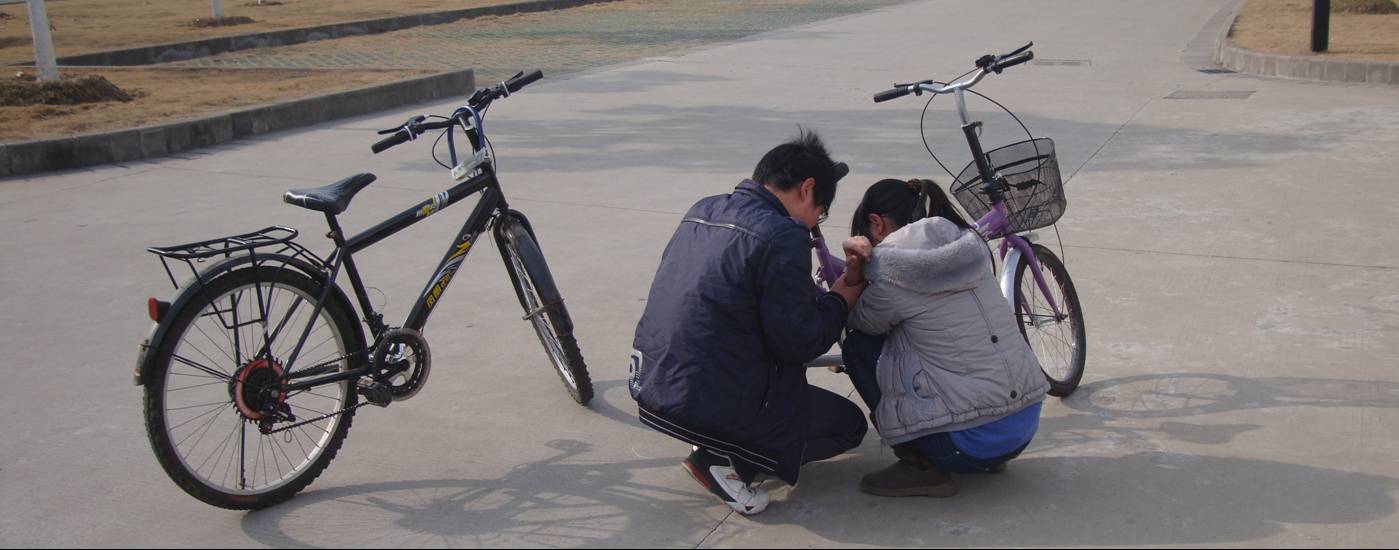
Chinese Word of the
Day: 割包皮
(gē bāopí literally "cut" + "wrap" + "skin") = v.o. circumcise
March 09, 2011
Adventures in Teaching - current social issues
I'm trying to engage my students
more in discussion. They will chatter away in Chinese, but getting
an animated conversation in English is not easy. One
self-criticism I've had of my teaching has been that I talk too much in
my oral English class, and my students don't practice talking enough.
I try to balance this by saying things that are interesting and
provocative, but that's not good enough. So this term I've taken a
new approach. Each class has two forty-five minute periods.
I've split my classes into teams of four or five students, and each
class from now on one of the teams will do a presentation for the whole
first period.

Our discussion
inspired this impromptu presentation about Chinese fortune tellers and
the way they name babies in China. Very good stuff.
I'm doing my best to just sit back and
listen, take notes, and offer suggestions in the second period.
This has been the first week of this new regime, and so far it's working
well, though we haven't had any real barn burners of presentation.
At least the students are talking.
So far this week we've had a presentations
on the pyramids of Egypt, astrological signs of the Western zodiac, the
difficulty of getting train tickets during Spring break, and primitive tribes.

The
name of the class is Burning Tongue. The presentation group is
Shero. Their presentation was on primitive tribes. This is
the audience assessment of whether the presentation was understandable.
Generous crowd.
The second
period is to be spent evaluating the presentation, and discussing the
points it brought up. I find that the students are very generous
in their assessment of presentations, and even presentations that were
nearly incomprehensible to me got relatively high marks from the rest of
the class.
Each presentation is also supposed to include a
discussion point for the second period, but I've taken the second period
back this week to get the students discussing recent events. I'm trying to get my students
interested in things that are happening in the outside world. I've
already talked to them about the Gates Foundation's well financed
campaign to promote
circumcision in Africa. This past week there's been a
flap in San Francisco
because a group there is trying to get a law passed that would make
circumcision illegal. Needless
to say, the Jewish community is up in arms, even making alliances with
the Muslim community in preparation for a fight against any
restrictions. Right now in America the ONLY surgery you can do on an infant
without a good medical reason is male
circumcision. So much as a pin prick on a girl's genitals will
send the perpetrator to jail. The male foreskin is the only
exception to the law that protects infants from mutilation by their
parents.
Circumcision is not practiced in China, and my students
don't know anything about it. It's not a comfortable subject for
them. They've had no sex education, and most are painfully shy and
reluctant to hear about sexual subjects. I'm sure I'm pushing them
out of their comfort zone, and I hope that's a good thing.

My students were fairly accepting
of male circumcision, as you can see from the vote above. They had
never heard of FGM, and had no idea that it was done anywhere, or what
is involved. I think they call this a teachable moment.
Since my class is mostly girls, they were shocked to hear the details of
FGM. Needless to say, the vote was unanimous on that issue.
残害
(cán hài
literally "injure" + "harmful") v. cruelly injure or kill; mutilate
Comment
on this Post
Kacper (pronounced Casper) Visits from Canada
We met Kacper in a ferry lineup
last summer, and I gave him this site URL and my email address. He
decided to join us here for a few days. We always enjoy visitors.
It was really fun showing Kacper our part of China, especially this
beautiful campus, the local restaurants and the nearby village.


Kacper is now off to explore other
cities in China, but we're friends for life. I hope he keeps in
touch.
Comment
on this Post

Chinese Word of the
Day: 报纸
(bào zhǐ literally "report paper") n. newspaper
March 04, 2011 Our
Amazing World of Connectivity
I subscribe online to the
Washington Post and the New York Times. Both send me email
notification when they have stories or opinion pieces, and often those
opinion pieces have to do with China. One of the more recent ones
carried the headline:
Why China Is Nervous About the Arab Uprisings
It's an interesting article, but even more interesting
were the comments under the article. Along with the usual China
bashing, there were some very interesting thoughts from Americans who
actually seem to understand modern China and its position in the world,
and how essential it is to the welfare of western countries and western
economies.. What REALLY got me excited was the realization that
many of the comments were coming directly from China.
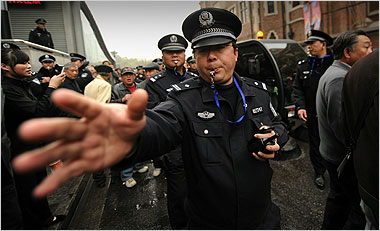
- Peter Parks/Agence France-Presse -- Getty Images
These direct from China comments
included the usual party line flag waving, like these:
|
SCUI
Beijing, CN
March 1st, 2011 3:37 pm
Long live the Chinese People! Long live the Chinese Communist Party!
Chen Shui-bian
Taipei, Republic of China
March 1st, 2011 2:08 pm
Some Westerners, 'Taiwan' separatists, and oh, yes, of course, the Dalai
Lama and his ilk would give their eye teeth to see China disintegrate
like the Soviet Union. Dream on!
Lady Gagas Biggest Fan
Mars
March 1st, 2011 4:15 pm
Yeah. Instigate all you want. For a populist/democratic movement, you
need PEOPLE. Nobody in China wants a revolution.
This whole thing is a perfect example of how the West projects its own
distorted visions onto the Chinese people.
|
But the point is, this was in a
major American newspaper, being read by people all over the world, and
these particular comments came directly from China. There were any
number of thoughtful and intelligent comments from both sides of the big
pond. Here are a few of them:
|
helen
CD, China
March 1st, 2011 12:47 pm
Instead of covering mass protests elsewhere in the world like in
India and on its own soil, the U.S. media tend to fabricate
protests that have slim chance to happen in China. The hypocrisy
stinks. People in China cherish their hard-earned peace and
prosperity and hate those (including the redneck Jon Meade
Huntsman, Jr., and the Fa Lun Gong followers) intend to stir chaos
in China
Aron Lee
Shanghai,China
March 1st, 2011 11:04 pm
In China, most people are busy doing daily work necessary for the
betterment of life. Most of the time, they just concentrate their
full energy on their lives and won't try to protest out of their
dissatisfaction about the system unless they have no choice.
However, they don't think that time has come. For the workers,
they have to focus on their work, and students have to focus on
their study. Everyone is just too busy to go to a square to
protest under the threat of ruining one's career. And someone who
is really disappointed with the present government always remain
scattered and disunited so that they will never form a real impact
to introduce a drastic reform towards a Western-styled political
system.
As for the Jasmine Revolution in China, it's just an illusory
concept in the present China. This concept is almost completely
unknown to most of the people. Only those few capable of
circumventing the Fire Wall have the chance to be informed.
However, it's also unrealistic to launch a Middle-East styled
protest on these ones.
Before the transformation to a more democratic society of China, a
revolution or enlightenment of thought will be desperately needed.
The ideas of democracy, liberty, equality are almost insulated
from the people. This has prevented the people from forming a true
force to adopt the social change
Without healthy organizations and full progress in the mind of the
people, true democracy will never come to China.
A. Smith
DC
March 2nd, 2011 1:12 am
One thing China has that we don't: Leaders that actually know what
they're doing.
Their leadership are from backgrounds of economics, engineering,
chemistry etc. Our political leaders are just bunch of liberal
arts majors.
kc
new england
March 2nd, 2011 3:15 am
"would give their eye teeth to see China disintegrate"
This is false. No one in their right mind wishes ill to China.
What this article points up is government control of
communication. Here, this effort is headed by Governors
engaging in union busting. In China it is official policy.
Americans need to be aware. The crackdown in China is normal and
logical in a totalitarian governmental design. Here, it is normal
when the wealthy have the opportunity to buy Governors. |
I've selected just a few of the
many comments from beneath this article. I hope my students will
go and read them all.
Think about this. For the
first time in the history of the world, people in China can find out
instantly what is being said about them in major American newspapers,
and FOR THE FIRST TIME EVER they can talk back. Is this not
amazing and wonderful?
I've told my students how easy it
is to subscribe to the New York Times or the Washington Post. Just
click on these links:
New York Times
or
Washington Post
and sign up. Then, just as I do, my students can get a
notification of any opinion pieces. They can drop in on articles that
mention China and let their own opinion be heard in America.
Instantly. How cool.
Students, if you think China is
misunderstood or misrepresented in America, make your voice heard there.
You have the technology to speak directly to the American people.
Use it.
Comment
on this Post
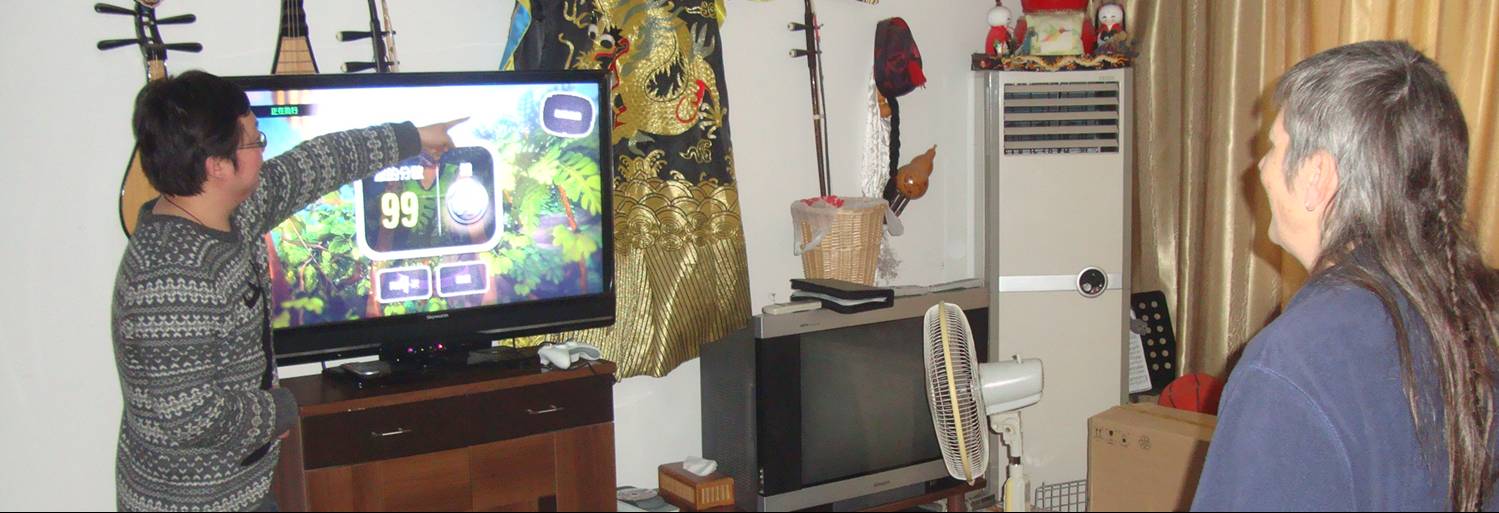
Chinese Word of the
Day: 锻炼
(duàn liàn) v. engage in physical exercise
February 28, 2011
Unscientific Good Advice
I say this advice is unscientific
because I have read no studies on this issue with control groups and
scientific rigor. But the conclusion seems obvious to me.
There is a direct relationship between a good complexion and exercise.
Just think about all those female tennis players and other women
athletes, the runners, swimmers, volley ball professionals. How
many of them have zits and pimples? They all have wonderful clear
complexions.


Women tennis stars. Hard to find a zit in the whole crowd.
Many of my students, more girls
than boys, have bad complexions. Some have terrible acne, and are very
embarrassed by their own faces. I don't want to be one of those
people who tell others that their misfortune is all their own fault, but
the link between too many hours spent in the library, or in the dorm
eating noodle packs, and a bad complexion seems too obvious to ignore.
The standard Western answer to this problem, or any problem, is a
product you can buy - Clearasil. Covers zits. Hides the
problem. Still looks terrible. The proper answer is healthy
living, particularly diet and exercise. Acne can have a number of
causes, ranging from stress to hormonal imbalance to bacterial
infections. Some can be helped with medication or antibiotics.
All are lessened, and often cured, by regular vigorous physical
exercise.
I think the obvious reason that girls have worse
complexions than boys is that the boys are more encouraged to be on the
basketball court, or playing football. The girls are actually
encouraged to be weak and unathletic. So here's the unscientific
advice for ALL my students. If you want to look your best and have
a clear, beautiful skin on your face, get out every morning and RUN.
Or if you hate running, find something that you do like to do that gets
your cardio vascular system working, makes you sweat, and clears your
pores. You may not see a difference in your complexion
immediately, but it will come. And you will see an immediate
difference in how you feel. So get out there and work up a sweat.
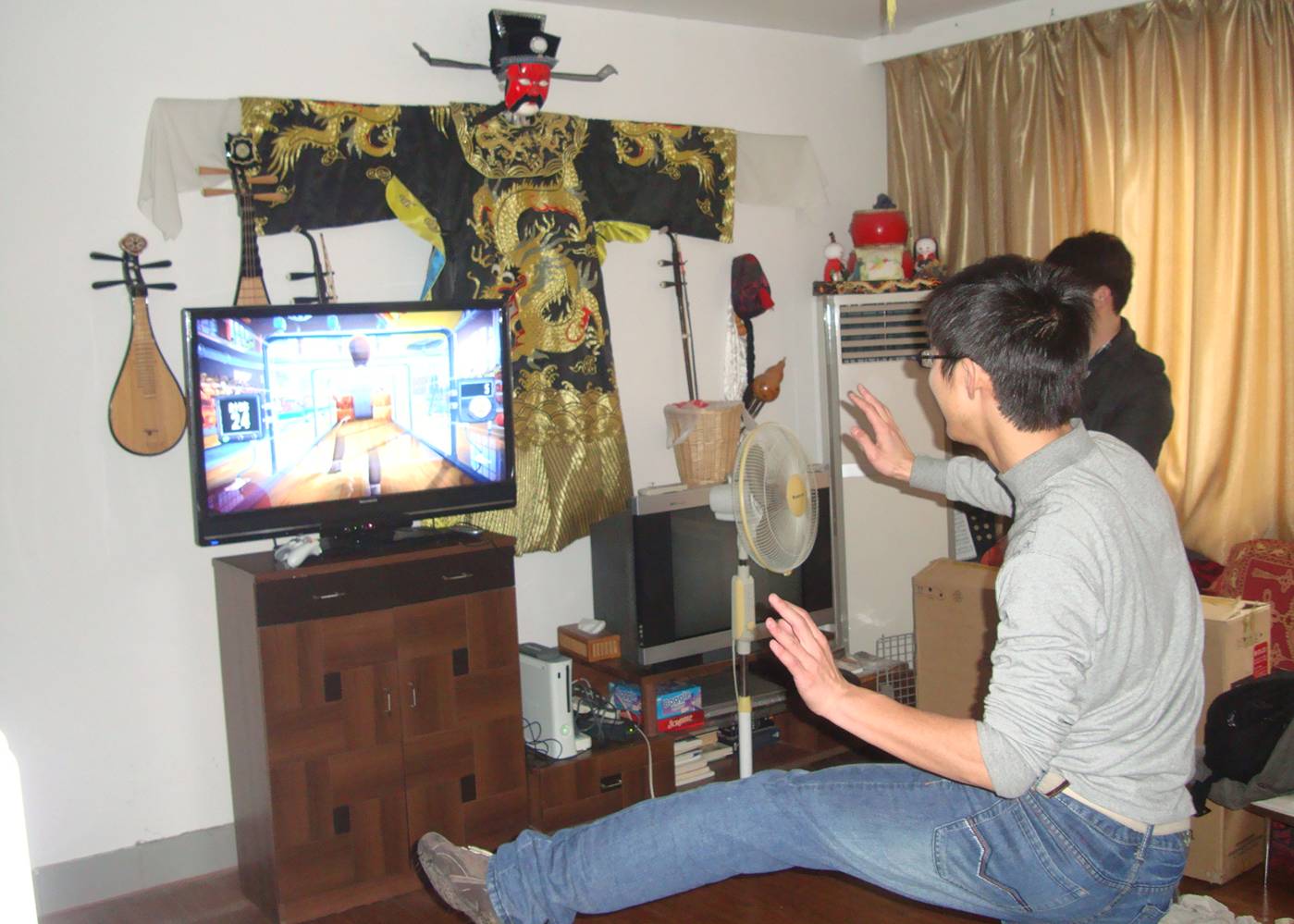
The best exercise is the kind you
don't notice doing because you're involved in something else.
Our favourite liaison officer, Jin
Bo, is an early adopter, geek and gadget freak. He's the reason we
own our iPads, because he demonstrated his with such enthusiasm.
Jin Bo's tiny apartment doesn't have enough room for his latest
acquisition, a Kinect game system, so for the moment it's in our living
room. Kinect is a camera and sound system that measures your body
and reads your position, so gestures can be used to control the images.
An avatar moves as you move. Now this is where exercise is going
to go through a revolution. The games available at the moment are
impressive, but nothing compared to what they could become once the
system gets some maturity. I found myself out of breath after a
couple of rounds of the virtual boxing match. My one short workout
with the exercise program left me with painful thighs for several days,
and I wasn't even aware of stressing my muscles. That tells me
that my daily use of the elliptical trainer, though great for the
complexion, cardio vascular system and mood, is leaving much of my
body unexercised. Things are once again about to get better.
That exercise program, by the way, is about as
unimaginative a use of the technology as anybody could possibly imagine.
It take the experience of going to a gym and following a trainer and
puts it into a virtual reality with all the boredom and pain of the real
thing. It's good. Don't get me wrong about that. But
it is only exercise. It isn't exciting or fun. I suppose it
was the logical place to start, but compared to what I imagine an
exercise program could be... well, it's just dull thinking.
Instead of working out in a gym, a person could be chased through a
jungle by spear throwing aliens, necessitating jumping over logs and
crawling under obstacles. I'm looking forward to the game that
puts me in a virtual army obstacle course, with a drill sergeant barking
orders at me. Or the game that sends me scrambling to escape from
a collapsing underground ancient deathtrap like the ending of "National
Treasure II". Or imagine being able to study Tai Chi on a mountain
top with a virtual master. Don't tell me we need boring in order
to set up goals and achievement levels. I have to keep in
mind that this technology is brand new, still in its infancy. It's
like watching the Wright brothers first flight at Kittyhawk and trying
to imagine a modern passenger jet on an international flight, with
hundreds of passengers watching a variety of movies and munching snacks.
The potential for making exercise fun and even exciting is incredible.
Microsoft has opened the code for Kinect to developers,
and we can expect to see a lot of different applications for this
technology. Already amazing improvements are in the works, things
like micro-expression recognition so that the avatar smiles or frowns
when you do, and photorealistic avatars that actually look and move as
you do. And there are other areas of potential yet to be explored.
I can imagine a virtual musical quartet where a student can take the
place of one of the players, playing along with the music just like it's
a real, but much more forgiving and accepting, group. Imagine
being able to play blue grass with
Lester Flatt and Earl Scruggs,
or take a spot on stage with
The
Beatles. It's coming, folks. What an exciting time to be
alive.
Comment
on this Post
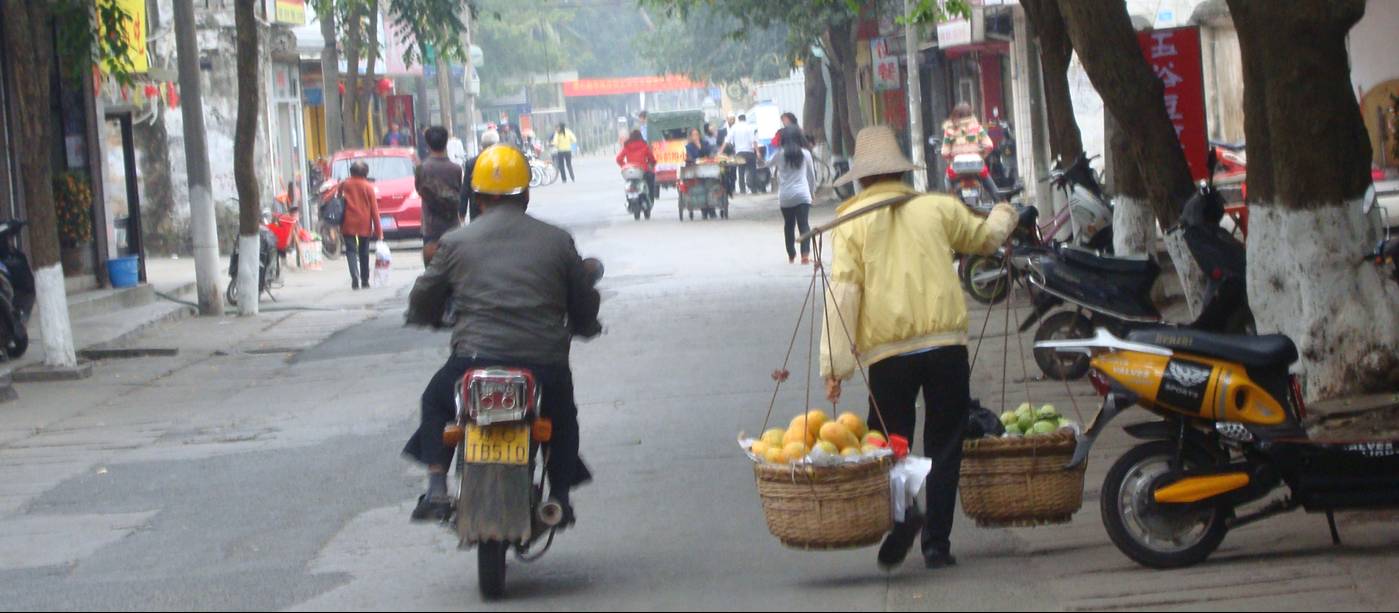
Chinese Word of the
Day: 关系
(guānxi) n. relation; relationship
February 22, 2011 New
Leaders on Tour
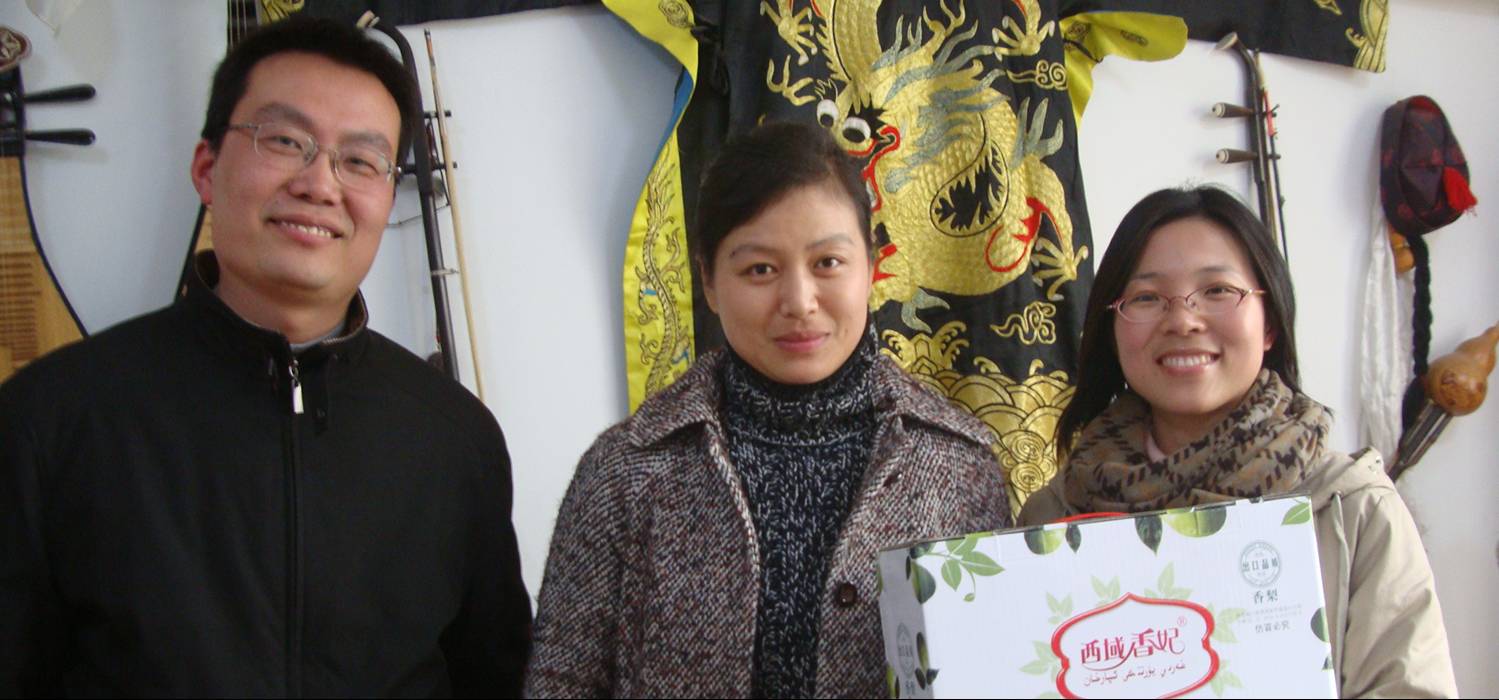
Our administration has had a
changing of the guard. Apparently the rule here is that no
director of a department can serve more than two, three year terms.
So it was time for Ms. Liu to have a lateral transfer.
We enjoyed our relationship with Ms. Liu tremendously,
and will miss her. But today our new Director, Zhong Fang (center)
and Deputy Director Yao Xin (Clark Yao, left) paid us a visit along with
one of our favourite office assistants, Shirley, bearing a gift of
delicious pears. We really appreciate the personal attention we
get from our administration here, and are looking forward to continuing
our wonderful relationship with this university.
Comment
on this Post
February 21, 2011 When Guanxi Bites
I don't know how many times I've
been told about guānxi (pronounced something like "gwan she") in China.
The Chinese generally accept it as a fact of life. Those with
guanxi are happy to have it and use it. Those without lament the
limitations their lack of guānxi will place on their future.
Nobody seems to think it could ever be stopped. It's just a part of
Chinese culture. It may be both China's greatest strength and
biggest unrecognized limitation.
When used as a noun, guānxi means "relationship".
But here it has another meaning - back door connections, the influential
family member, the close personal friend in authority. Somebody
who can quietly put you at the head of the line, or solve a problem with
the building inspector. Very often, guānxi is actually beneficial.
When it is beneficial, I think it's a great idea.
I have a young friend whose father was too short to be
a teacher. Yes, in China there is, or possibly was, a height
requirement for a male teacher. Her father, an excellent,
dedicated, career teacher, was not tall enough to meet the requirements.
But he had a doctor friend who could make "a mistake" in filling out the
physical report. So that's an example of how guānxi could be used
to circumvent a silly regulation and solve a problem. When it
works this way, I'm all in favour of guānxi. It can bring justice
and common sense where it is lacking and sorely needed.
But this week I was presented with an example of guānxi
in a more destructive and pernicious form. Before the term break,
one of my students applied to be part of a group that would be sent to
Canada to complete their undergraduate work. It was a stiff
competition. Only so many students would be accepted. She
called me just before the end of last term with her happy news. She had
made the grade. She would be accepted and go to Canada. I
was happy and excited for her too, because I had given her a rave letter
of support. She deserved it. She really is an outstanding
student. And then... Today when I asked her when she would leave
for Canada, she seemed embarrassed. She reluctantly told me that
she wouldn't be going. She didn't make the list. A "mistake" had
been made. She won't go to Canada after all.
Though she didn't say so, I think my student assumes
that she has been the victim of guānxi. Somebody had a connection.
Somebody had influence that could bounce her off the list and replace
her with a favored relative or relative of a friend. Maybe
somebody was repaying a favor. Maybe a recipient of past guānxi
had an obligation to pass it along. My young student friend
accepts this as just the way life is here in China. What can she
do? She could never prove it? So she is just moving on,
looking for the next opportunity. I'm not so accepting.
Being a foreigner, I'm probably more upset by this than she is.
And maybe I'm upset over nothing. Maybe the process was entirely
fair and above board, with no guānxi involved. I hope that's the
case. Who can say?
This dark side of guānxi has some very obvious results. It
could be that a Canadian university that wants the very best students is
not getting one of the very best because somebody of influence pulled
strings. Maybe this doesn't matter. Maybe the student who
used guānxi to bump an accepted choice is really very close to being as
good a choice. Maybe the decision to accept the first student was
subjective, and the student who used guānxi to bump her is even better.
This is possible. It seems unlikely to me. My guess is, the
Canadian university is not getting the top student. Worse than
this, China is not sending out its top student. If the student who
is sent turns out to be a pampered seat warmer, as is quite possible,
China loses one more bit of reputation. And finally, and maybe
most important, a very enthusiastic student is made slightly more
cynical and bitter. Her amazing energy is slightly diminished.
Her light burns just that little bit less brightly. Multiply this
by thousands of situations and variations, and this also is a loss for
China.
Whatever the situation with this particular case,
there's no doubt that guānxi is often abused. I don't know what could be
done to get rid of the bad guānxi in China, while keeping the good.
It's too much to hope that a sense of integrity and shame would prevent
its abuse in this manner. I know that many people here don't like
guānxi. Unfortunately, it seems to be the ones who don't have any
who dislike it the most. The ones who have it are delighted to use it.
When the most egregious examples come to light, as in the case of
Li Gang's son, a drunk driver who
killed a university student and seriously injured another, then shouted
defiantly that he was above the law because his father is a deputy
police chief, the authorities take action. Li Gang's son has been
sentenced to six years in jail. But one wonders whether he
is being punished more for his blatant and
stupid flaunting of his guānxi than for his crime. The
smaller, milder injustices that happen every day in China seem
impossible to stop.
We have guānxi in the West, of course. Lots of
it. We have the saying: it's not what you know, it's who you know.
Nepotism is a fact of life for us too, as is influence and abuse of
connections. But I think for us it's less accepted. Less taken as
a matter of course. I mentioned in my previous post about smokers
in China that I really don't like to sound critical of this country.
I'm a guest here. But there are aspects of Chinese culture that
strike a foreigner as... unfortunate. Acceptance and abuse of
guānxi is certainly one of them. I'm with the Chinese who paid
such close attention to the case of Li Gang's son. Suggesting that
one has, uses or needs, guānxi should not be a source of pride, but of
shame.
Comment
on this Post

Chinese Word of the
Day: 抽烟
(chōu yān) v. smoke cigarette (About the only think I don't like
about China. It's still a smoking country.)
February 17, 2011 Back
Home in Wuxi
We had a wonderful, quiet time in
Haikou, mostly spent in our comfortable hotel room studying Chinese.
My little laptop quit on me a week or so ago, and I haven't done any
updates as a result. But now I'm back. The mnemonics concept
turns out to be more difficult than I hoped. They are harder to
create when the characters become more complex, or the ideas more
abstract. But here's another
one, a really obvious one this time.
|
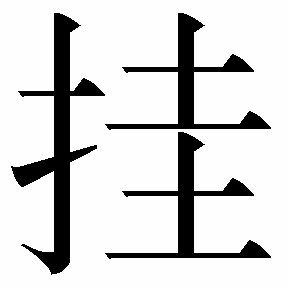
This is guà, which means
"hang" or
"put up". A sail hangs on a sailboat. Stars hang in the
heavens. Think of this as two clothesline poles on the right
side, one above the other. The radical on the left you'll
just have to remember.
It's "hand"
 shǒu. shǒu.
which distorts to
this
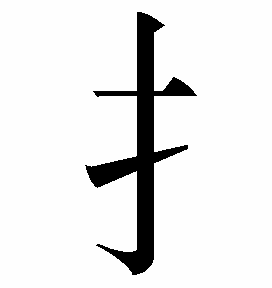 when
it becomes a radical. when
it becomes a radical.
So this is easy.
Two poles, with imaginary lines between them for hanging up
washing, which you must do with your hands. Now you
shou'nuff better gua'n down to the yard and hang up them clothes,
y'hear. (It's a stretch, I know.)
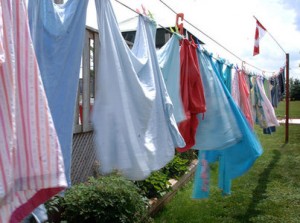
|
Comment
on this Post
Goodbye to Haikou
We had a very quiet holiday this
year. Besides the Chinese studies in our hotel room, our other
haunt was a nearby coffee shop which happened to have an unsecured
wireless connection, the only way to get online with our iPads.
Only problem with that one was the smokers. If you are a reformed
smoker, as I am, the smell of smoke is objectionable, to put it mildly.
Smokers have no idea how much they stink. By the time the air is turning
blue, I'm on the edge of panic attacks. I don't want to breathe
that stuff. At our university we are mostly insulated from
smokers. But our holiday was a taste of the Chinese reality.
They smoke like we did in Canada back in the fifties. They smoke
like chimneys.


At our
favourite restaurant near our hotel, we always tried to grab the table
beside the window. After dinner, whole tables of diners would
light up, oblivious to any others customers. They don't even think
about it.


In the
coffee shop, we managed to created a no smoking section when lots of
tables were empty and we could grab the two in an alcove beside the
windows. Even then, the windows had to be open and a walk to the
washroom was nasty.
When I first came to China, I was
determined to be polite and accept the culture as I found it.
Mostly I manage to do that, and I genuinely delight in the warmth and
friendliness of the Chinese people, their sense of fun and enjoyment of
life. But now, after six years here, I've started to ask for some
air. I can't avoid breathing.
I wrote an earlier version of this anti-smoking rant
before we left Haikou, but censored myself and didn't post it because I
don't like to say anything that sounds critical of China. The
thing is, Canada was just like this when I was in my teens. I
remember smoking in an elevator, and smoking under the No Smoking sign
in my university lecture hall, proud of my defiance of authority.
I remember sitting at meetings of the Canadian Director's Guild
executive, on which I served as the B.C. District Council President, and
we'd turn the air blue during our debates, without a second thought for
the poor secretary taking notes. My sister tells me I once blew
smoke in her face when she asked me not to smoke in her apartment.
It's hard for me to believe I was ever that much of a pig, but there you
have it. And there's nothing worse than a reformed sinner.
So take my rant with a grain of salt. If you're a smoker yourself,
you'll love China. Here you'll only be hassled by other crazy
foreigners.
We've only seen one occasion where a Chinese person
pointed out a No Smoking sign to a smoker. That was at the airport
in Haikou, and the smoker ignored him. (He did find it impossible
to ignore me when he started to walk into the elevator with his lit
cigarette.) I know China will change, just like Canada changed.
Already there is a
mild campaign to limit smoking,
and talk of banning smoking in restaurants in Beijing. This is one area
where I'd like to help them along. I think if China quit smoking
they'd cut their air pollution by half.
Comment
on this Post
We spent our last day in Haikou
walking the neighborhood before a farewell hotpot dinner with Xiao Hua,
Patrick, Feng Feng and a new friend, Bob from New York. I took the
night off from taking pictures and just enjoyed the company, but you've
all seen people eating in restaurants on this site before so no great
loss to this narrative. Here are a few pictures that may be of
more general interest.


The day we left Haikou
(this
morning, hard as that is for me to believe) is the lantern festival.
This man was wiring lanterns, and had his work cut out for him.
I'm sorry we couldn't stick around to see them all glowing tonight.

Forget
about street sweeping machines. In Haikou it's all done by hand,
by an army of workers, each with a home made and human powered broom and
cart. They gather here to deliver their night's work to the
garbage truck.

At
least the dumping of the carts is now automated. These people do
an incredible job of cleaning up after the nightly fireworks and
littering, which often leave the streets well decorated with paper and
plastics.

At the
start of our walk, Ruth checks the map on her iPad to get her bearings.
Great technology. Wonderful contrast to the environment we were
in.
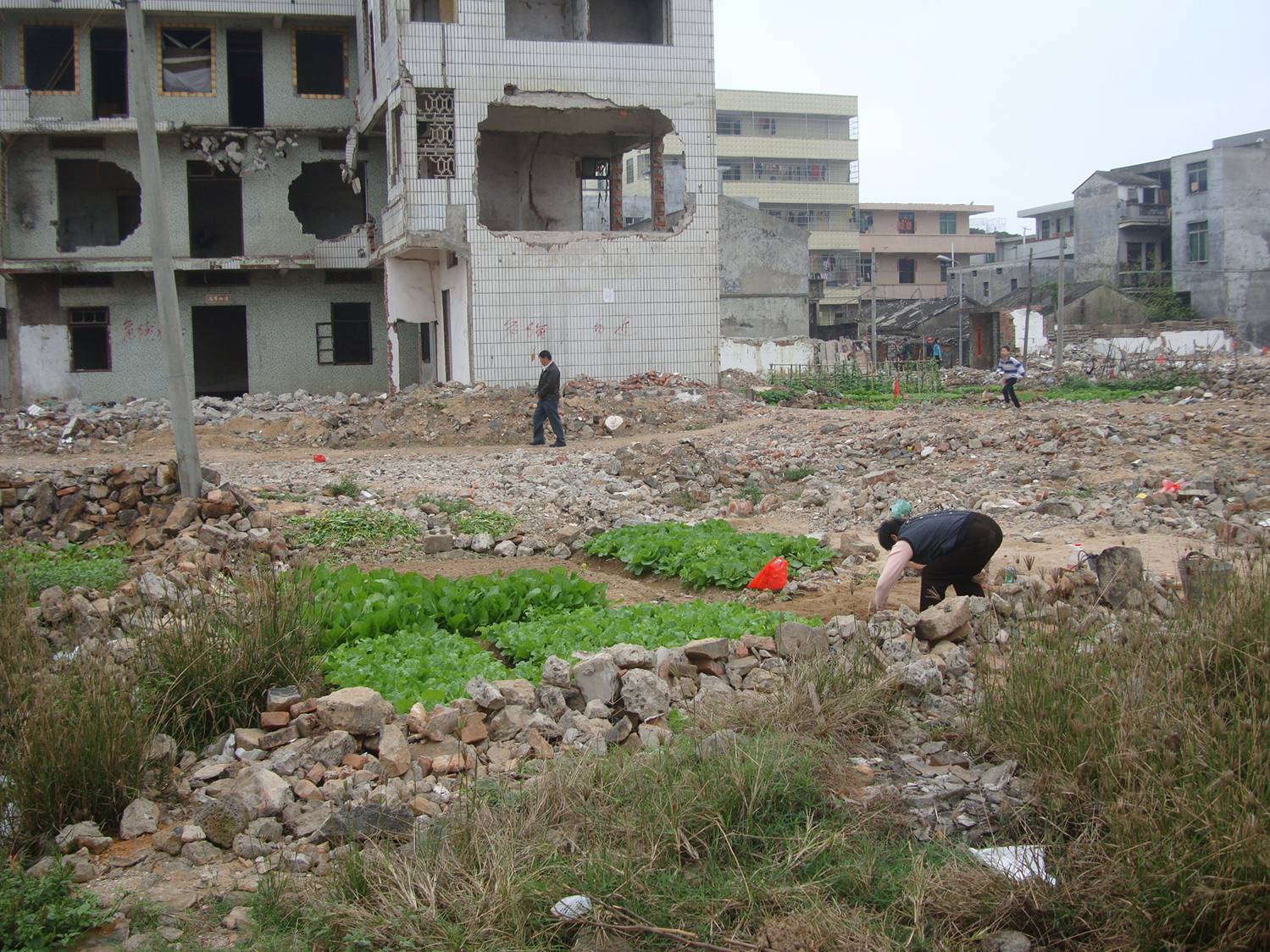
A woman tends her "farm" amidst the rubble of urban renewal, or urban
appropriation.
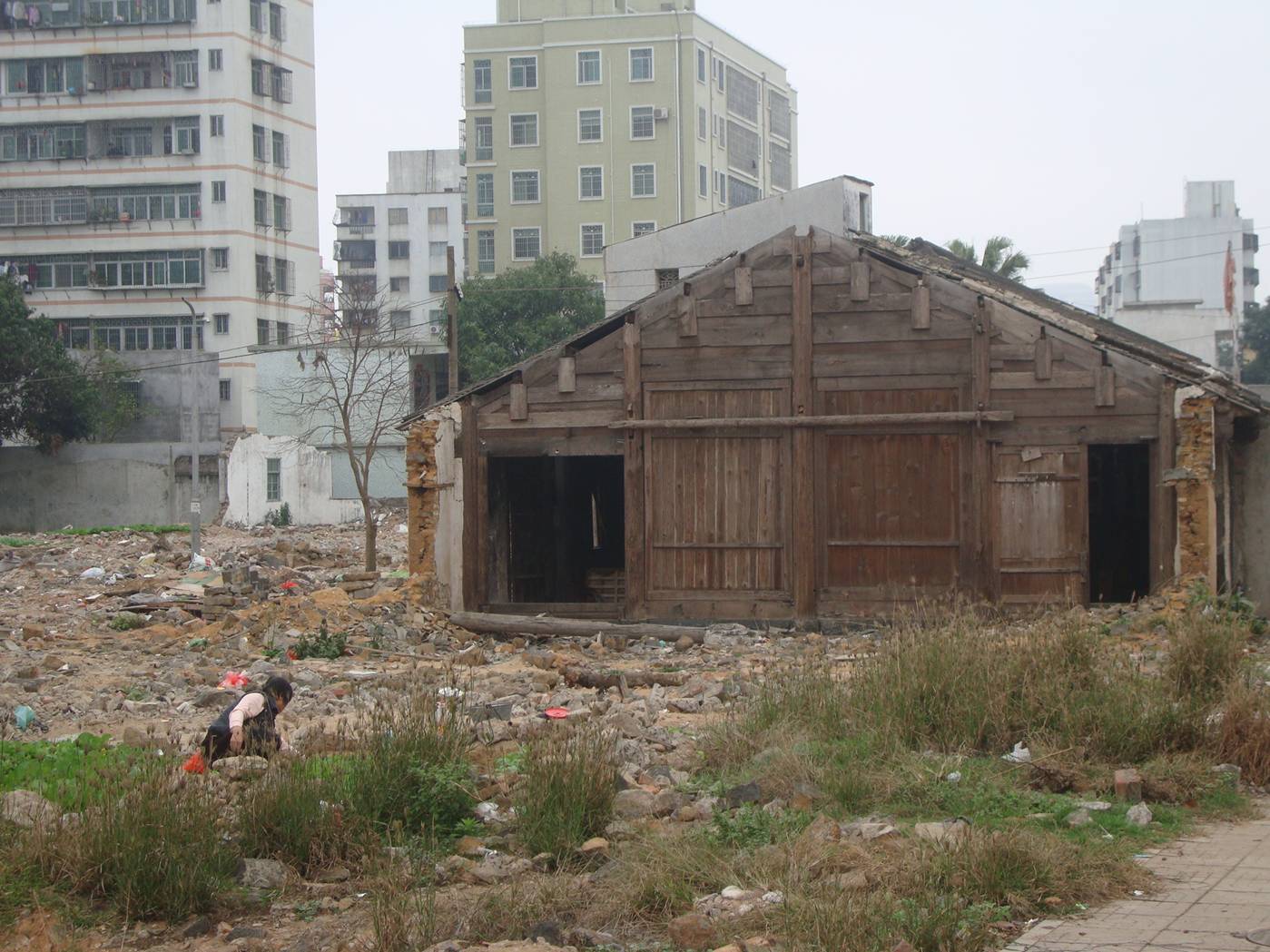

Did
she once live in this old house, or was it a barn? How many of
these little plots are under her care? How long before the land is
covered with new apartment buildings? Have we been eating her
lettuce in our favourite restaurant? So many questions?

Down
on his luck. In excellent English he told us he's divorced and
homeless, scraping by with tutoring and looking for work as a teacher.
We wondered what had caused his life to fall apart so sadly. A
proud man, embarrassed by his circumstances.

It was
the funky cart that made me take this picture, but now I wonder about
the entrepreneur behind it.
I find myself fascinated by the
street merchants of China. I want to know how much they gross in a
day, how much overhead they have, how much they net, where they get
their supplies, what level of independence do they have, what
competition, what social status between them and who makes the best
money, what kinds of support or opposition do they find in the official
community. She's probably supporting a child in university. Or
maybe that's just a foreigner romanticizing her situation. To a pampered
外国人 (wài guó rén, foreigner), this looks like an impossible lifestyle,
as far from our experience as an Australian outback aborigine or
Kalahari bushman. I may start a project to learn the details.
It would make an interesting study, maybe even a book.
Comment
on this Post
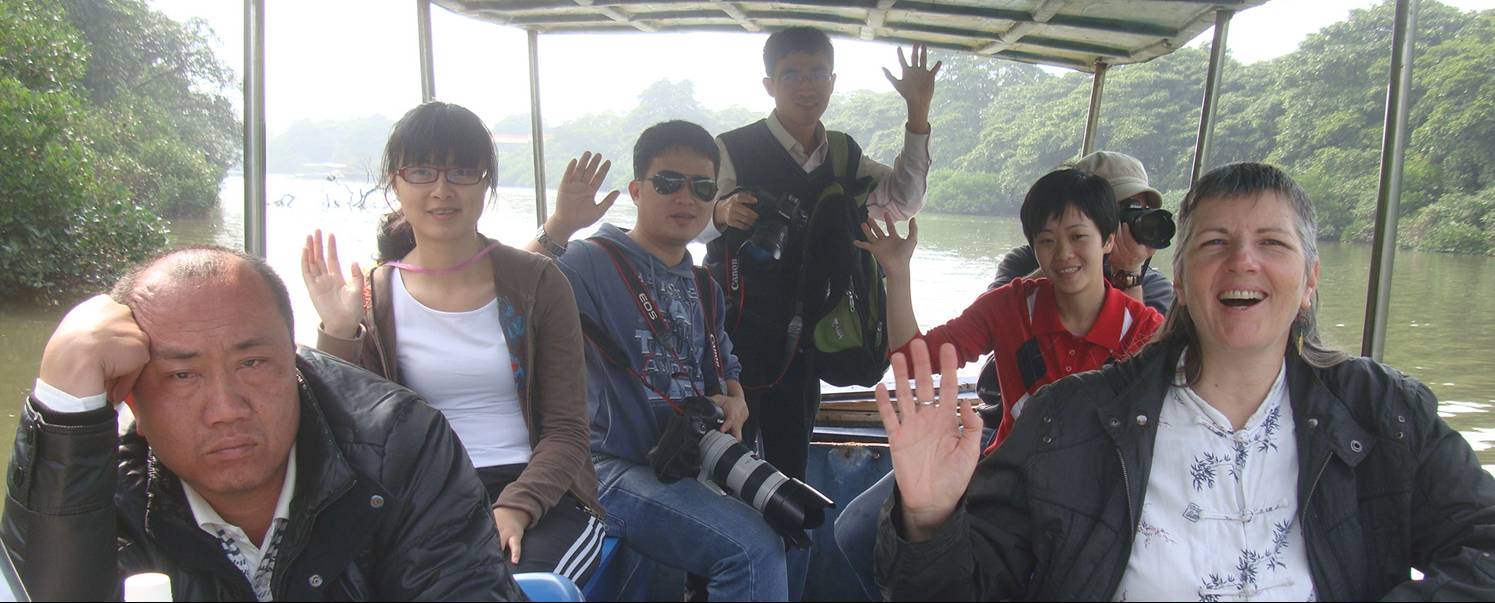
Chinese Word of the
Day: 白鹭鸟
(bái lù niǎo literally "white" + "egret" + "bird") egret or white
crane
February 5, 2011
A Family Day and a Mangrove Swamp
It was a little warmer today, not
warm enough to be oppressive, but just about perfect t-shirt weather.
This morning Patrick picked us up at our hotel and drove us out to Yan
Feng, where Xiao Hua's parents now have a new home. We brought a
gift of fruit and fireworks, and when Jack Zhang arrived with another
string of crackers we had enough to scare any evil spirits away for the
coming year.
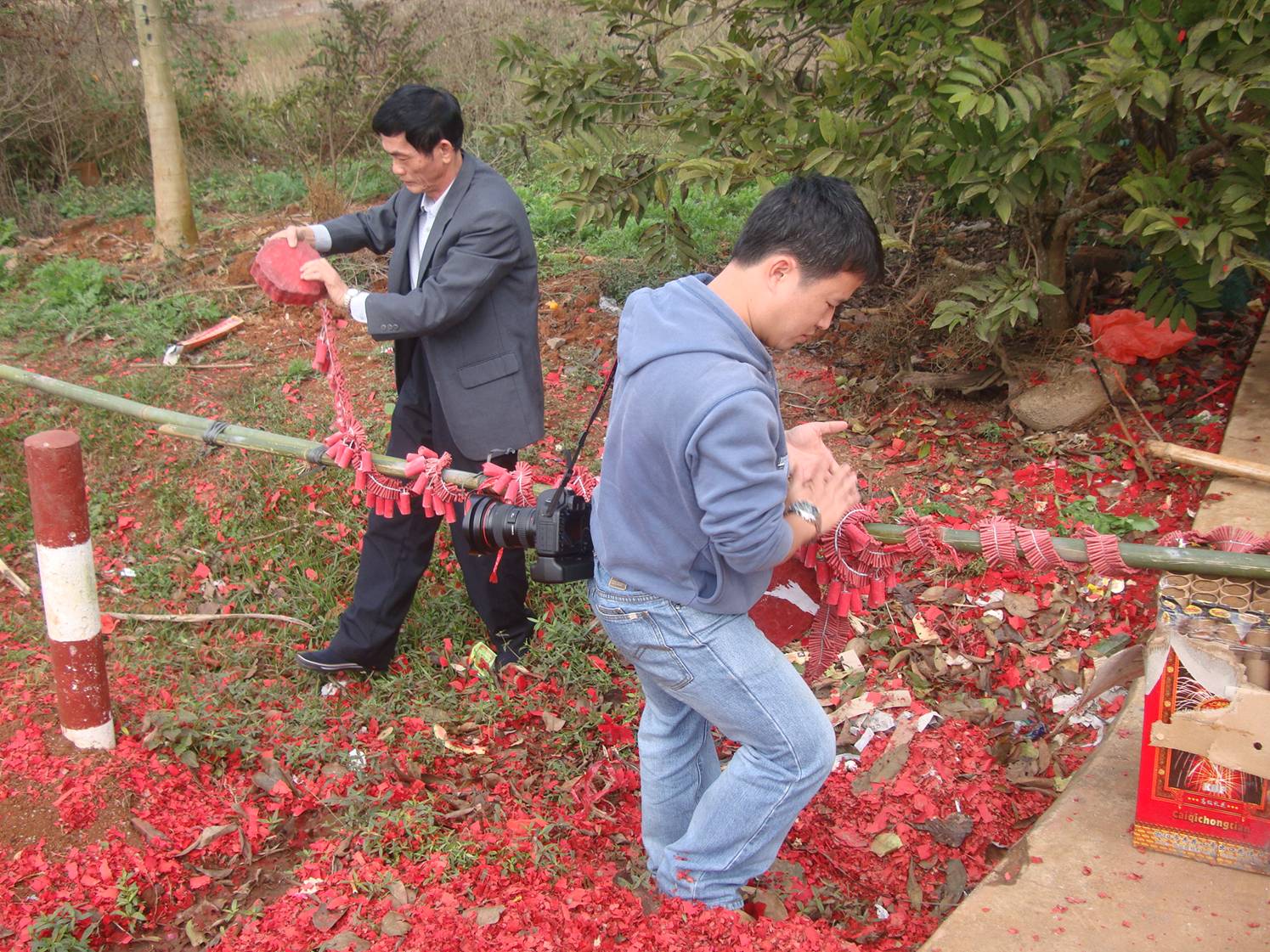
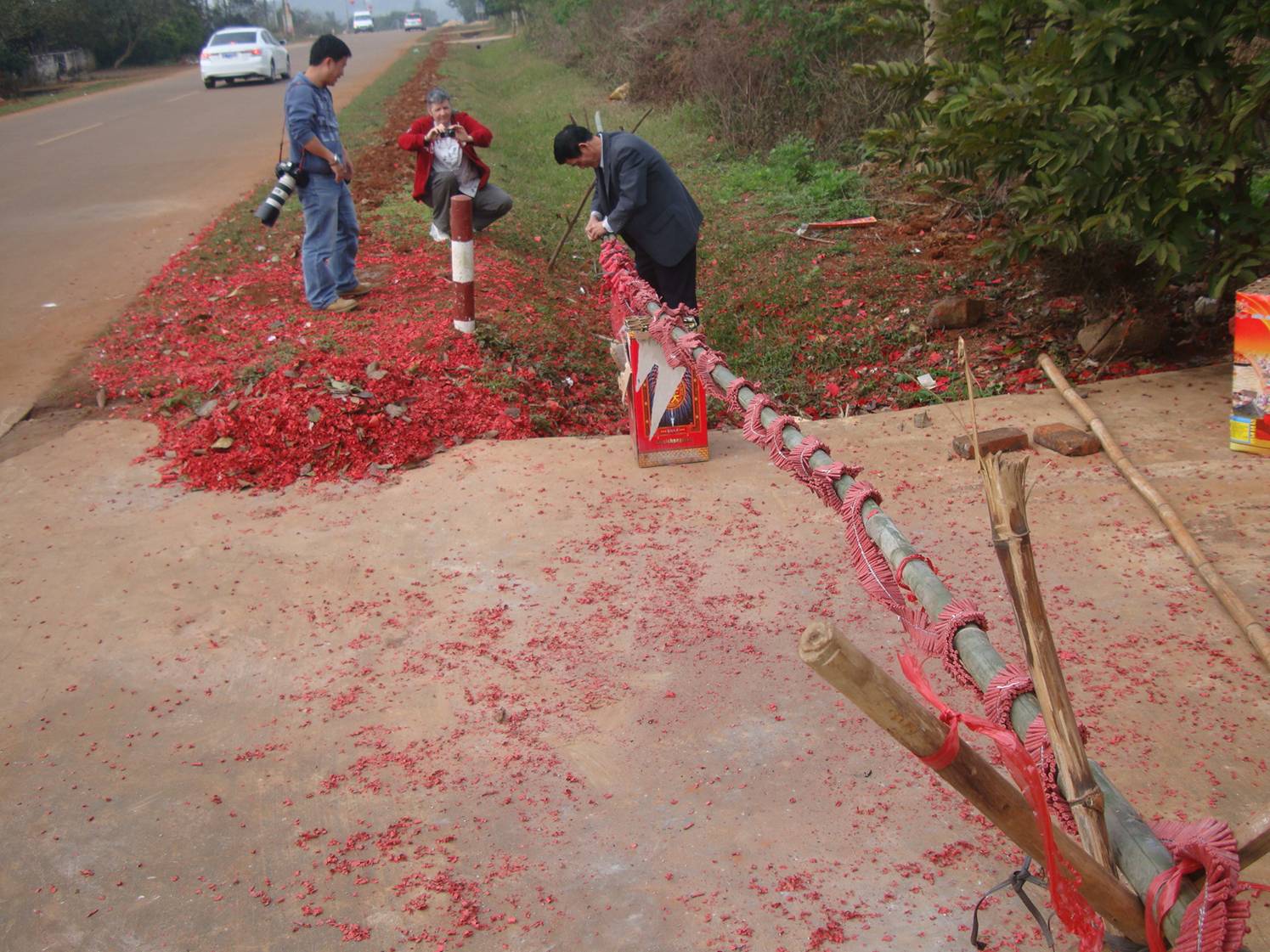
This
is how the strings of firecrackers are set up. They are gloriously
noisy and end with an impressive crescendo.
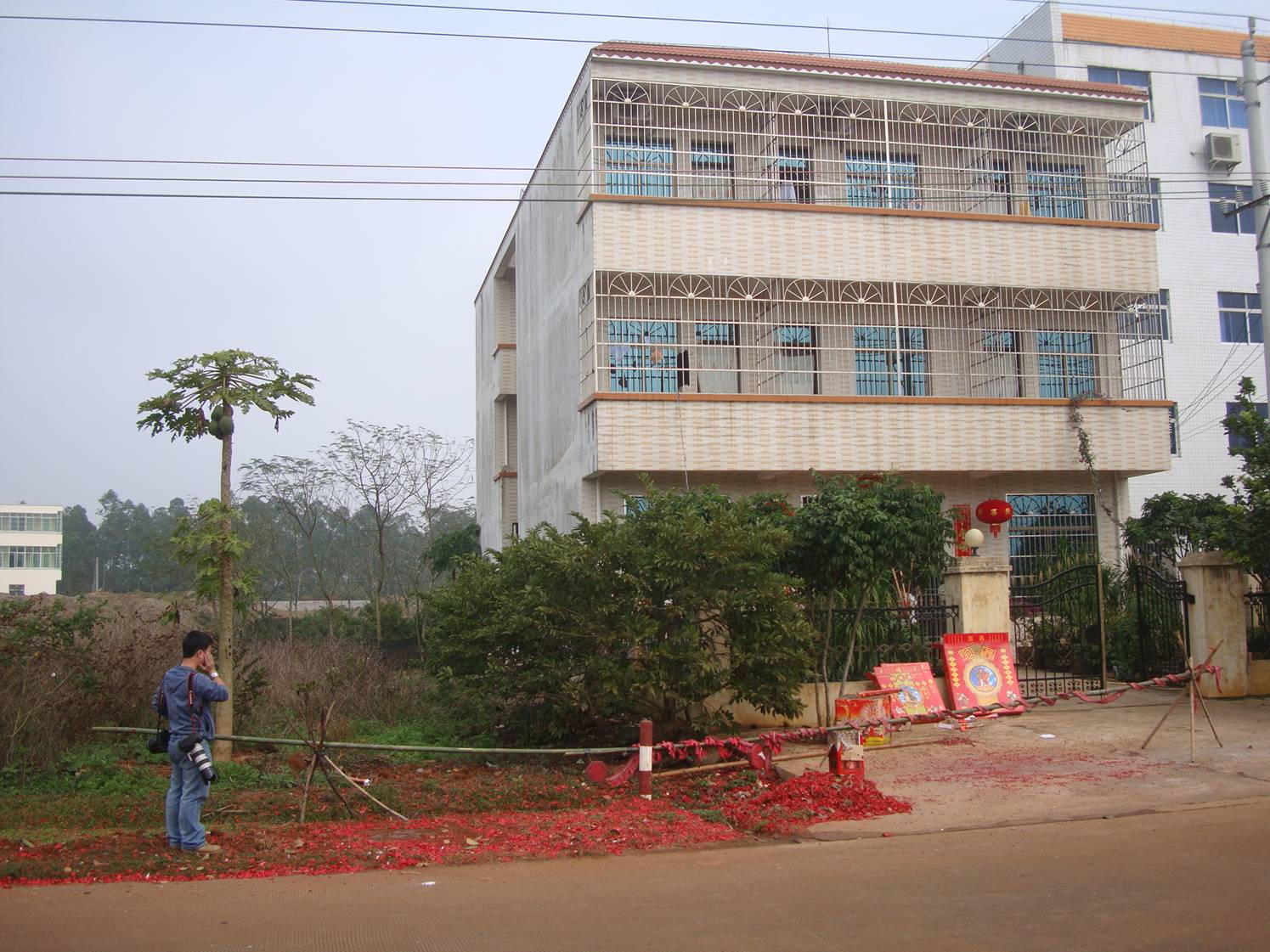
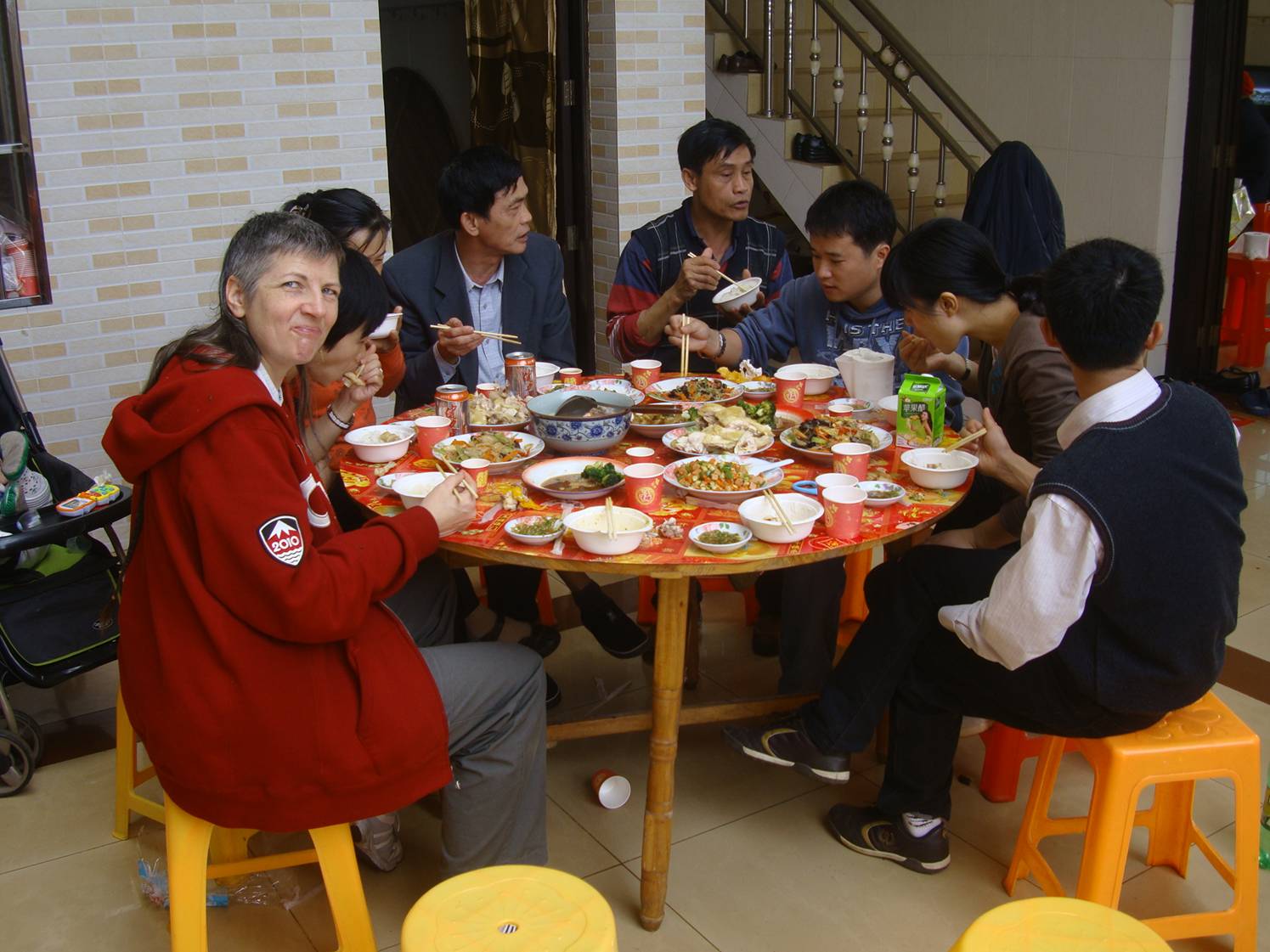
After a couple of songs for
everybody from us and a delicious lunch, cooked by Xiao Hua's uncle, who
runs a restaurant in the village, we were off for a short walk down the
road to the Mangrove Preserve. There we boarded a boat for a
serene glide through the swamps, and a view of the white egrets that
make the swamp their home.
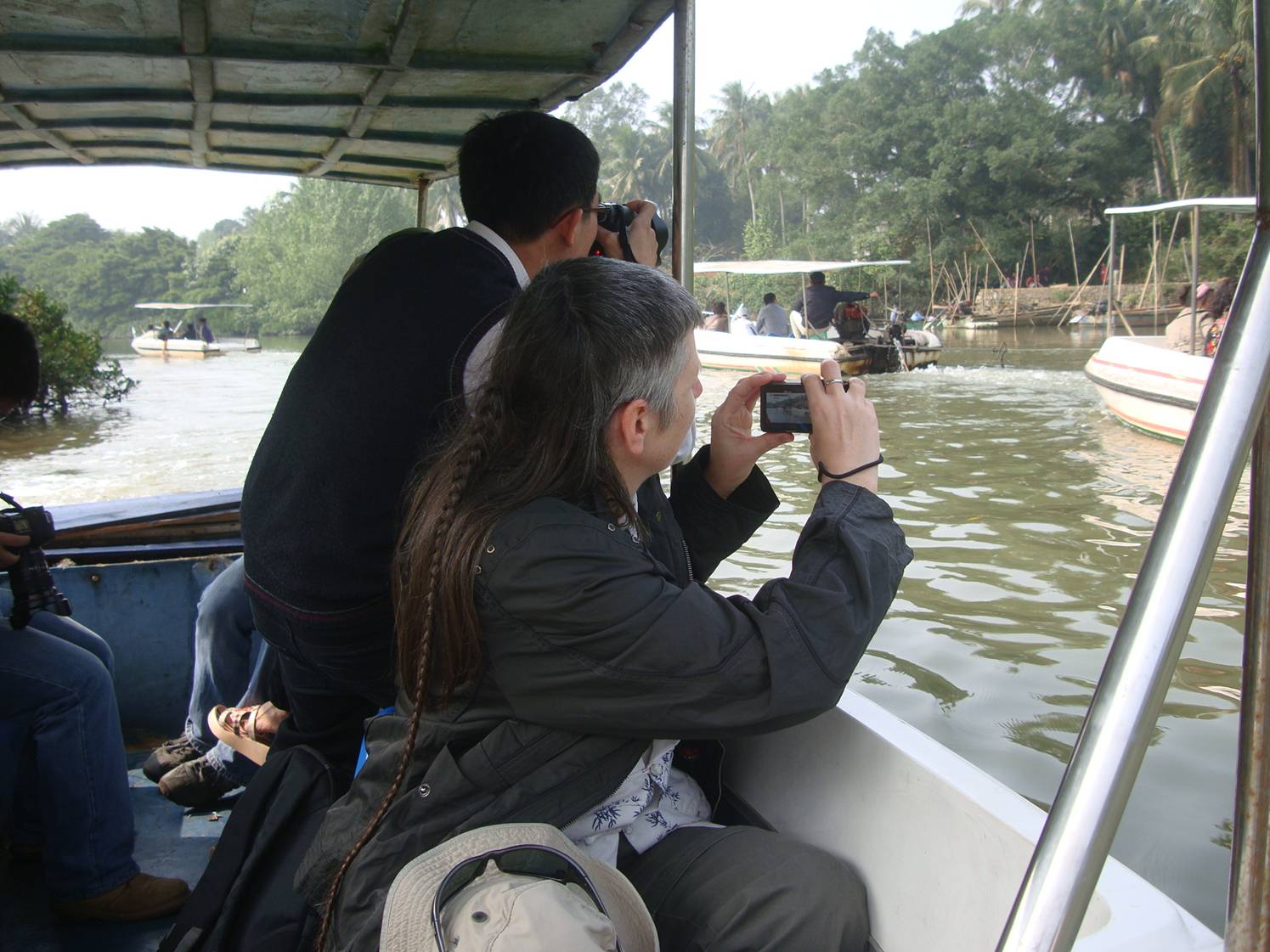
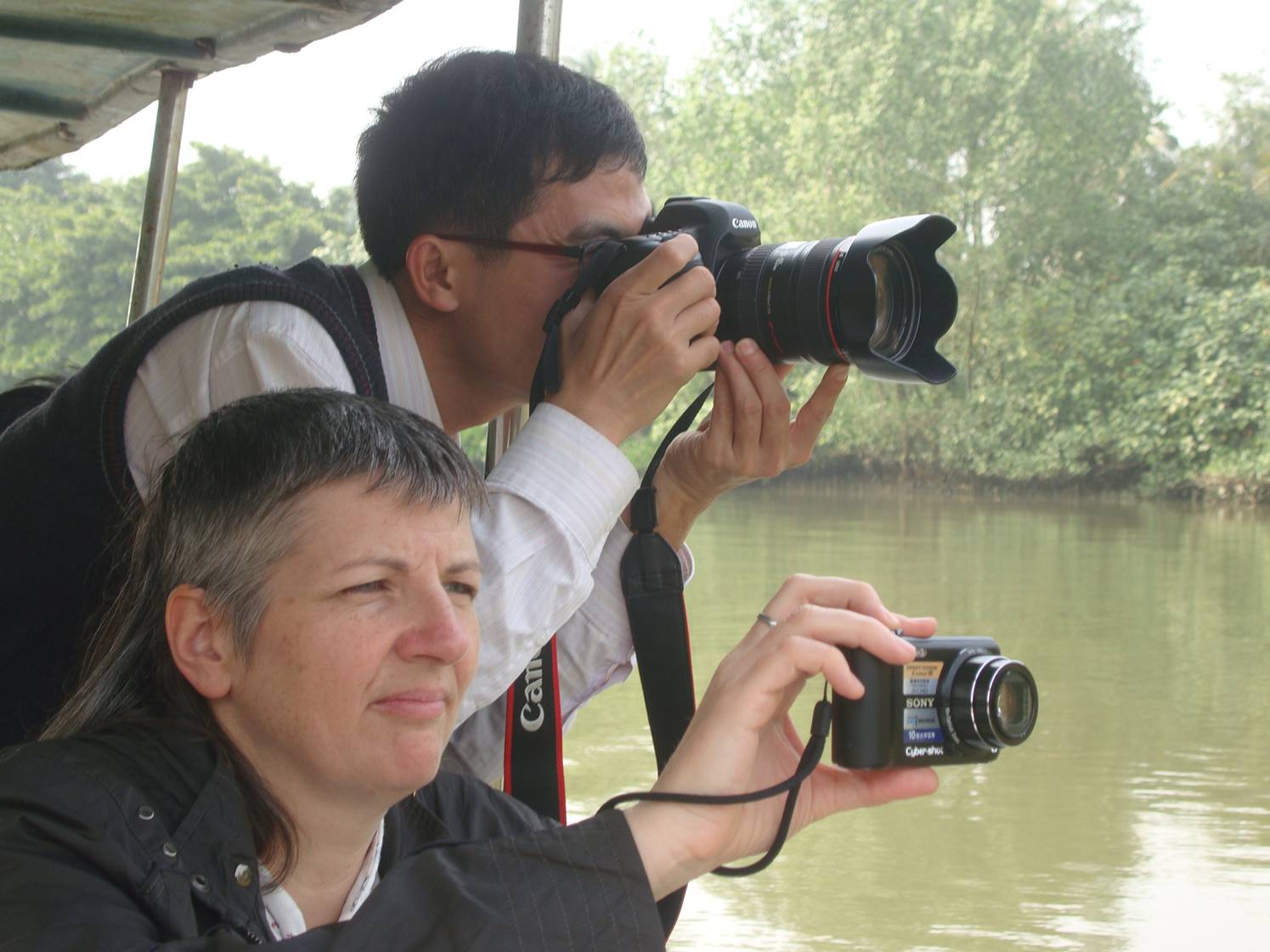

All in all, a great day.
We're always so grateful when people open their homes to us here.
Xiao Hua and her family remain cherished friends.
Comment
on this Post

Chinese of the Day:
新年快乐
(xīn nián kuài lè litterally "new" + "year" + "happy") Happy
New Year
February 3, 2011 New
Year's Day (Chinese) in Haikou
We've been having a very quiet
vacation here, mostly sticking to our hotel room and studying Chinese.
I should correct this statement. We've been quiet, but our
vacation has not been. Here's a sample of what it sounded like.
Just click on either picture for a short video clip.


Stores
selling fireworks sprang up all over Haikou these past few days.
The street cleaner is one of an army of workers who will clean up the
result. It's amazing the job they do.
We didn't know where to be for the
epicenter last night, so it wasn't quite the glorious party that I
remember from our two previous New Year's Eves in Sanya, but the
fireworks were amazing. They started after dark and continued with
a steady roar and continuous bangs for hours, building to a crescendo at
midnight and far beyond. We watched from our hotel room, then
finally fell asleep to the sound of the crackers exploding.
The
video clip is only twenty seconds long.
You have to imagine that sound going on for hours. In fact, it's
starting up again this evening.
New Year's Eve the Day
Ruth and I caught a bus downtown,
but Haikou had a strange energy. Like Christmas Eve back home.
Very few vendors on the street. People hurrying to make their last
minute purchases of fireworks and decorations. But not a lot of
people out and about.

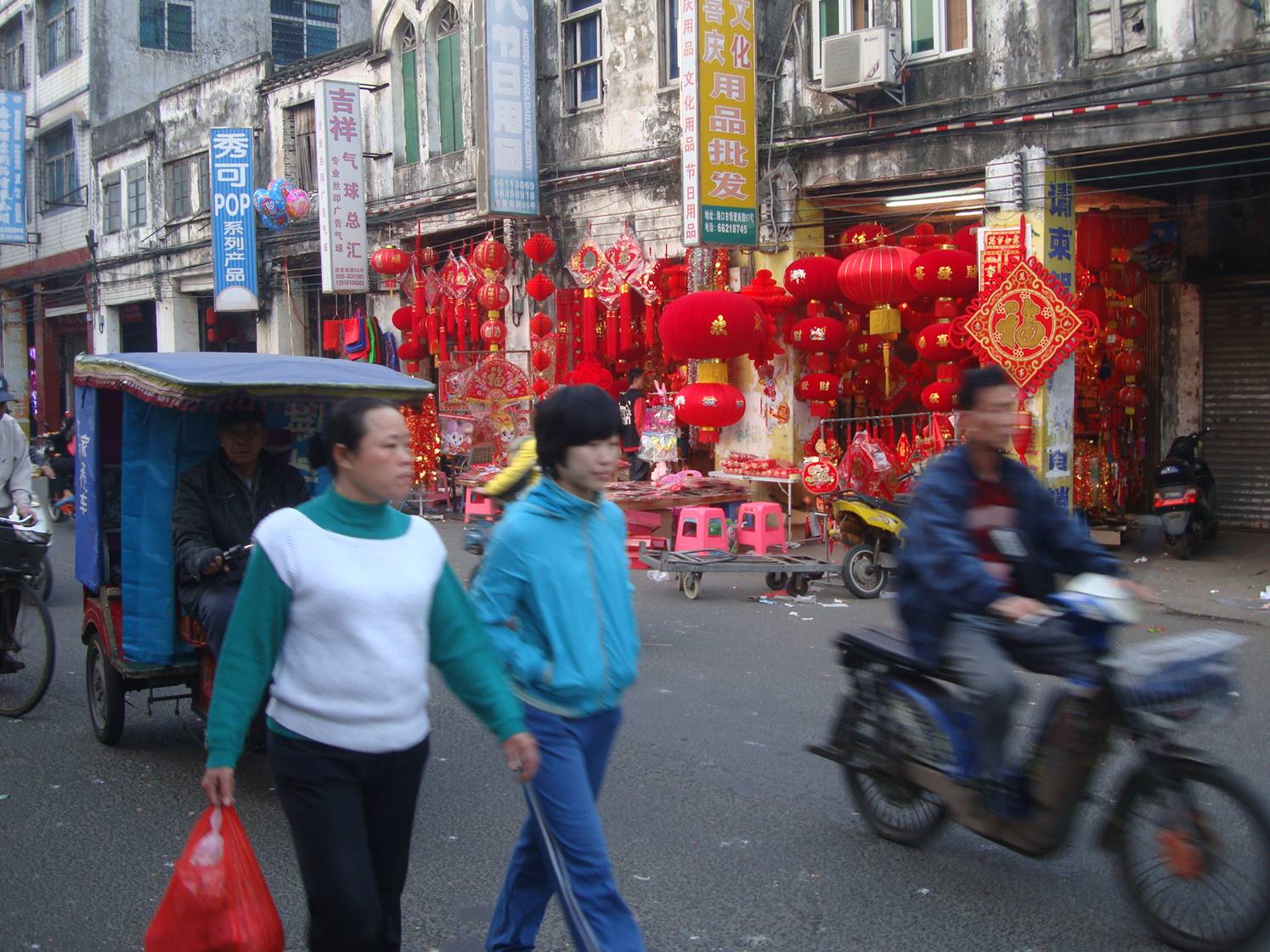
We
spent a leisurely time walking in the nearly deserted park before
getting into the more active areas.
Haikou was quiet. Expectant.
Walking through the market that
evening we found it almost deserted. We wondered off into a nearby
huton before heading back to dinner and thence to our hotel.

This is not a back street. This is a residential area in Haikou,
Hainan Island.
Comment
on this Post

Chinese Word of the
Day: 回忆
(huí yì literally return + remember) v./n. recollect; recall or
memory
February 1, 2011
Desperate Measures for Learning 汉字(Hànzì)
We're on our Winter/Spring vacation
and have escaped the cold of Wuxi for the slightly warmer cold of Haikou
on Hainan Island. It's is an improvement, though my hands and feet
are cold as I type this. Ruth and I have been spending most of our
time in our hotel room studying Chinese. I'm very frustrated by my
glacial progress in learning Chinese characters, 汉子(hànzi), and as usual
I've been looking for a techno-fix. I want something that will
teach me Chinese the way a child learns it from a mother.
Something to make the process painless, with lots of repetition and
forced recall.
Rosetta Stone, the Chinese language program,
is really good and comes the closest to what I imagine of anything we've
found so far, but it's not quite what I need or want. Maybe a game
of some kind? That isn't happening yet, but while thrashing around
trying to find the perfect solution to this problem I started making
mnemonics for Chinese characters. I've only done a couple so far,
but with some encouragement I may continue and make more. Here's a
sample:
|

 gǔ (ancient)
gǔ (ancient)
This is
 shí
(ten) shí
(ten)
over
 kǒu
(mouth) kǒu
(mouth)
Anything that has been handed
down for ten generations (through ten mouths) is bound to be a bit
gooey.
|
And now that we have gǔ (ancient)
we can do hú (lake).
|


hú (lake)
A lake is quite ancient or
 gǔ gǔ
(see the gu mnemonic) and hú rhymes with gǔ
It's full of water, so we'll add
 shuǐ
shuǐ
(the water radical) on the left.
And for balance we'll
add
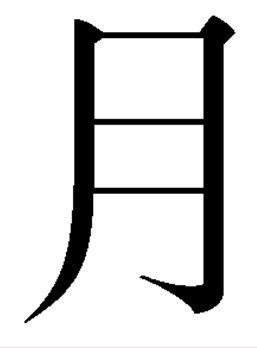 yuè yuè
(the moon radical) on the right because we like to see a lake
under moonlight.
|
Okay, I realize that for a beginner
I need to start with "ten" and "mouth" and "moon" and "water" and then
"water radical" and
the whole concept of radicals before
these mnemonics are ready to work in somebody else's brain. But
please let me know what you think. Will these work for you?
Should I continue along this line, and get a collection of characters
which will hopefully be easier to remember than just lines and patterns.
I could see developing a few hundred (or, yikes, a few
thousand) of these memory aids, putting together a mnemonics index, and
adding some value to this site. It's a daunting task.
Encourage me, okay. Or not. Either way would be helpful.
Comment
on this Post

Chinese Word of the
Day: 烟花鞭炮
(yānhuā biānpào literally "smoke flower whip canon") = fireworks
January 28, 2011 Off
for a Day in Sanya
If, or rather when, the western
world discovers Sanya, the city will become a major world tourist
center. Especially in the winter. Of course that will completely ruin
the place. So get here before
that happens. Try to be one of the lucky few who will be able to say:
Yeah, I knew Sanya before it was spoiled by tourism.
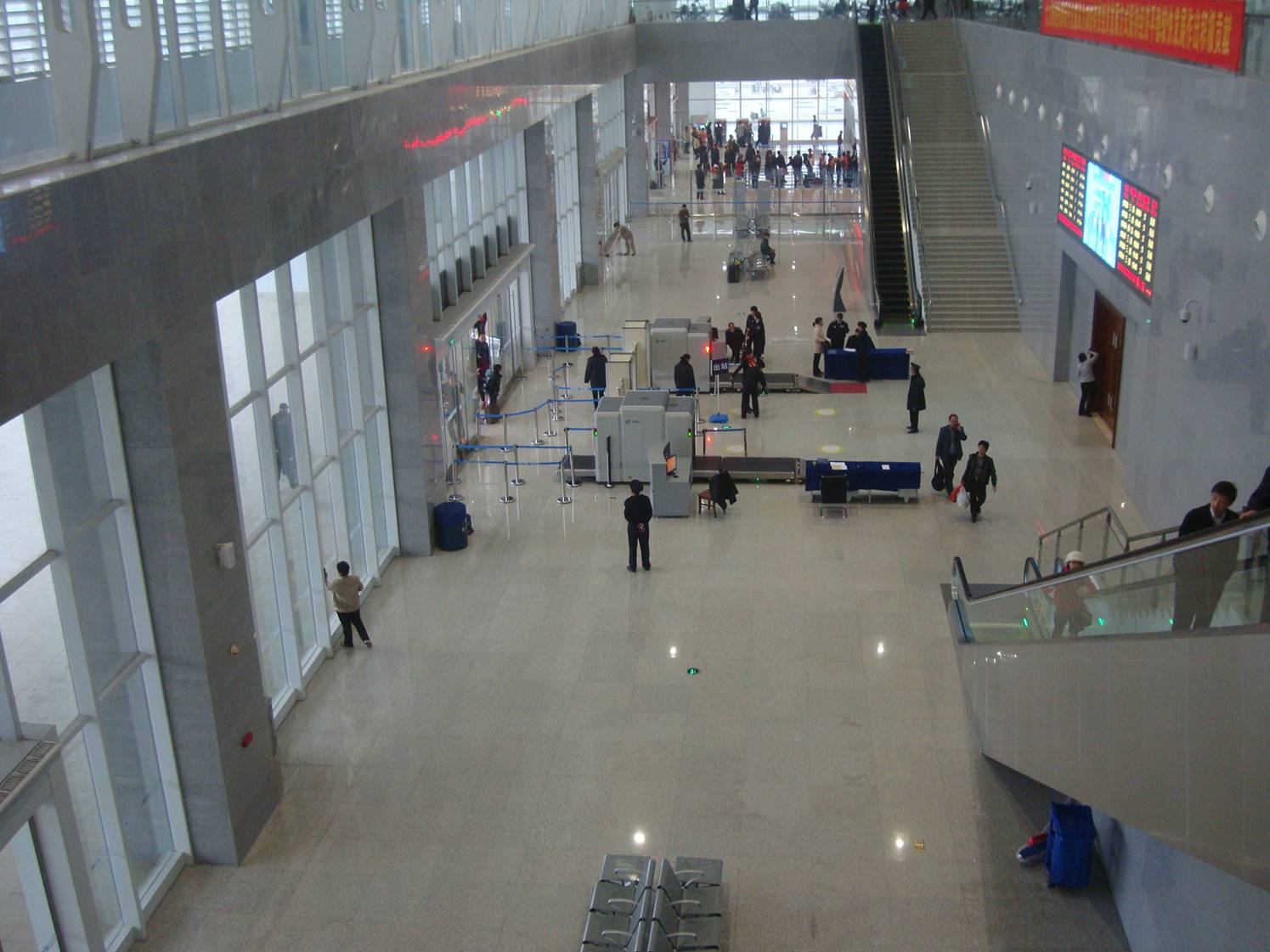
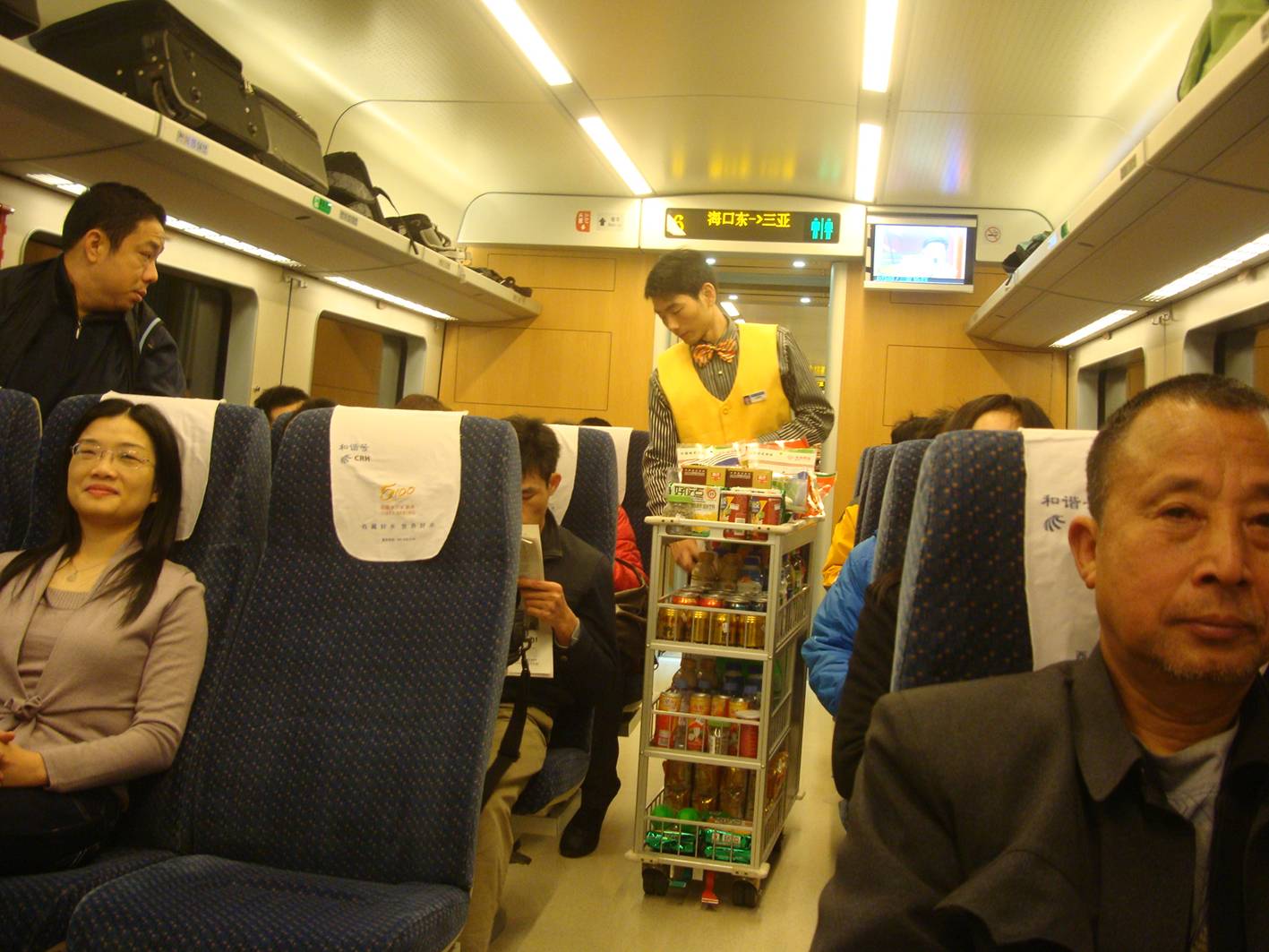
The shiny new fast train station in
Haikou is more like an airport than a train station. Ninety
minutes to Sanya in comfortable seats, even in second class.
We woke up in Haikou at 7:00am on
Tuesday, January 25, quickly hit the street, snagged a taxi, and were at
the new fast train station by 8:20am. Unfortunately there were no first
class tickets left. Fortunately that hardly mattered. Second class on
the new train is plenty comfortable for the mere hour and a half it
takes to get to Sanya.
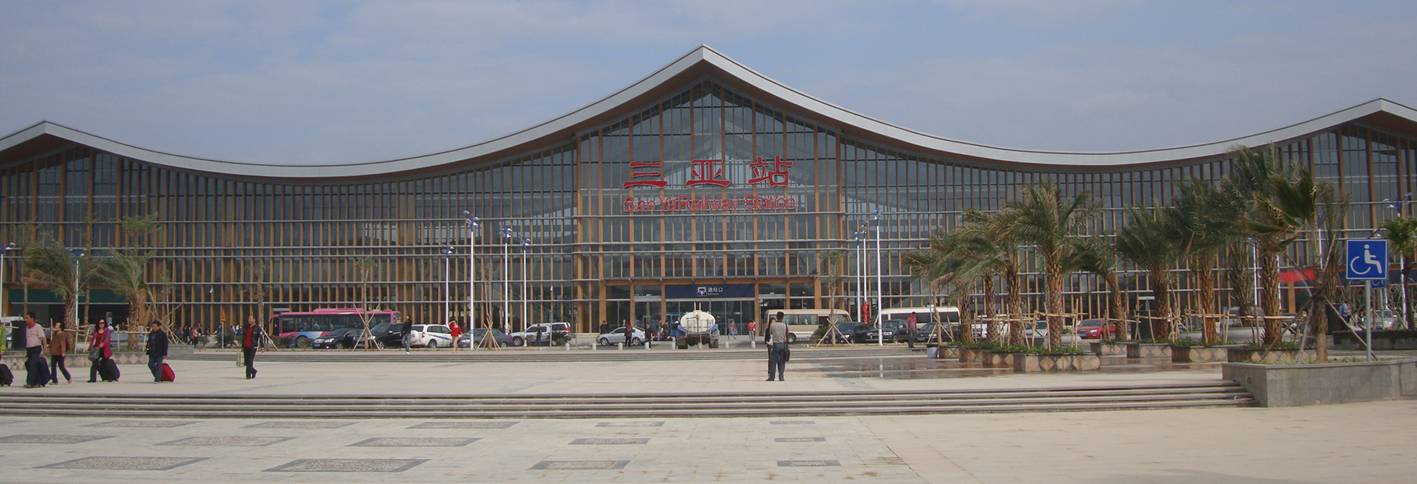
The
equally new and shiny train station in Sanya. So new that there
are no concession booths installed yet.
We caught a bus from the train
station, stepped off the bus in downtown Sanya, and walked into the
hotel ten feet from the bus stop. No problem getting a room.
Actually, the first room they gave us was fine except
for the water dripping from the ceiling onto the desk. We quickly
exchanged it for a room without a leaking ceiling, one that included a
computer with Internet access. We think they wanted to charge us
more for the upgraded room, but with our limited Chinese we just
couldn't understand what they wanted, so they gave up on that idea and
we got it for the original price. A very nice, big room, complete with
Internet access and all the mod cons is setting us back 288RMB/night
(That's $43.5112 Canadian at today's rates.)

Ah,
this is what we came here for. Delightful.
I LOVE Sanya. It's incredible.
Miles and miles of clean beaches, busy but not really overcrowded.
Interesting things to see and do. Still with the texture of China and
enough of the alien and strange to be exciting, but very safe, very
family, and just lots of fun. Best of all it's still affordable, though
everything does get more expensive during the Spring Festival tourist
season.
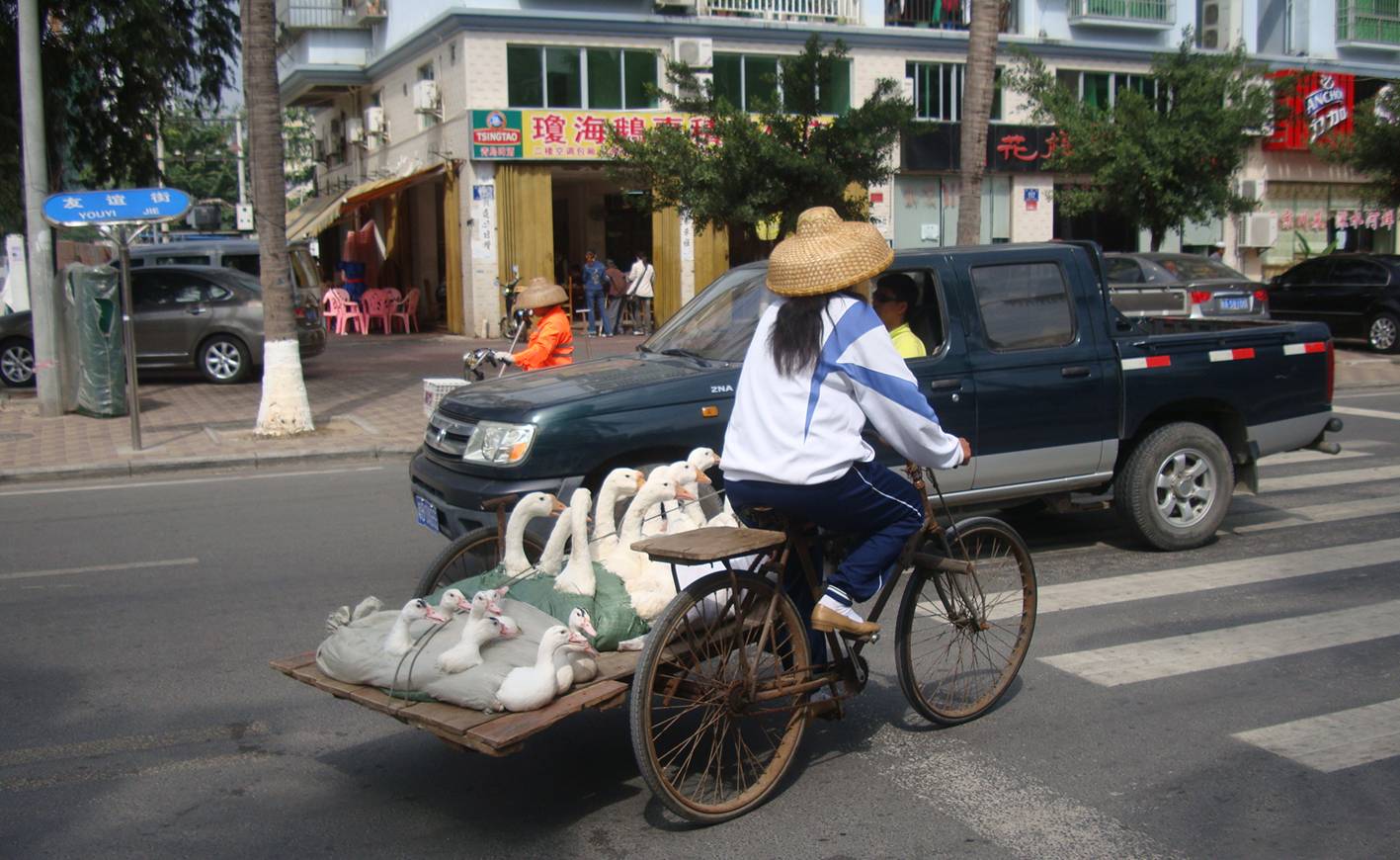
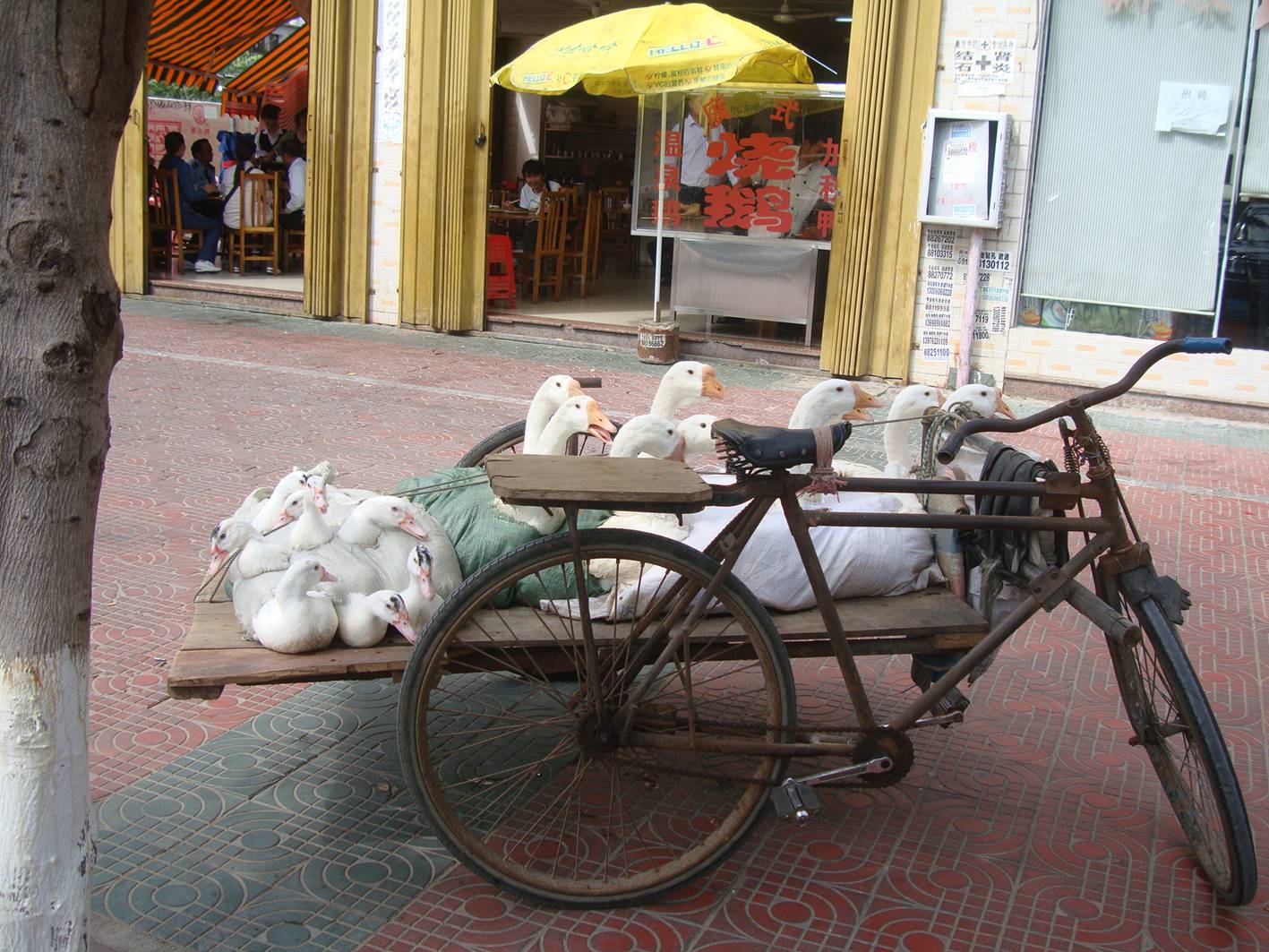
I was
chasing this goose cart to get the picture, not realizing the delivery
driver was about to stop at a restaurant.
After we settled in, we took a
walk and noticed geese being delivered to a restaurant. Mmmn.. Goose for
lunch, along with two different steamed vegetable dishes. Another short
walk after lunch took us to the beach. It's amazing the difference an
hour on a train makes. Sanya right now is perfectly warm. Not too hot if
you stay in the shade, but not chilly at all. I found a beautiful shell
within minutes of stepping on the sand.

Tiny
crabs scuttled into their holes as the kids tried to catch them.
Kids are the same everywhere.
We caught a very luxurious bus
(3RMB, about fifty cents Canadian) from downtown to Da Dong Hai beach,
where the Internet said there were submarine tours available. The posted
price was 380 RMB, but we were instantly given the group rate of 300RMB
($45.64 Canadian). As soon as we had our tickets we were hustled,
literally, down to a little dock where a boat was already loaded with
other customers and waiting to take us out to the submarine.


On the way out to the sub we passed
some float houses, a sure sign that Sanya has it's own Marina culture,
just like Vancouver and Victoria back in B.C.

My heart sank a little as we
approached the sub. It wasn't the bright shiny new ten million RMB job
I'd been lead to expect. Maybe that one is up in Yalong Bay. This one
had seen better days, and obviously too many close encounters with the
bottom, or the reef. Downright ratty looking.


Setting misgivings aside, we
boarded and soon were cruising at the surface, as indicated by the
conning tower camera, and heading for the dive site. Once there we went
completely under, down to a dept of 20 meters, or so the young lady
tourist wrangler claimed, and the pilot put us within inches of the
rather battered looking cliff face.
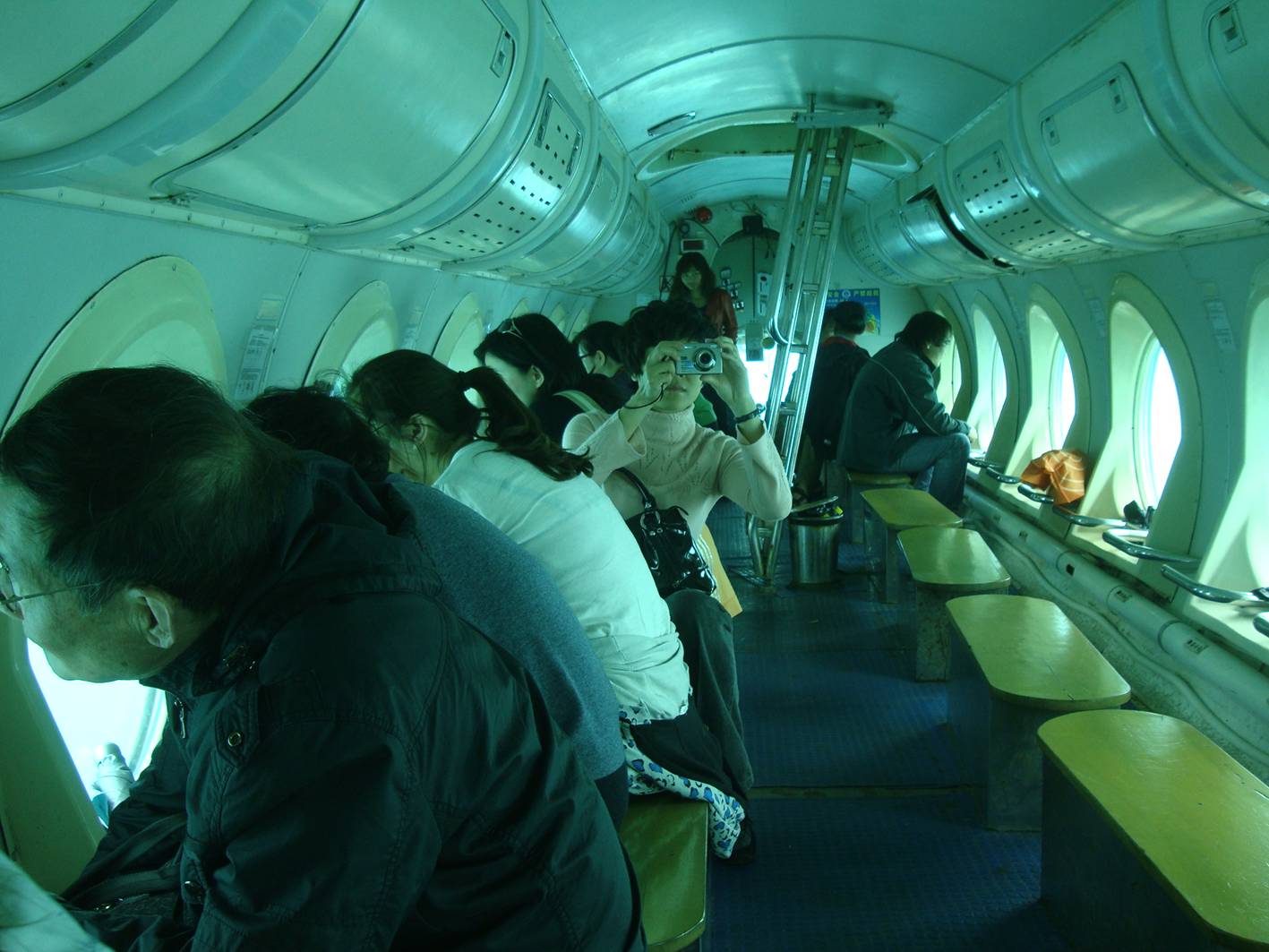
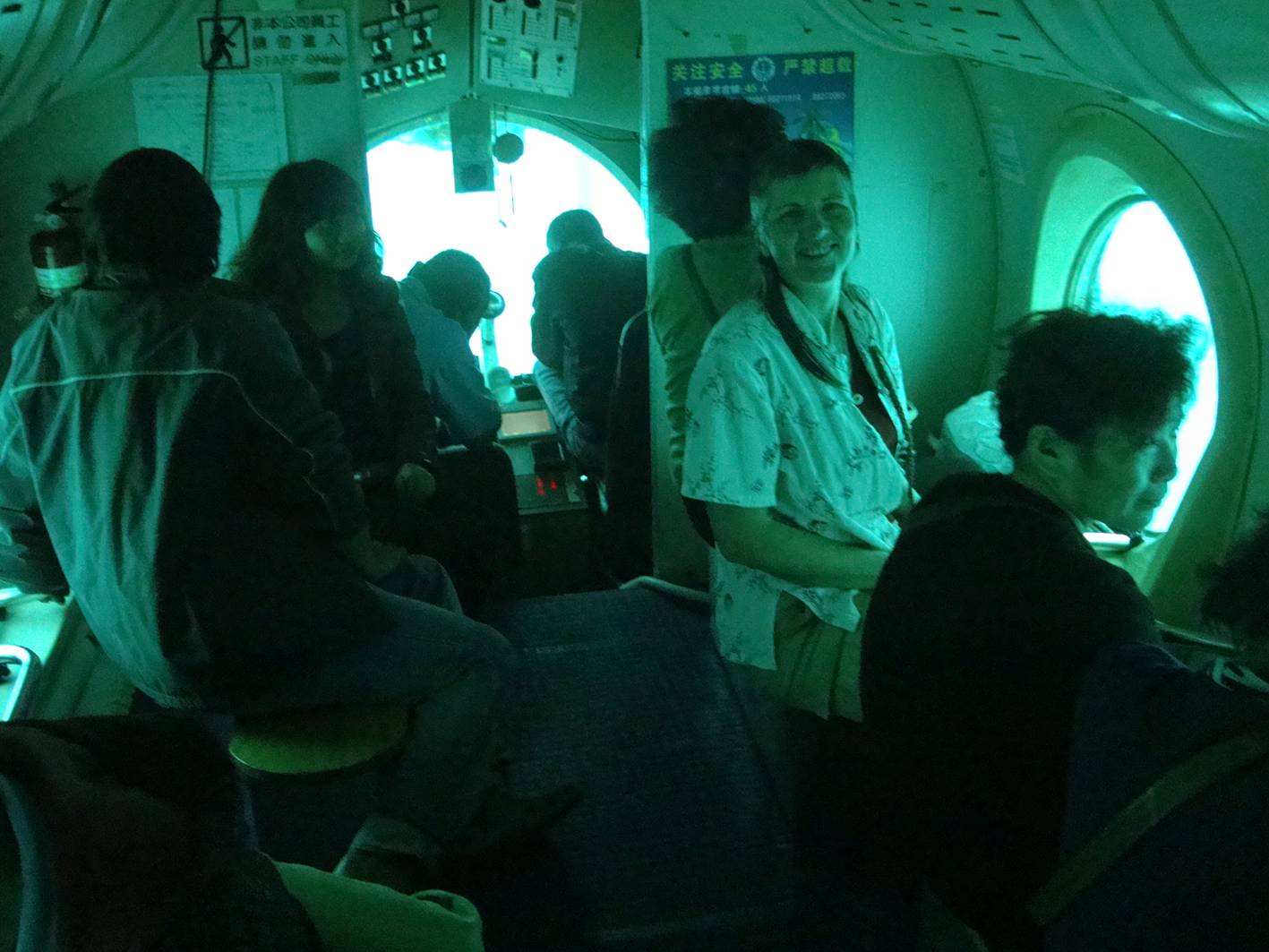
We needed to be that close to see
anything, and what we saw would not rival a look into your average
restaurant fish tank. The water was very murky. The biggest fish we saw
might be five inches long.


A few
colourful fish came in and out of view, but... really.... it would have
been better to go to an aquarium.
Just about any aquarium. Except for the thrill of actually being
down there, of course.

Still, we didn't resent the
expense or the time. It's something to be able to say we've done. Should
you do it? Well, that depends on how much you want to experience an hour
in a tube peering through murky water to see the occasional small fish.
If that's your thing, go for it. It may not even be that murky all the
time. I think the submarine ride was worth it. Once. If you do it,
please let me know if you agree with me.
Comment
on this Post

Da Dong Hai has jet ski rentals,
paraglider flights towed by a boat, and a whole row of carnival rides.

We saw
the occasional Russian, but few foreign faces in the Chinese crowd.
After the submarine tour we hit
the seaside hotel for a coffee and a nai cha (milk tea), then walked on
the beach where I bought a coconut full of milk from a bored and surly
vendor. The beach was busy. I'm becoming jaded.

Put
the lime in the coconut and add some rum and this would be not bad.

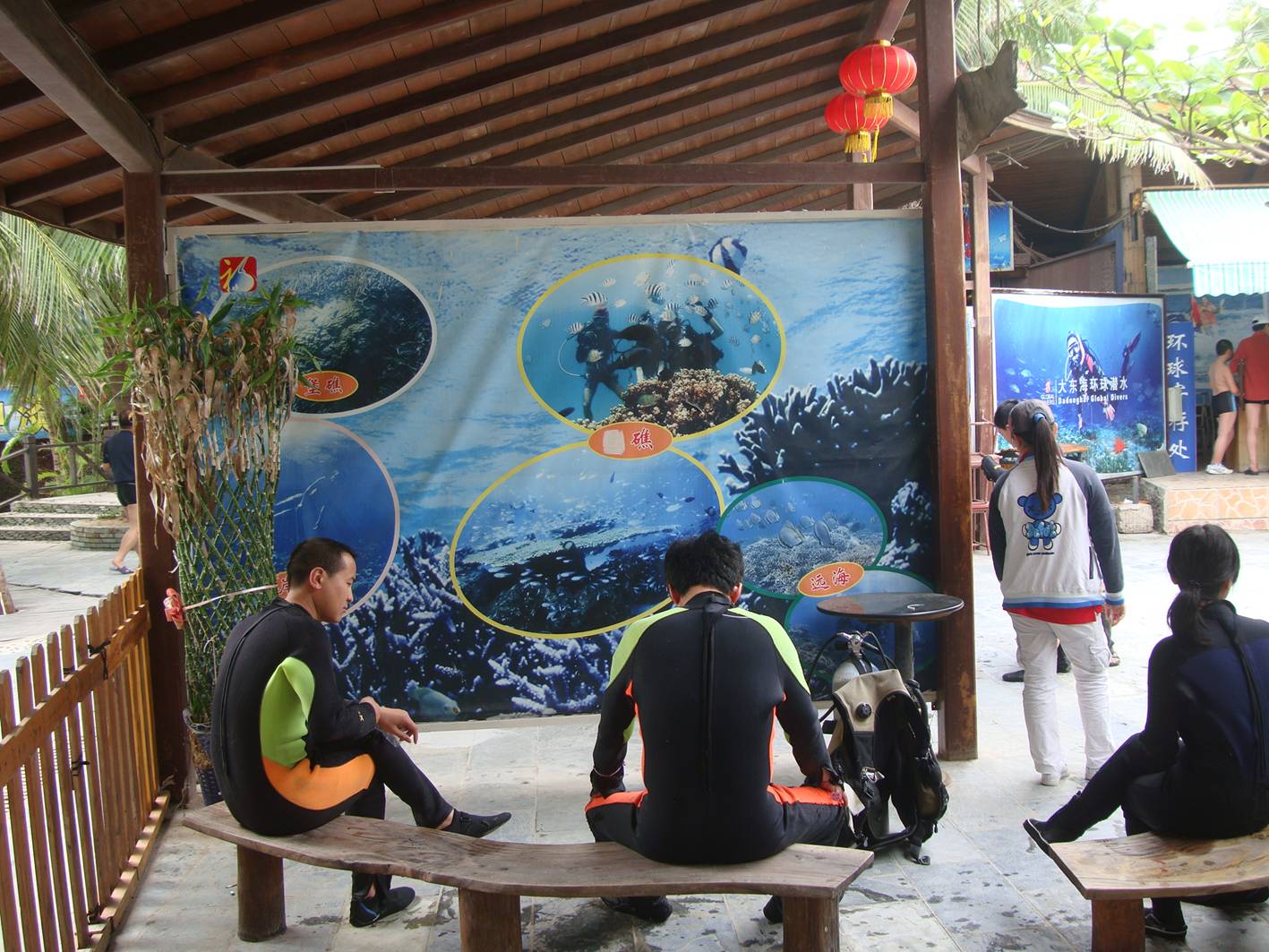

And here was the scuba dragging operation. The picture on the
poster makes it look like you will actually have the freedom SCUBA was
invented to give you, freedom to move around at will without trailing
hoses or restrictions, but that's not what these customers are going to
experience. After ten minutes of "training" they'll be dragged over some
well worn coral by a big Chinese guide. When we got tricked into doing
this, six years ago, our young Chinese friend thought it was the
highpoint of her entire vacation with us. So if you've never
experienced breathing under water, it's worth the money. For Ruth
and me, both of us open water certified, it was an infuriating
disappointment.

A short wait at the bus stop and
we were on a bus back to our own beach. I paid an exorbitant amount for
a very unimpressive durian, which we ate on the beach looking out at the
ocean and listening to a couple of old guys playing 葫芦咝 húlu si,
traditional gourd reed instruments, accompanied by a beat box in a
backpack. The durian filled us up enough that we went back to our hotel
for a while before going out for dinner.
The next day we spent some time finding a computer
place where I could get some discs copied, walked the beach for a while,
then caught a bus back to the Sanya train station.



One of
the joys of travel is the people we meet. This friendly gentleman
is from Austria and spoke no English. His Chinese wife could speak
Austrian, but we can't. So we talked to her in Chinese. That
was a thrill for us.
Comment
on this Post
On No! Looks Like the
Party's Been Cancelled
Once
back in Haikou and preparing for this post, I translated the new sign
I'd found on the beach in Sanya. To paraphrase the translation: Setting
off fireworks on the beach is strictly forbidden and illegal. What a
disappointment! It looks like the party's been cancelled.

This
now feels like writing an obituary for the Sanya we knew, the Sanya I
loved so much. Such a pity. I've been lobbying my family to
join me in Sanya for the Chinese New Year next year, 2012, because the
last two times I've been there it's been the best party I've ever
attended. A great party. A party that should have made Sanya
as world famous as the famous Marti Gras made New Orleans. Even
better than Marti Gras because it hasn't been as crowded, and much more
family friendly. In past years, hundreds of families in Sanya have
brought their children down to the beach to set off fire works on the
Chinese New Year's Eve. It's been a family time. Smiles
everywhere. No belligerent drunks, no crowding on Sanya's
miles of beautiful beaches. Just the best party one could ever
imagine while the whole city explodes in the background. "Come and
experience this before it's spoiled by popularity," I told all my
relatives. Oops. Too late. The wise leaders of Sanya
have banned fireworks on their beach. The party is cancelled.

An
amateur music group gathers for a practice behind the unfortunate sign.
Sanya is
trying very hard to be a tourist town. When I look back at our
visit, just concluded, I realize that Sanya already feels like a tourist
town. They have all the tacky attractions, the bungee cord rides
on the beach, the paraglider flights towed by a boat, the SCUBA training
adventure we have dubbed "SCUBA dragging" because, after ten minutes of
"training", the hardy adventurer is not given a BDC or flippers but
instead is dragged helplessly over some well worn coral by a big Chinese
guy who does have flippers.
Tourism can be an unpleasant business for locals and I
now see, reviewing our visit, that in Sanya this is really starting to
show. The blight has set in. Nowhere in China have I
encountered more sullen workers, more bored and unhappy waiters and
servers, than in Sanya. Elsewhere in China, where foreigners are
still a novelty, we're always greeted with smiles and warmth. In
Sanya the guy selling me a coconut full of milk looked like he'd seen
far too many foreigners, and didn't like them much. He was not
happy to serve me. And now they have cancelled the party. Oh
well. The moving finger writes, and having writ moves on.
Time to find a new place to delight in the unspoiled atmosphere.
There's still some planet left, even places with beaches as beautiful as
those of Sanya.
Comment
on this Post
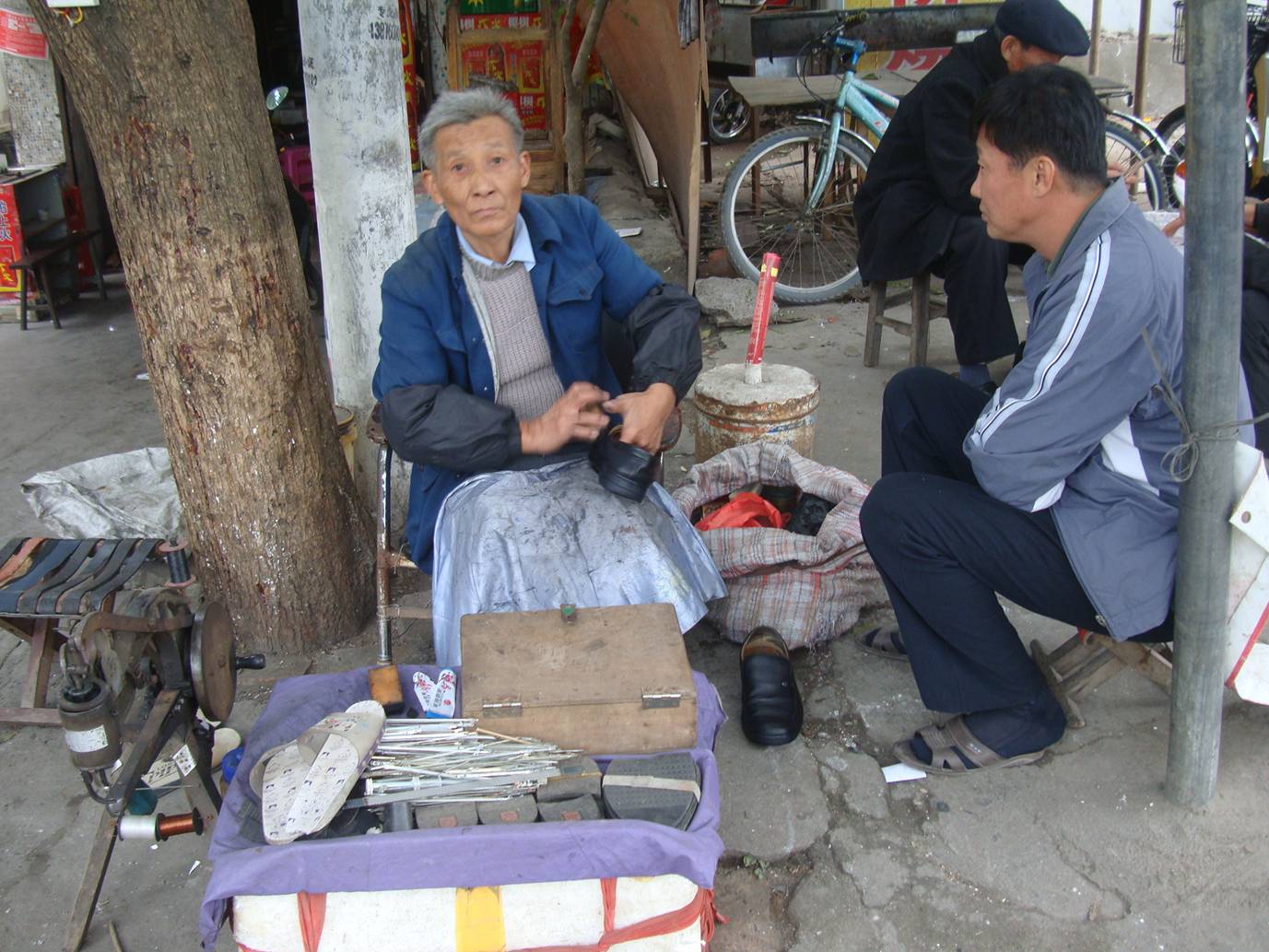
Back
in Haikou I enjoy the textures of the street life, and marvel at the
entrepreneurial population.
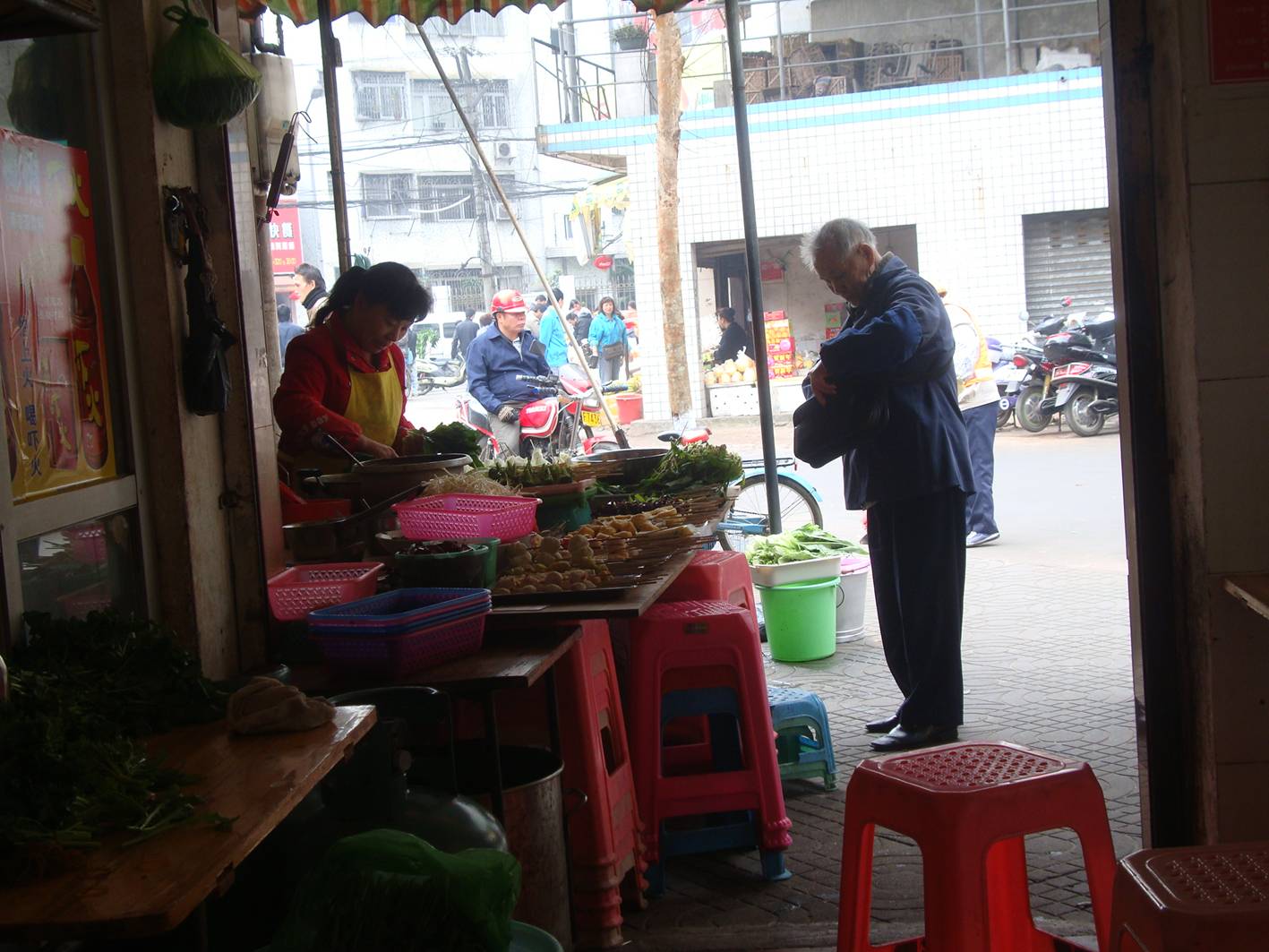
We had
breakfast in a small streetside restaurant. Good chow mien.
Very cheap.
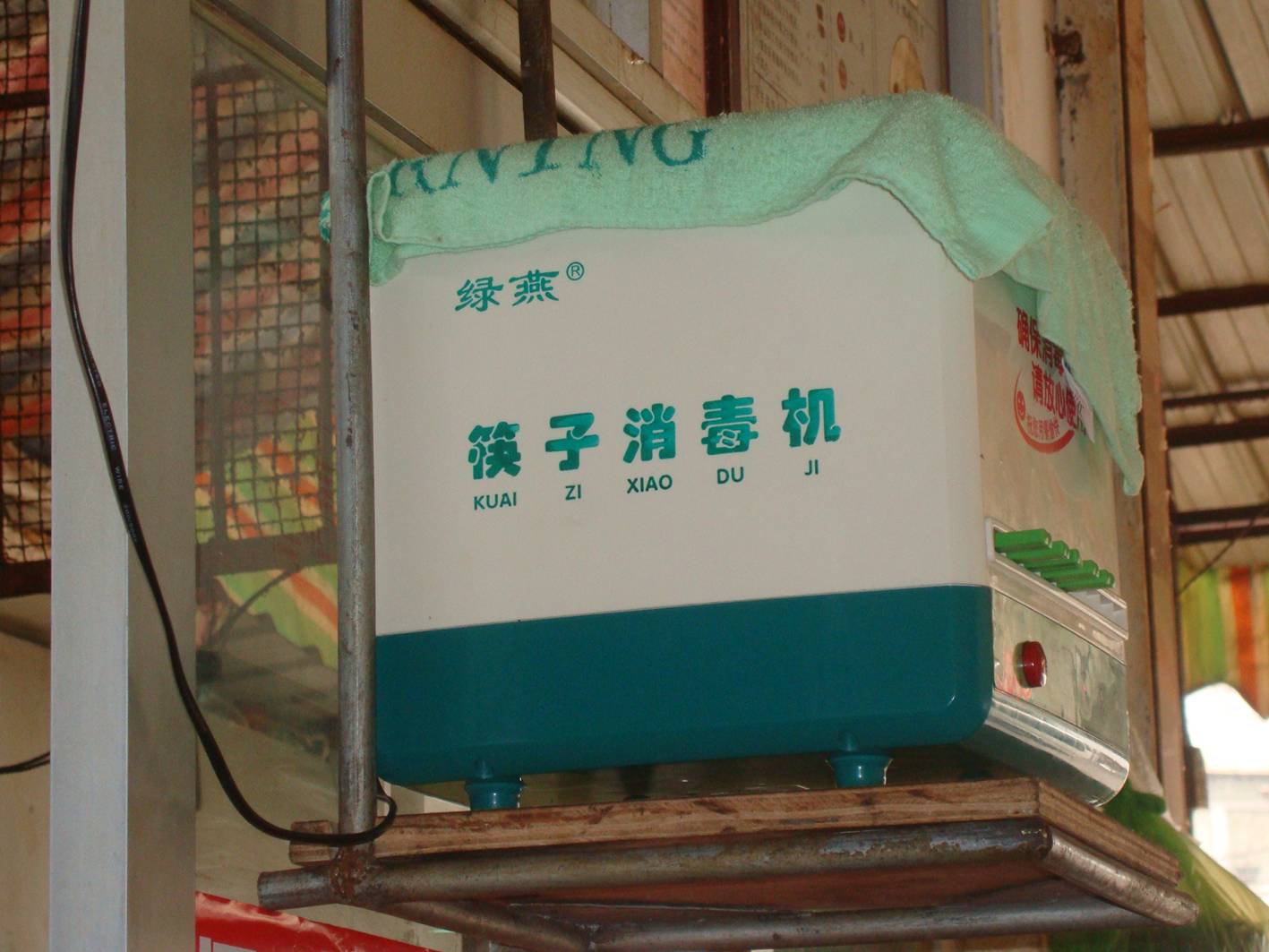
I'd
never seen one of these before. It's a little chopstick washer,
mounted up near the ceiling of what appears to be a very makeshift, but
well established, sidewalk restaurant.
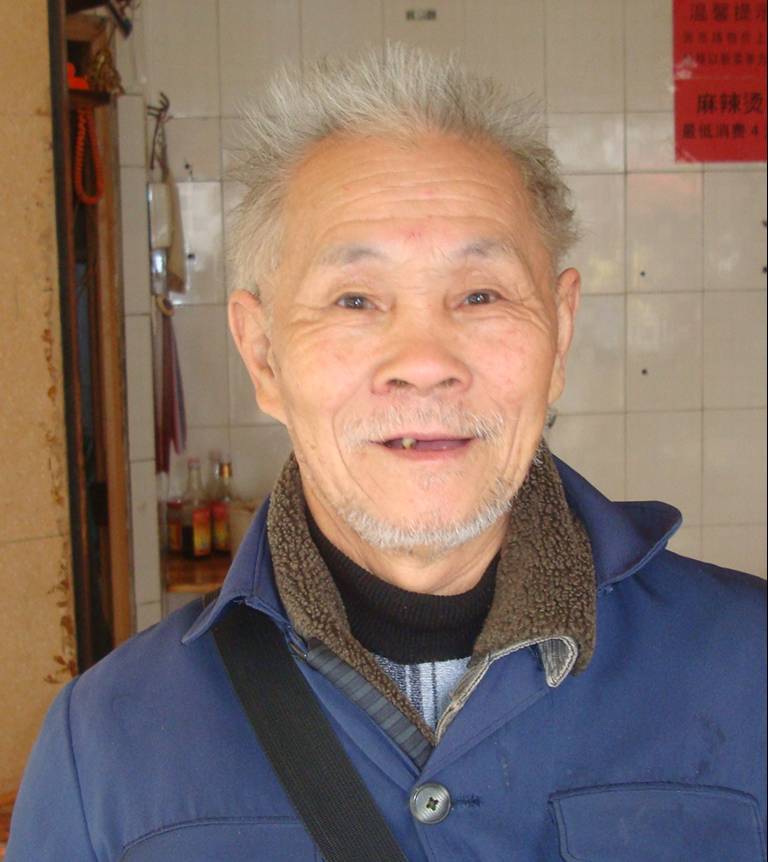
The
restaurant 老板 lǎobǎn opened our conversation with a question: How old
are you?
I told him, and asked his age in return. He said he's seventy-six.
Comment
on this Post
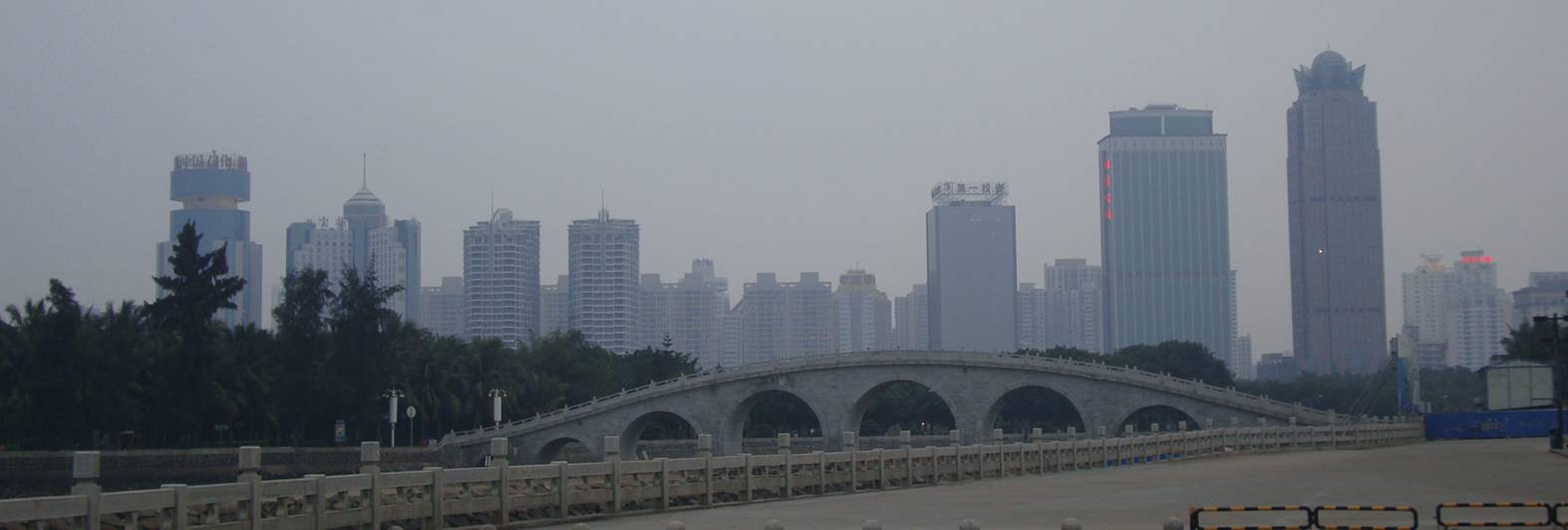
Chinese of the Day:
刀子嘴 豆腐心
(dāozi zuǐ dòufu xīn literally "knife mouth, tofu heart") bark
worse then bite
January 23, 2011 Haikou
on Hainan Island
We're on our winter vacation from Jiangnan University.
Haikou means "sea mouth", and as the name implies the capital
of Hainan Island is a port.
A tropical port. We've come here primarily to visit our dear friend Xiao Hua, but
incidentally to escape the snow and cold of Wuxi, which today has a high
of 4°C and a low of -2°C. Haikou is currently not beach weather,
but the high and low are both in the teens. High: 17°C Low: 13°C.
Light jacket and sweater weather. Delightful.


Xiao Hua and her charming Irishman have been incredibly good hosts.
Baby Padraig has been at the grandparents, and we've hardly seen him.
He didn't take to me anyway, being at that age when babies "make
strange".
It was so pleasant to be met at the airport, with our
hotel all arranged. A good place to land, but not conveniently
located and a bit expensive. We stayed in that hotel for three
nights, then moved in with Patrick, making full use of his wifi
connection, for four nights while Xiao Hua flew away to take care of
some business. With the family gathering for Spring Festival, the
private homes will get crowded so we've moved into a hotel again.


Our
room is fully electrified, with a flat screen TV, two iPads and two
laptops. All that's missing is our dog, and I certainly do miss her.
We get daily reports from our dog sitters, so that's a comfort.
And
what a hotel Xiao Hua has found for us - a big room. Big double
bed. Very clean. TV and an Internet connection. Nice
western style bathroom. And priced a very affordable 108 RMB per night
(16.30 Canadian) with
one day out of every six free. That's a hotel price for a good
room, or any room for that matter, I haven't seen since the fifties.
Patrick has generously lent us one of his laptops,
which has captured a lot of our time because it's loaded with Rosetta
Stone, the best Chinese language teaching programs we've found so far.
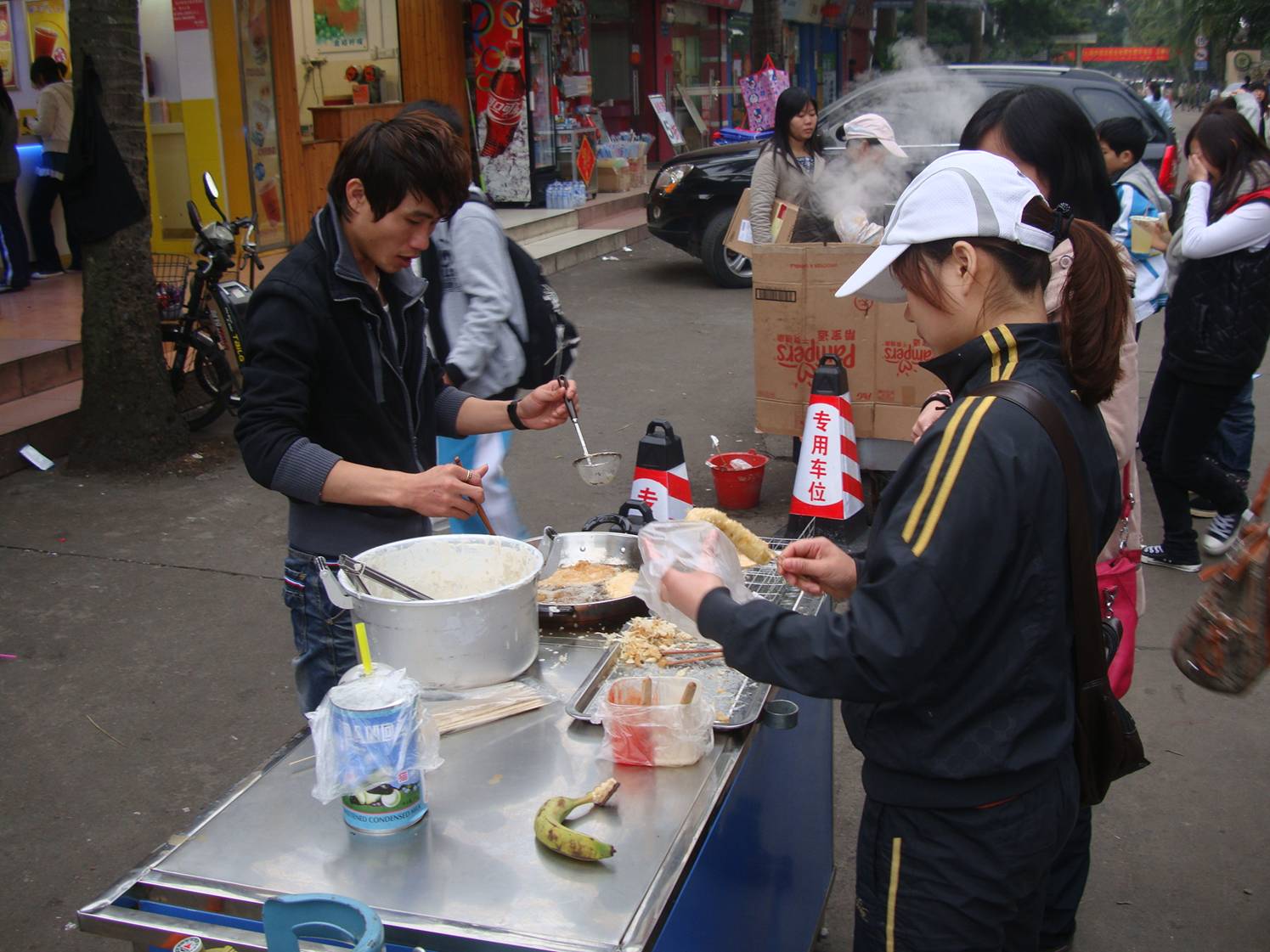

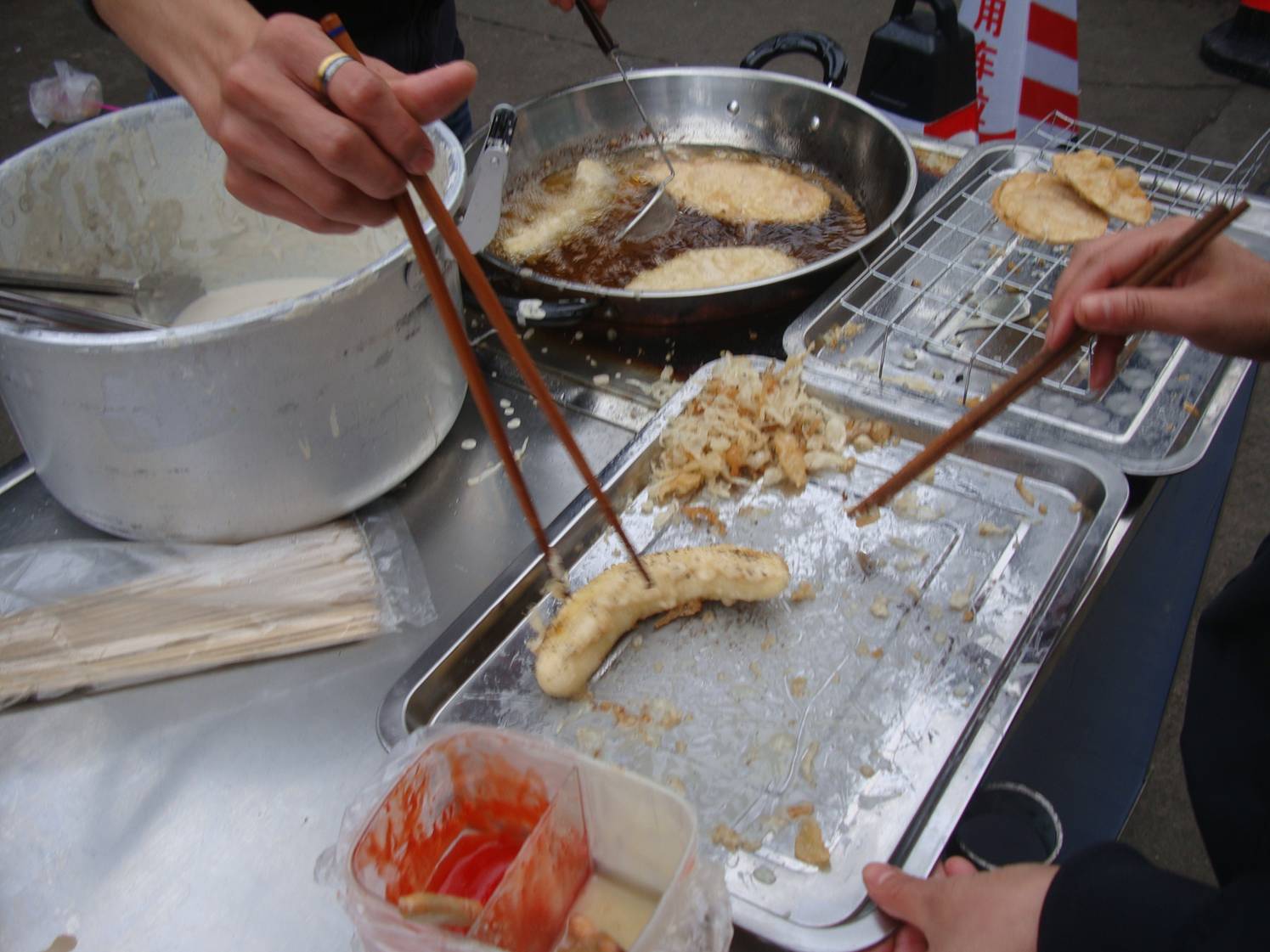
Our
hotel is located between the two gates of the Hainan Normal University,
where a wide variety of street food is available. The deep fried
banana pictured above was delicious. Unfortunately, that
particular vendor has not been back for two days. That's the curse
of mobile locations.
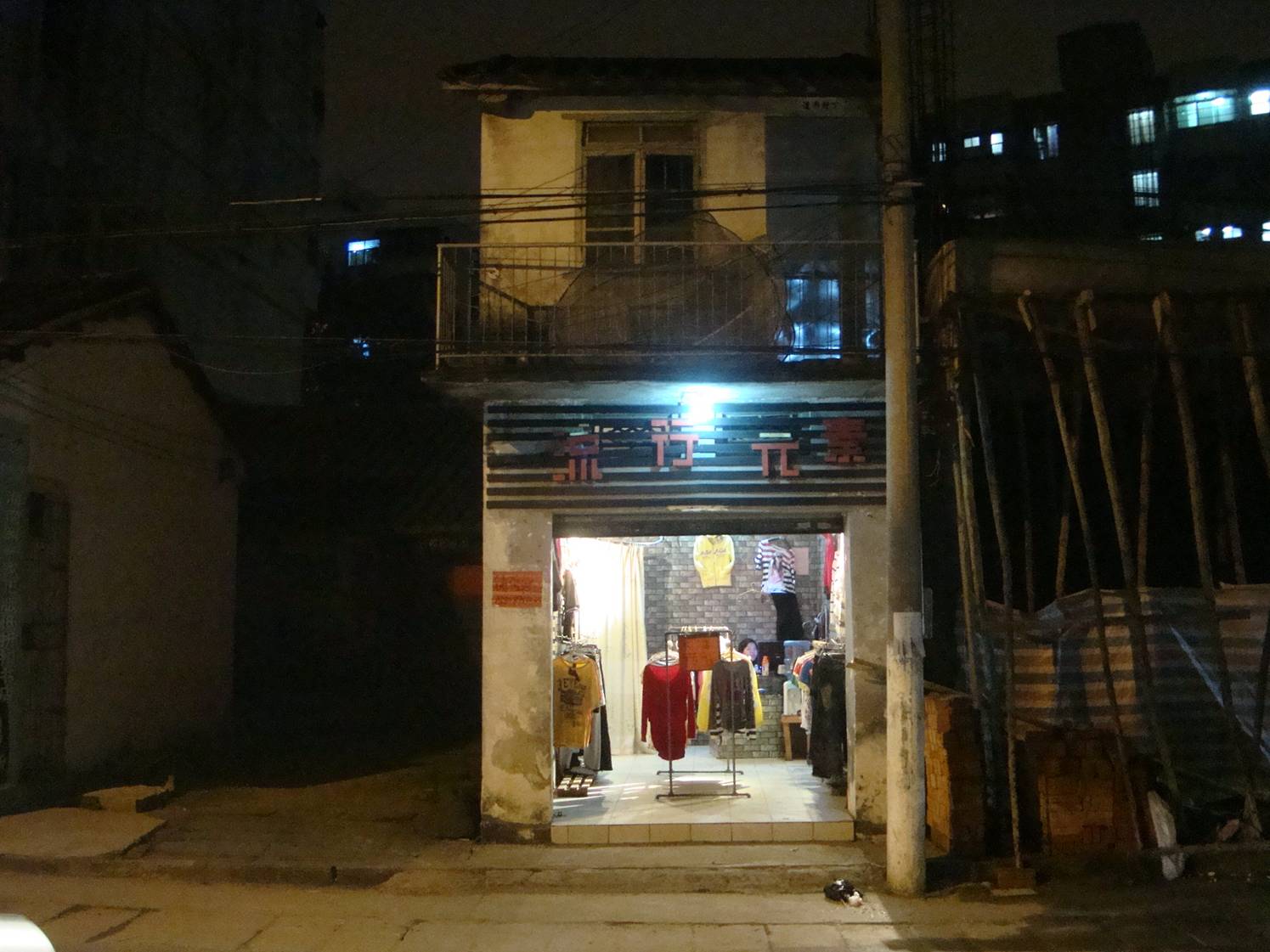
I
love the texture of this neighbourhood. Streets are a comfortable
width for walking, lined with all manner of small shops, stores, and
restaurants.
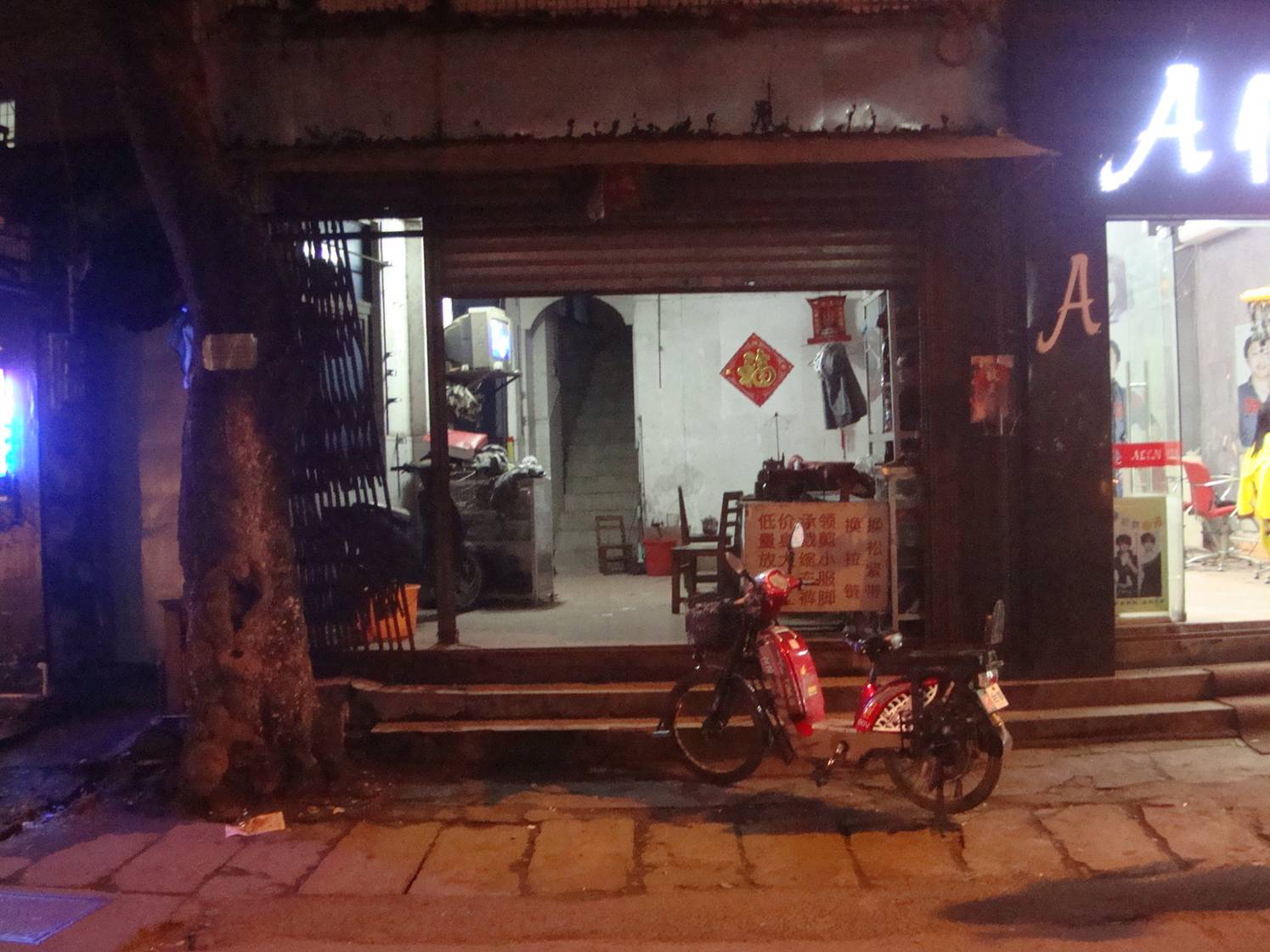

Above
a seamstress waits for a customer. In this tropical climate,
houses are left open to the air until they are locked up tight for the
night.

How
often do you see a REAL snake oil salesman? He was telling the
crowd that his product would cure everything from toothache to water on
the knee.
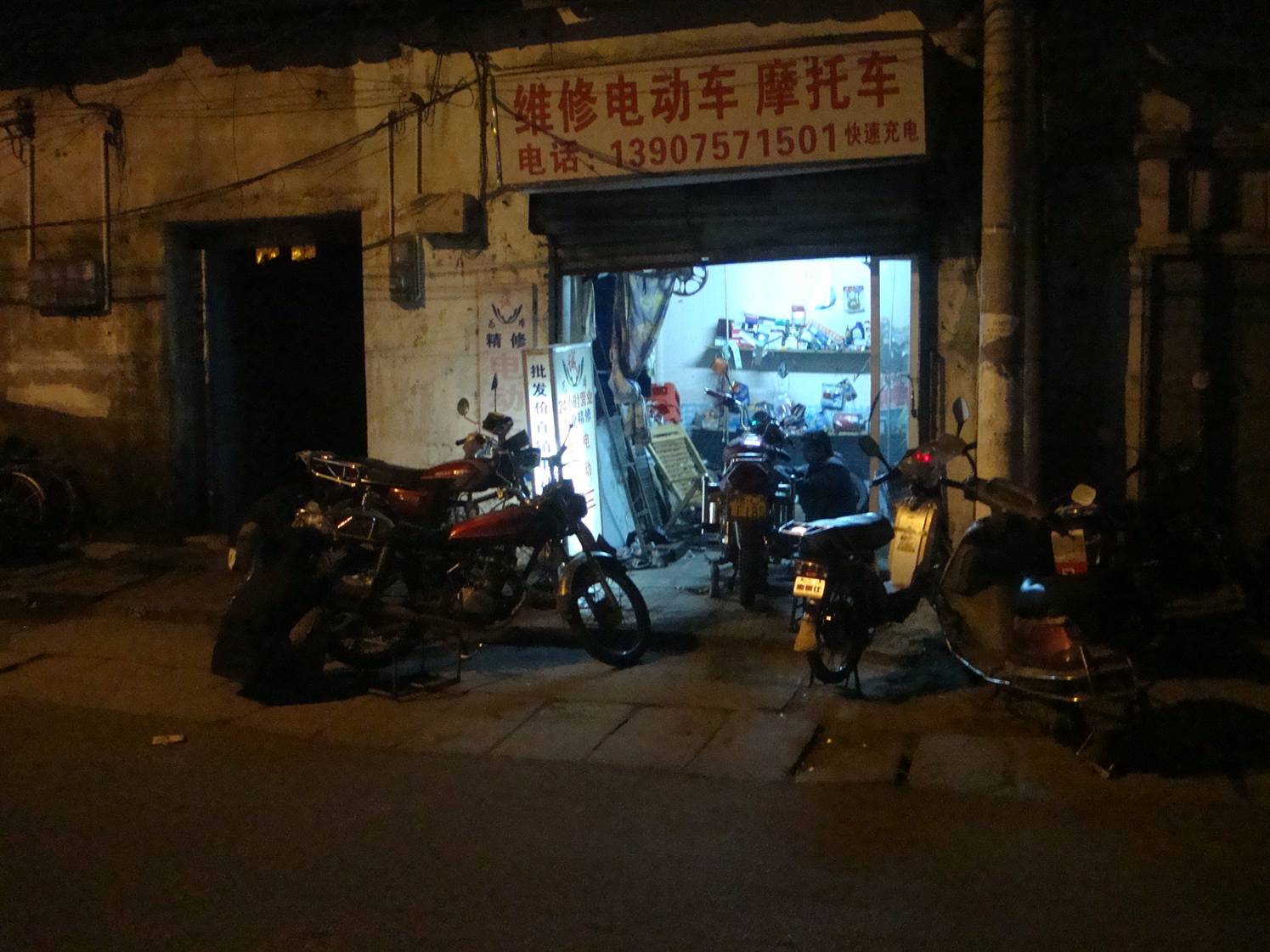
The
motorcycle repair continues late into the night.
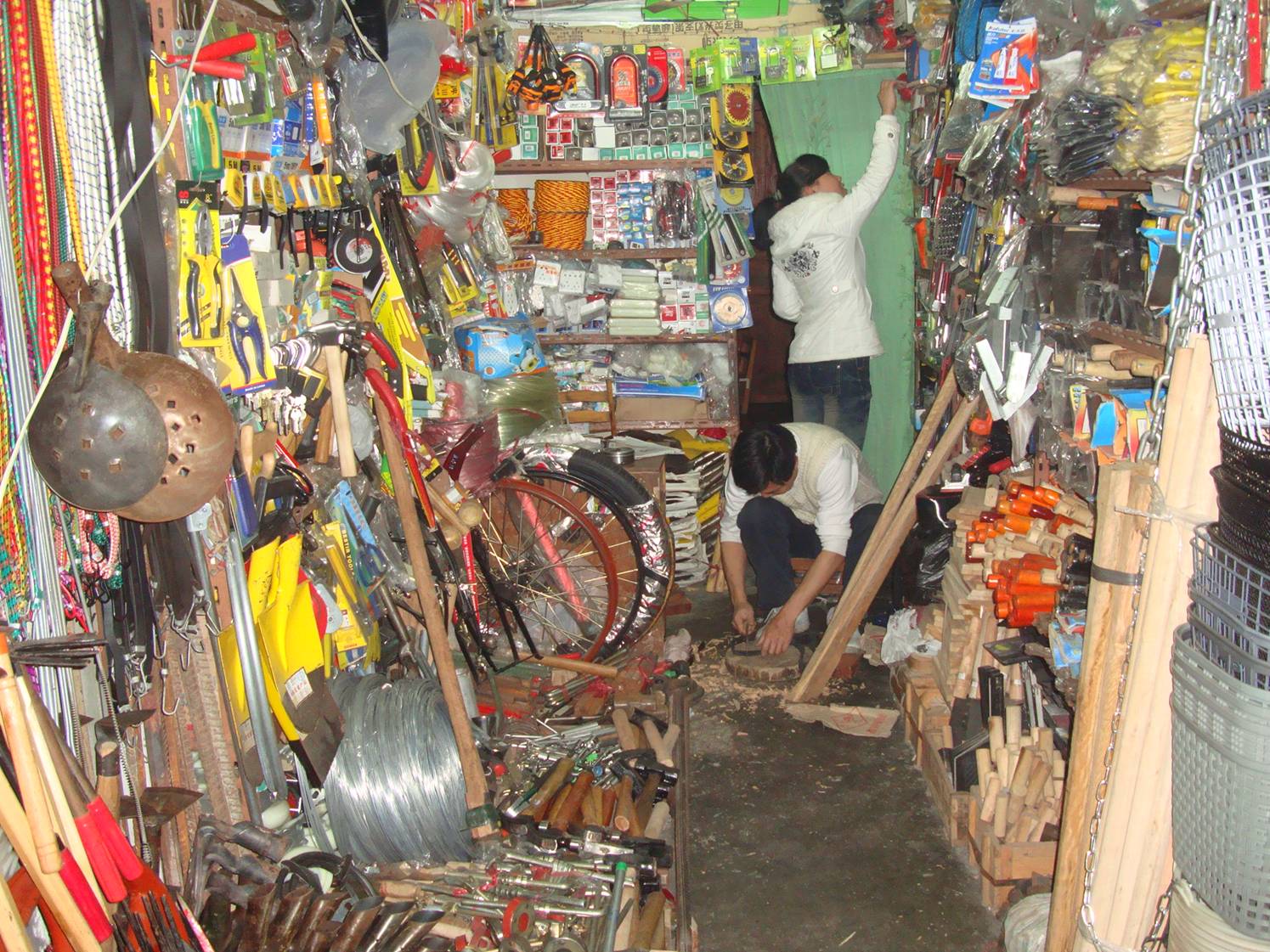
Amid
the clutter of this tiny hardware store I spotted something I haven't
seen since Mexico.
Back
when my family shared ocean front property with rats that invaded from
the rip rap on the beach every winter, we discovered that these traps
were very good for catching small animals alive..
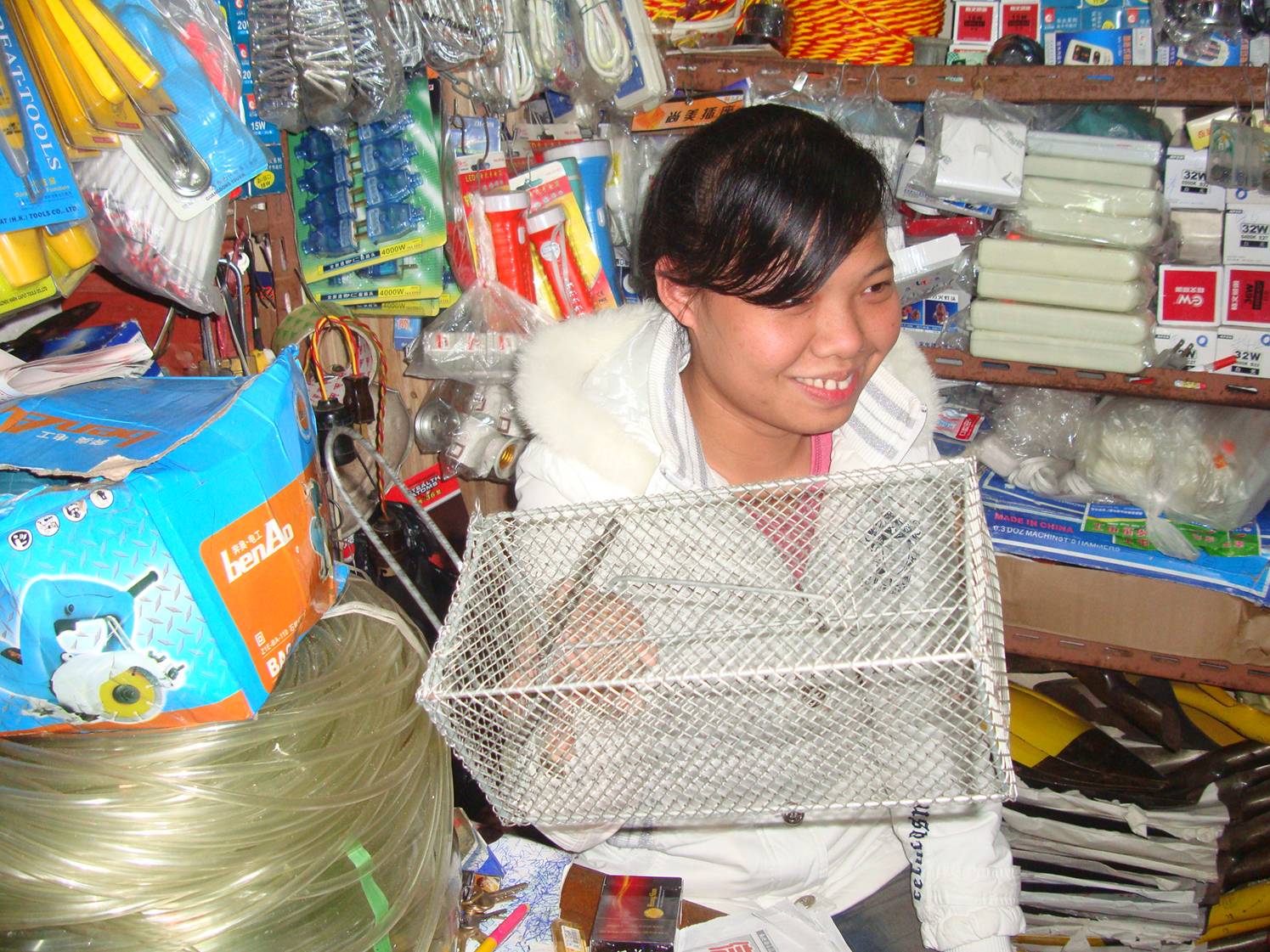

I was
surprised and delighted to see them here, a moment of nostalgia.
Since Ruth saw a mouse in Patrick's bathroom earlier that day, I bought
a trap. 7 RMB. That's about a dollar. These things are
hand made, and how anybody makes any money making and selling them is
totally beyond me.
I was looking forward to introducing Patrick to these
marvelous mouse traps, but it turned out he already owns a couple of
them and has been doing a catch and release program with chipmunks on
his balcony.

Toy guns are us in the crowded night market.

During the day, the streets are thick with shoppers, most of whom
got to the market on an e-bike.
There
seem to be more e-bikes here than in Wuxi. More like in Vietnam.
Many
teens have fitted their e-bikes out with extremely loud boom boxes.
You can hear them coming for blocks, and the thudding bass is like blows
to the body as they go by. Isn't it ironic? We develop a
perfectly silent motorcycle, and the trendy kids make them into noise
pollution.
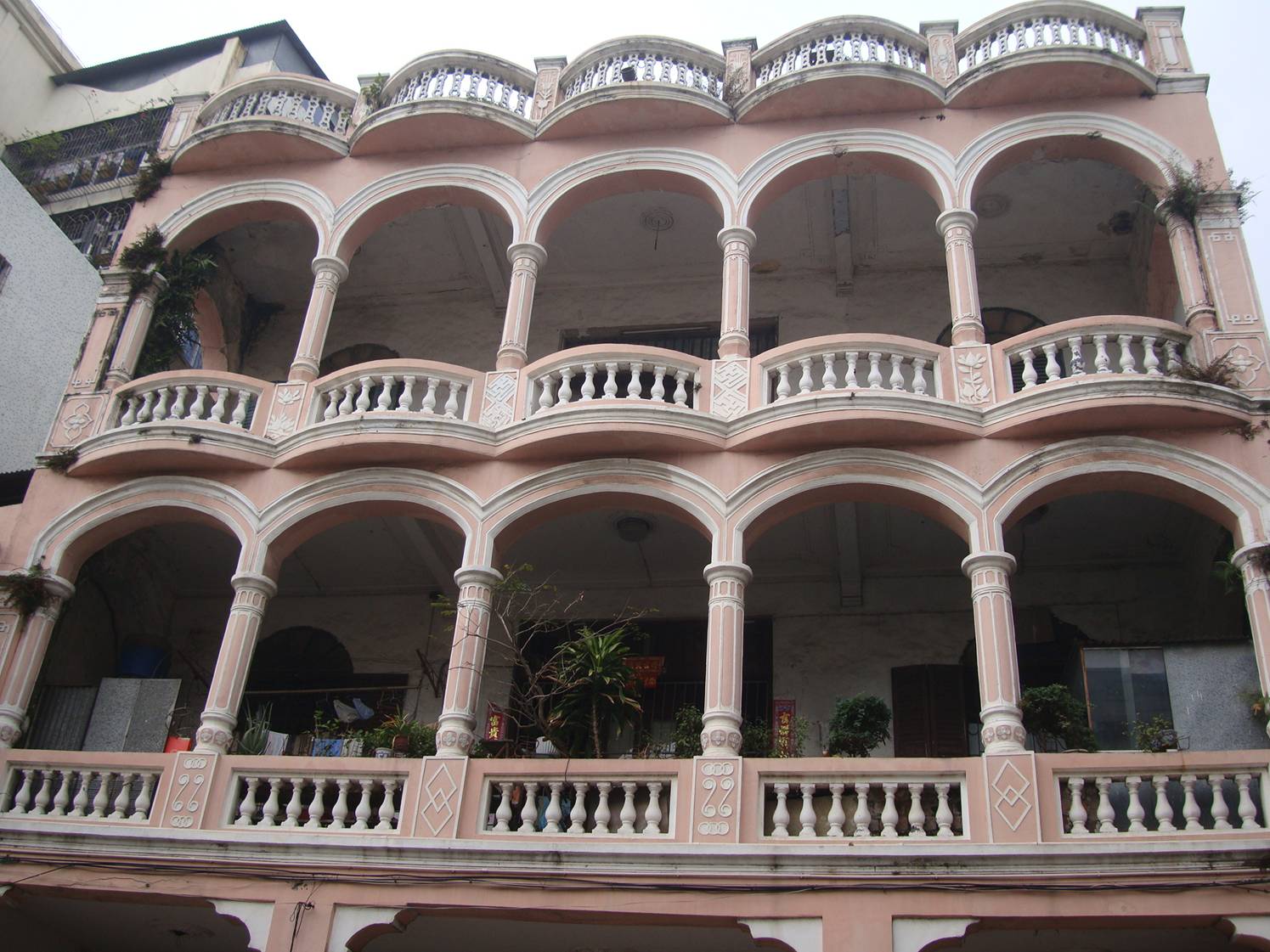
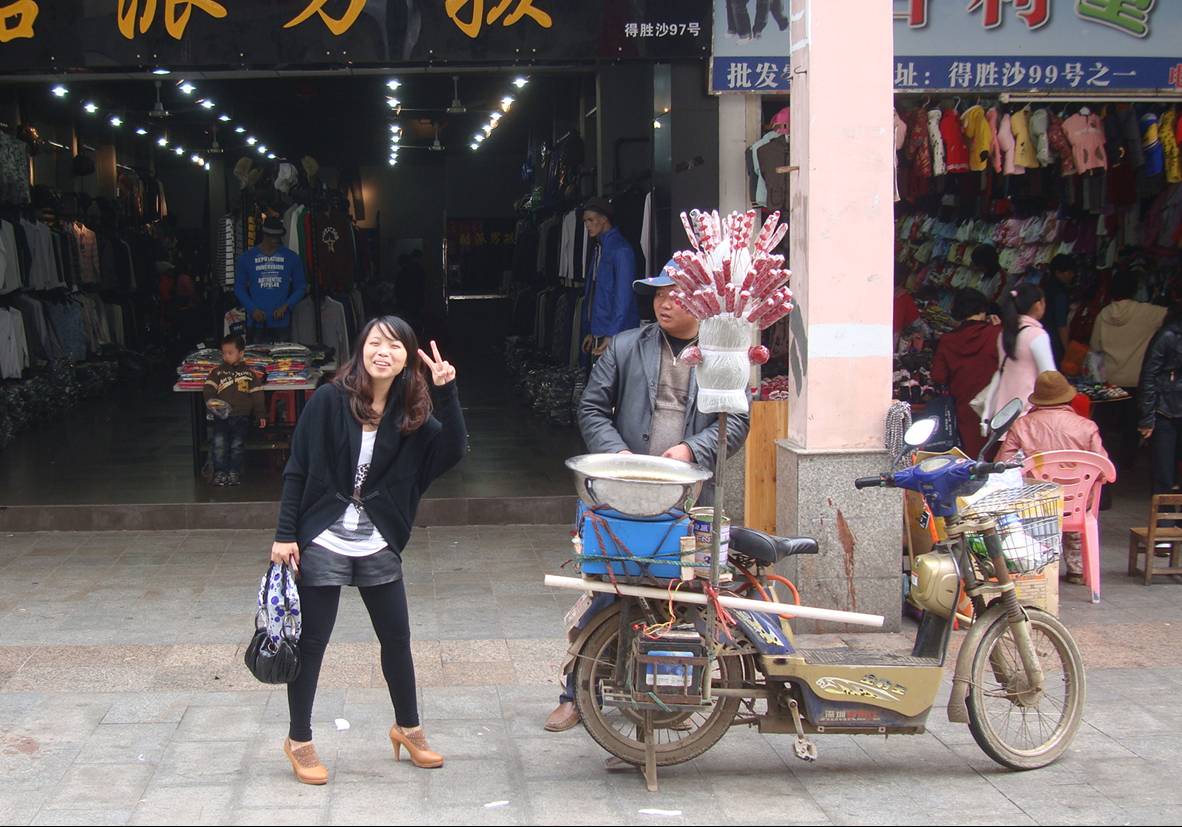
I was really after a picture of the candy apple salesman, but the camera
hog jumped into the shot with the traditional Chinese girl pose.
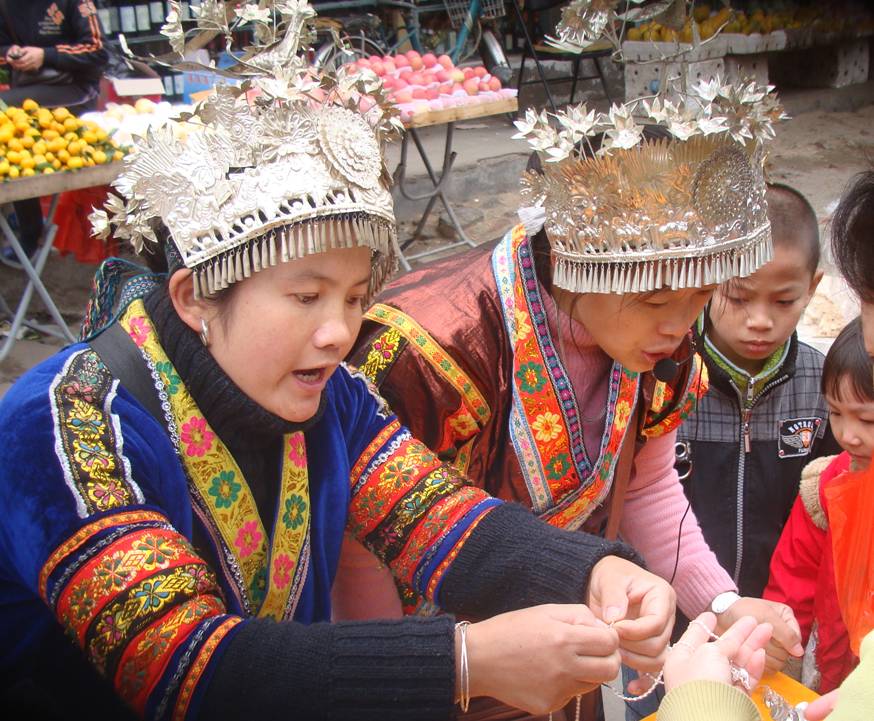

The ethnic minority girls were doing a brisk business selling silver
bracelets and ear rings outside the university back gate. I bought
a pendant. Her asking price was 120RMB, but I'm sure I still
overpaid when we settled on 30RMB. I figure the girl has to make a
living.
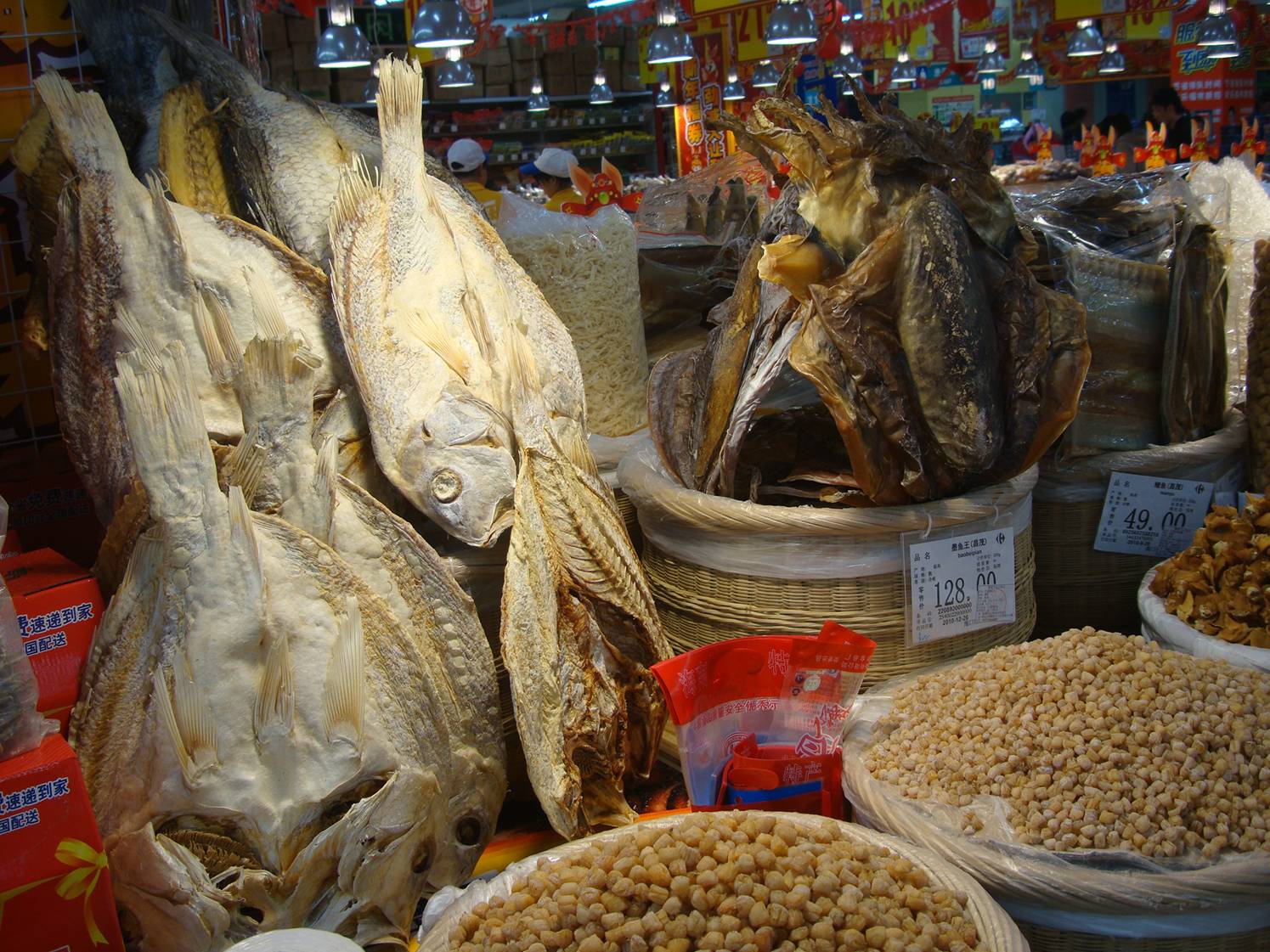
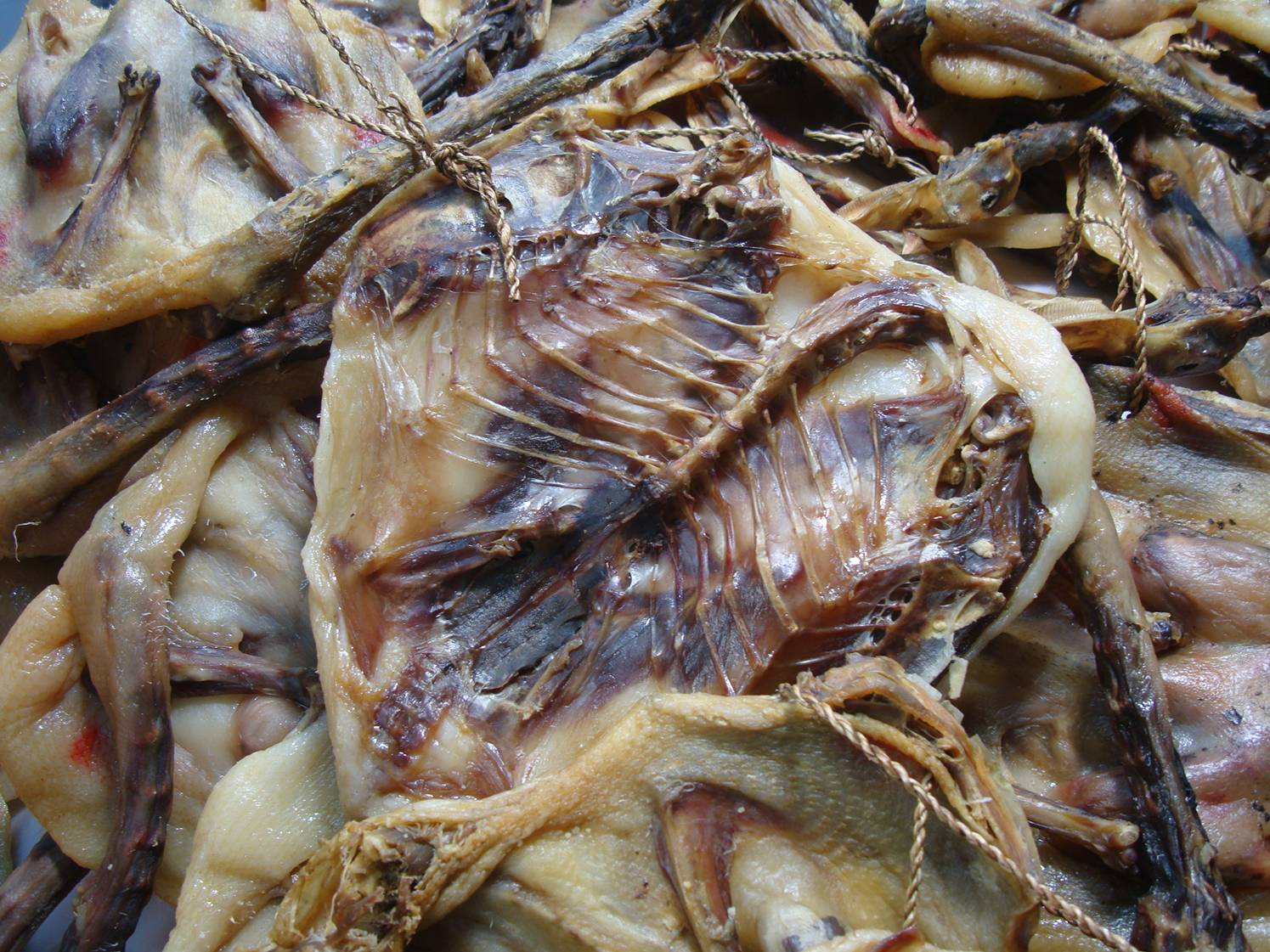
The textures continue inside the modern supermarket where these large
dried fish were offered for sale. We affectionately named this
style of dried chicken "road kill".

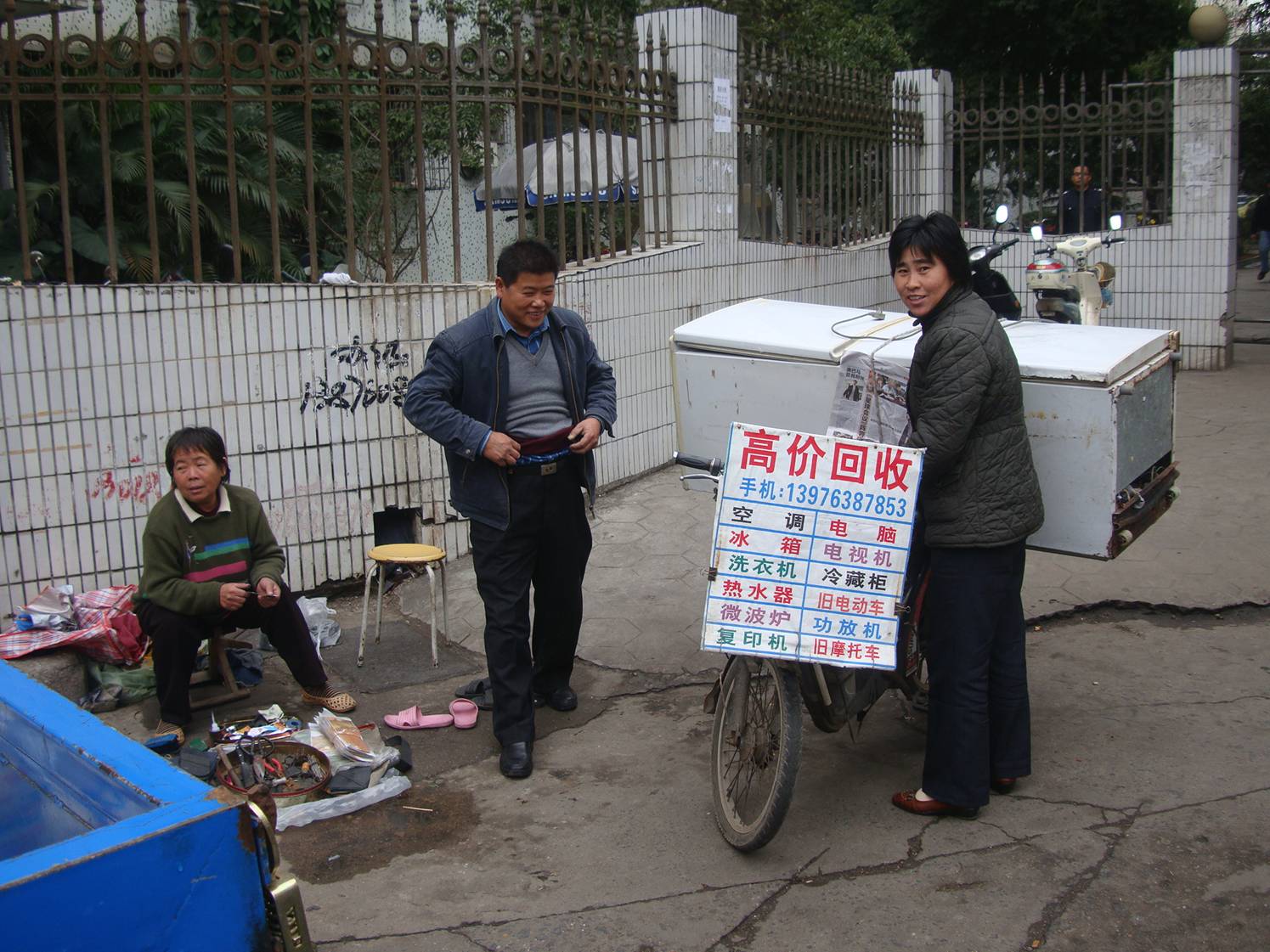
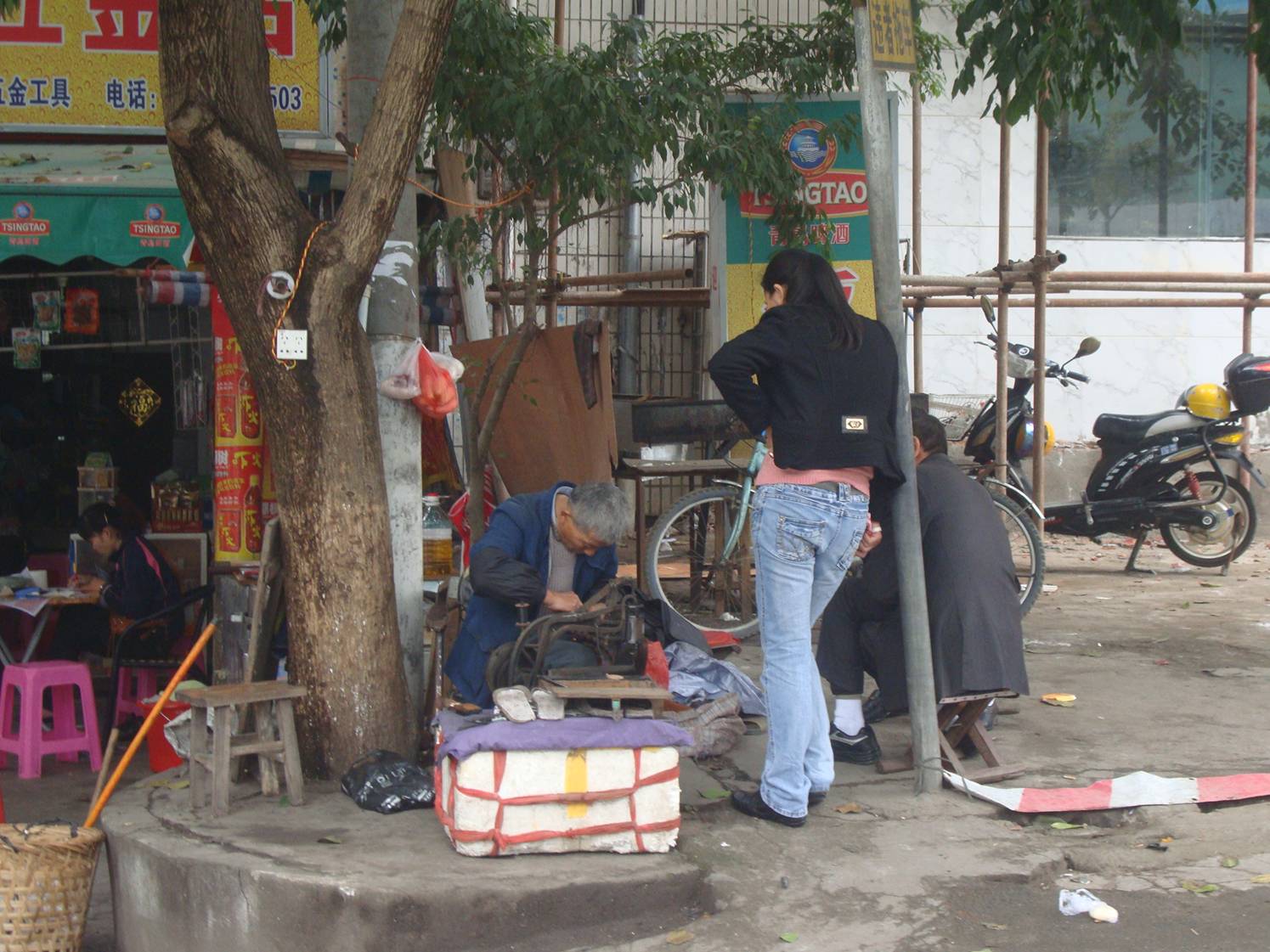
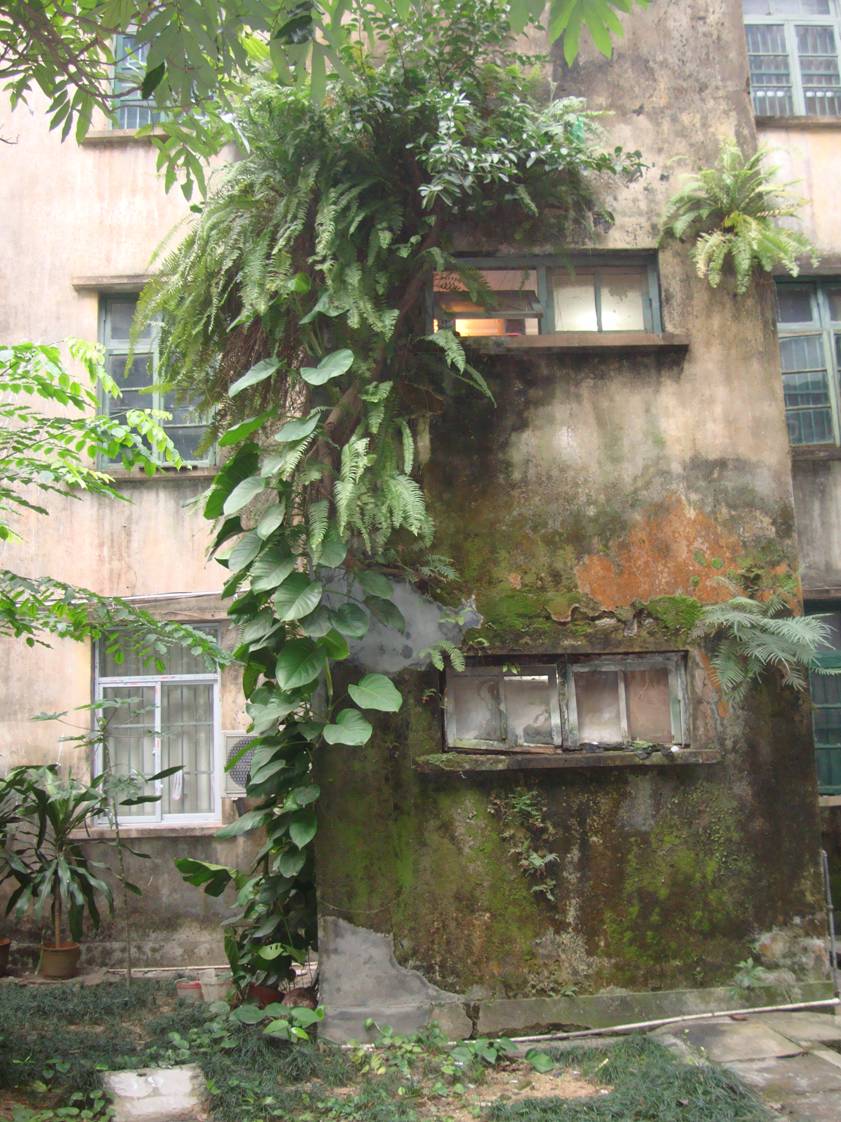

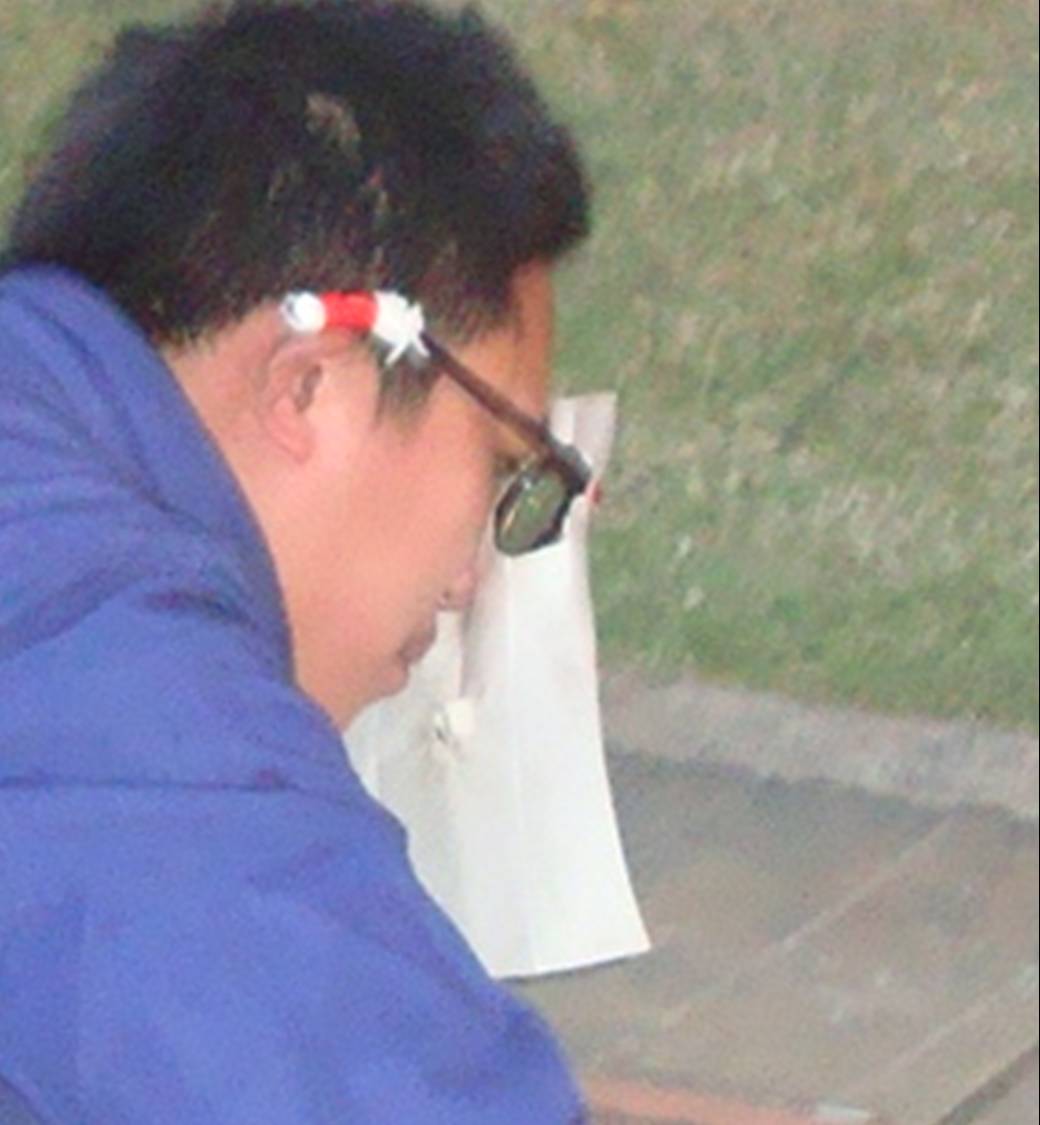
This
welder was at work in the park, building decorative arches for the
coming festival. What caught my attention was his face shield - a
piece of paper hang on a pair of sun glasses.
Comment
on this Post

Chinese Word of the
Day:日程表
(rì chéng biǎo literally day+ procedure + table/list) = n.
schedule; agenda
January 13, 2011 My New
Teaching Schedule
Jin Bo, our
wonderful administration liaison,
just
gave me my new
teaching schedule. So now I know what I'm doing next
term. As usual, visitors to my classes will be welcome.
We went downtown to find a new camera for Ruth, in
preparation for our trip to Hainan Island, and picked up our bus tickets
to the airport for Saturday. I finished my paperwork, and got the
marks off to Jin Bo. Everything is falling into place.
Saturday we fly away to warm beaches and old friends. What a life!
Comment
on this Post

Chinese Word of the
Day: 春节
(Chūn jié) n. Spring Festival (Lunar New Year)
January 09, 2011
Tickets Booked for Hainan Island
I've got just a bit of data entry and paperwork to complete and this
term is finished. It's been a great semester. Now we have
our tickets booked for a winter vacation in the Hawaii of China, Hainan
Dao (Hainan Island). This will be our third visit to Hainan, and
we've enjoyed it immensely each previous trip. The city of Sanya
on the Chinese New Years Eve is simply the best city wide party I've
ever experienced. Lots of people, but not crowded. T-shirt
warmth. Miles of beaches where families bring their kids to set
off fireworks and the whole city explodes in colour. Not a drunk
or nasty scowl in the whole crowd. Just people having fun with
their kids.
This trip will be
especially fun because we'll re-unite with Xiao Hua, the
wonderful young English teacher we met on our first trip to Hainan.
On that first trip, Xiao Hua's family invited us to visit the "family farm" which they made
sound very humble but which turned out to be a 5,000 employee rubber
plantation with its own village where her father is the chief of police. He
picked us up at the bus station in a big shiny police SUV, then put us
up at no charge in a suite in the private hotel, built for visiting
dignitaries, beside the police station.
We were treated like royalty.

We last saw our friend when we walked into a bar in Nantong, to be greeted
by Xiao Hua shouting "Ruth!", one of the great improbabilities of life.
In a country the size of China, what are the chances of walking into a
bar in a city where neither of us had been before to be greeted by an
old friend from another distant city? I wouldn't believe it in a
movie plot. Following our memorable first visit to Hainan, Xiao
Hua had met and married a man from Ireland, spent a year on the Emerald
Isle, and returned to China just in time to bump into us in Nantong.
Then we heard that they had moved back to Haikou on Hainan for the birth
of their first child, a boy named Padraig. Needless to say we're
all excited by the prospect of seeing them again.
Comment
on this Post
Introducing a Chinese
Friend to Japanese Food
Carolyn, our Chinese teacher for this past term mentioned that she
didn't like Japanese food. That inspired Ruth to invite her to our
favourite Japanese restaurant as a thank you for giving us such great
classes.
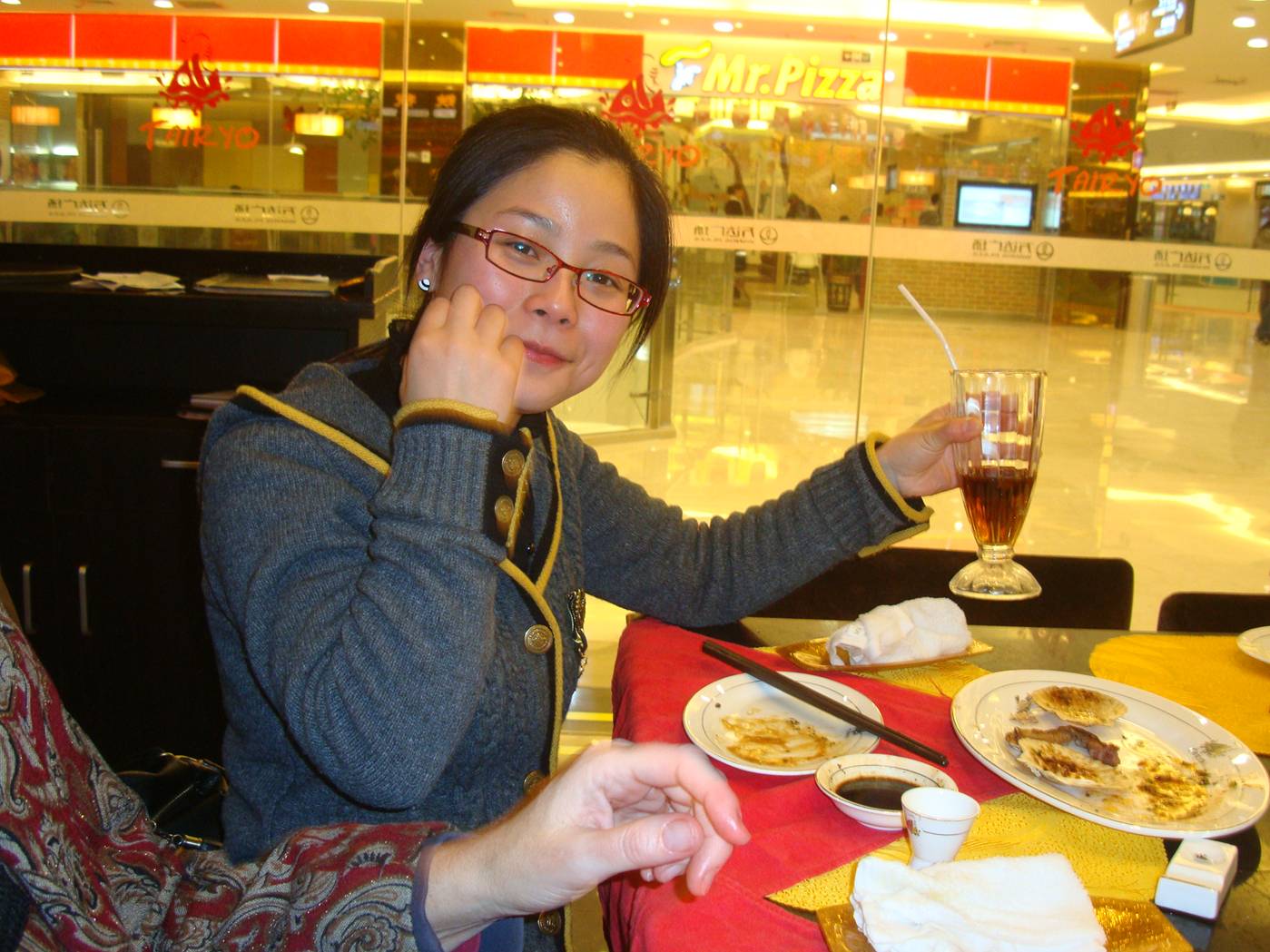
The Teppanyaki restaurant in the new Wanda Plaza is part of a chain.
They grill the fresh food at your table, and have an all you can eat and
drink special for 150RMB ($22.50 Canadian). Very steep for China,
but a bargain given the quality of the food and the amount of sashimi
and sake I can pack away in one sitting. Carolyn reports
that she now likes Japanese food: "I really enjoy this wonderful
meal tonight and now I can tell my friend that I love Japanese food very
much!
Just as Ruth said, one has no right to make some comments on food before
tasting the real. That's absolutely right!"
Ruth and I both feel so worldly compared to our young
Chinese friends. We've visited many countries on several
continents, and experienced much more variety with all the different
cultures. It's so much fun when we can introduce a friend to a new
experience.
Comment
on this Post
A Visit from Panda
On our way to the Blue Bar downtown last night, Ruth and I marveled at
the variety of people we meet here. We were just about to connect
with Sherif, a young Muslim man of Egyptian heritage born and raised in
France. At the pub we met Richard, an acoustic engineer from America working for a
car company here, and his wife Pam, a teacher. Then when we
returned home we found our young friend Panda already there. She's
now a nursing resident in Changzhou, twenty minutes away by fast train, but
she managed to get a day off to visit us before our holiday trip.
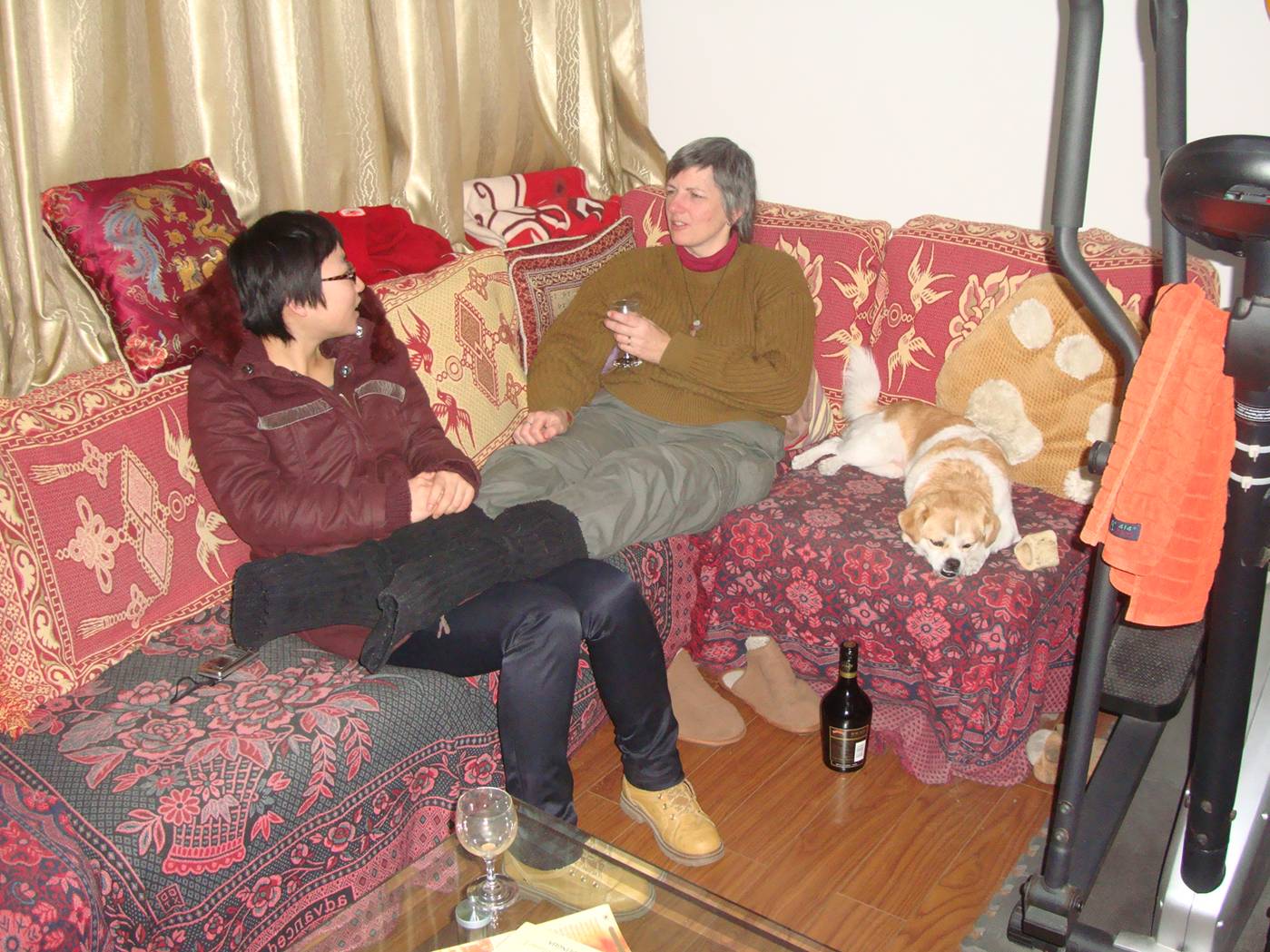
Panda, who
might want to visit our dog while we're away,
got a chance to meet the Tibetan students who will be watching our
apartment and caring for GouGou in our absence.
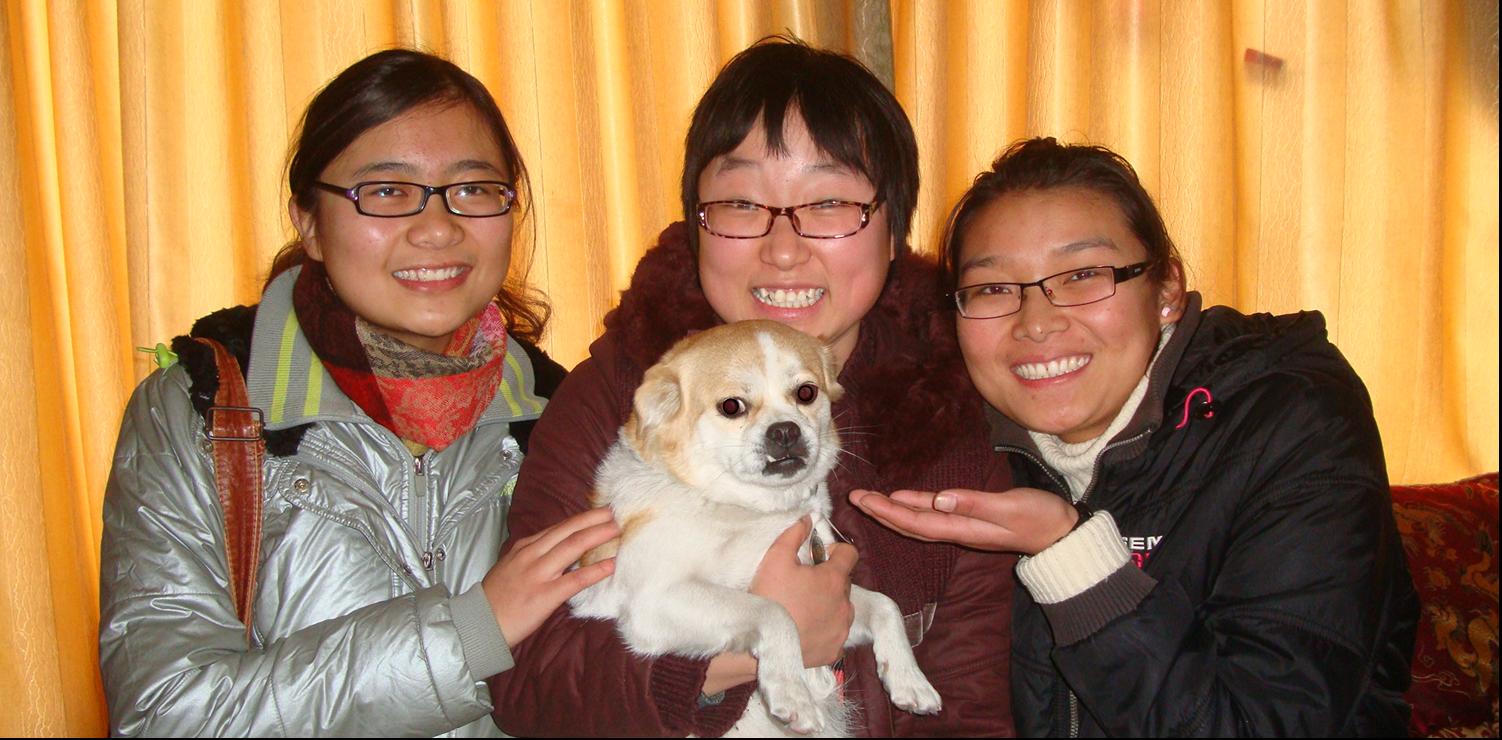
We feel so fortunate to have found the friends we have here. They
make our lives pleasant and easy. They take care of us. But
also they add so much interest and variety to our experience of people
in general.
Comment
on this Post

Chinese word of the
day: 假期
(jià qī literally "borrow" + "time") n. holiday, vacation
January 2, 2011 (yikes)
New Look for the New Year
Okay, this could be called vanity, but actually it's more like a morbid
fascination with the aging process. I want to age gracefully, and
I've never felt like the best looking dude in the world. But
this... ouch.


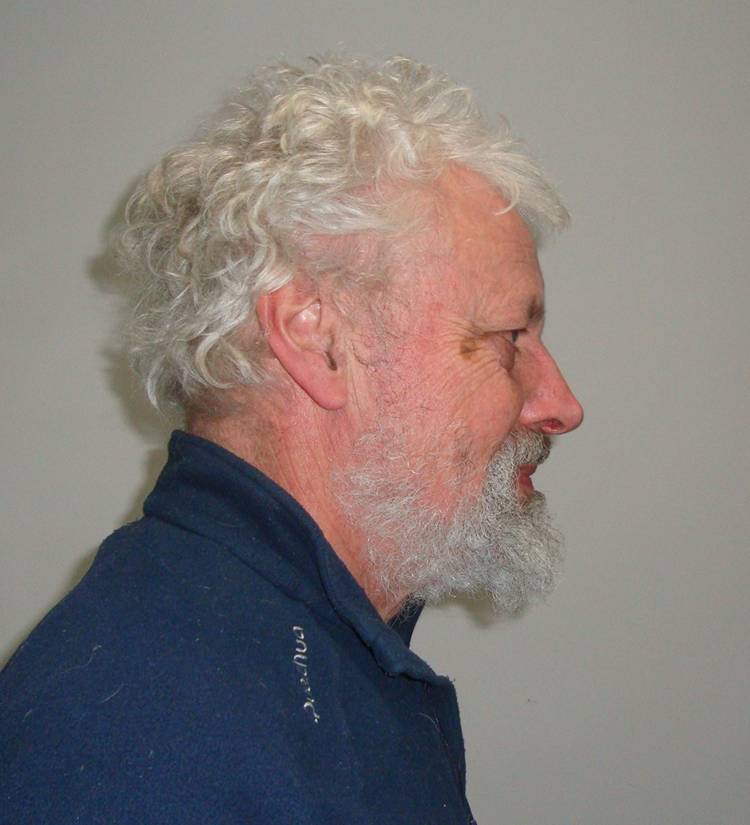



How could I know that nose hairs only show up when I smile?





In our culture, men are not supposed to care about how they look.
Especially as they get older. I suspect this leads to a lot of
denial. I suspect that most men do care. I, for one, don't really
like watching my face fall apart. It's not too bad when I'm
smiling, but stop smiling and I turn into Herman Munster. What is
important, of course, is health and energy and mental acuity, which
fortunately I still seem to have in abundance. (Okay, some might argue
about the mental acuity, but I do manage to win the occasional Chinese
chess game, so my brain must still be functioning at least on the
analytical level.) I could do without the blotches, the nose and ear
hairs, the beginnings of a turkey wattle neck, not to mention the other
ills the flesh is heir to like tooth aches, back pain, sore joints, and
the accompanying sensory feedback that comes from owning a body no
longer young and perfect, if it ever was. Is my feminine side showing,
guys?


Who needs human texture. I'd be happy with a plastic complexion.
Body builders have a motto: No pain, no gain. My motto is
slightly different: No pain, no pain!! And as for appearance, I
think I'd really like to look totally plastic, like Max Headroom.
I'd even be willing to put up with the oc-oc-oc-oc-oc-oc-occasional
glitches in the playback.
Comment
on this Post
I Love Chinglish, but
really....
Osteosarcoma
on the menu is going a bit too far.

We noticed
this on the table of the International Cafe here on campus. Great
French fries, and pretty tasty niurou mian (noodles with beef), but I
think I'll pass on whatever is in this dish. How can such a word
gets on a menu when
Wikipedia describes it thusly:
Osteosarcoma is an aggressive cancerous
neoplasm arising from primitive
transformed cells of
mesenchymal
origin that exhibit
osteoblastic differentiation and
produce
malignant
osteoid. It is the most common
histological form of primary bone cancer.
What
translator was the author of this menu using?
Comment
on this Post
Tibetans Bearing Gifts
We'll
have our last Tibetan English Club meeting this evening. Getting
this club started has been another very gratifying experience for us.
The Tibetan students are painfully shy, and naturally quiet verging on
silent. But they've been working hard to improve their English,
and yesterday a delegation from Tibet showed up to express their
appreciation.
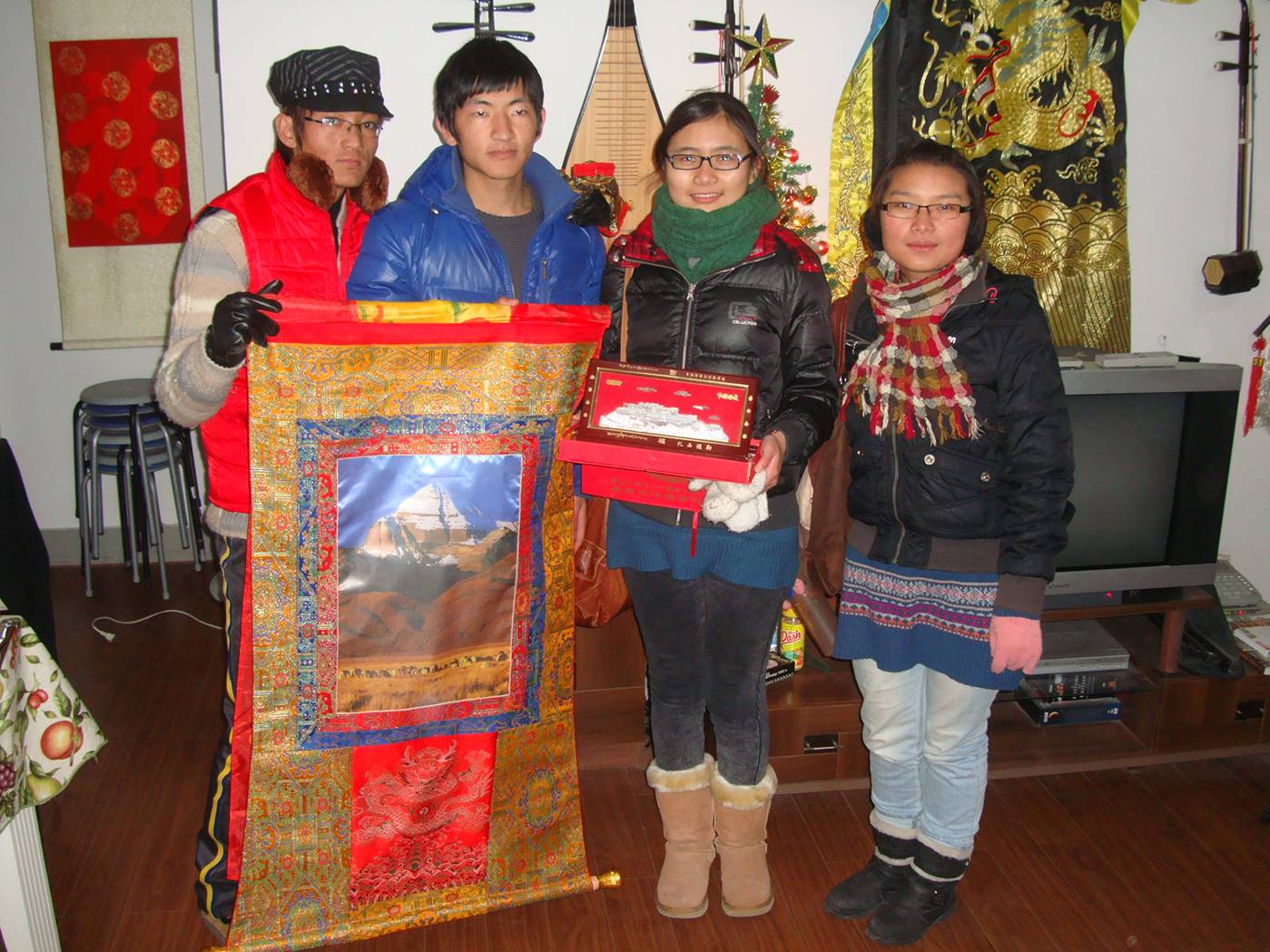
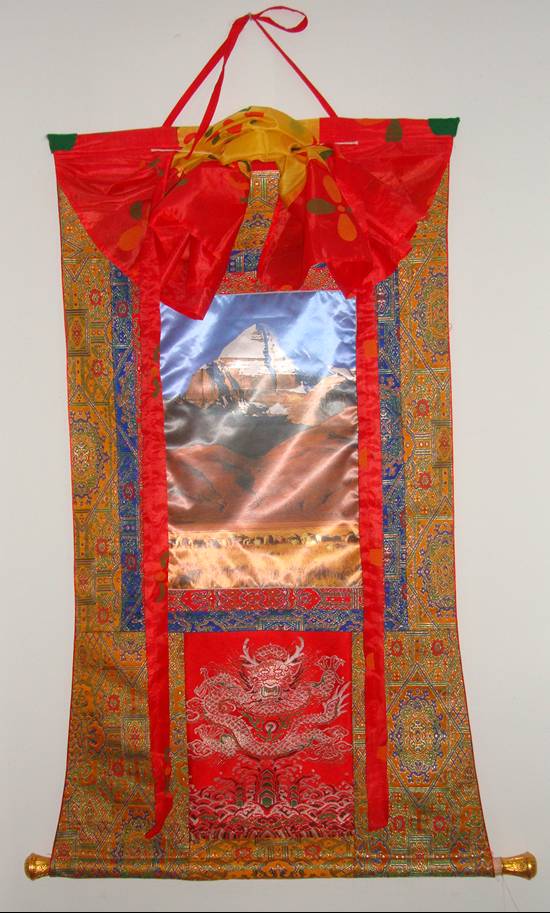
Our
Tibetan English club members with a couple of truly awesome gifts.
Wrapping Up Another
Term
We've finished our classes. Now I have a stack of exams to mark
and some data entry work and we can be on holiday. Once again
we're thinking of heading south to Hainan Island. Our friend Xiao
Hua and her Irish husband have a baby now, and we'd like to visit them.
Also, Rob might meet us in Sanya for a few days. I love Sanya on
the Chinese New Year. Best party I've ever attended. The
whole city explodes with fireworks. It's a family event.
Kids and smiling parents everywhere and miles of white beaches for the
fireworks to launch from. You'll get a report.
Comment
on this Post
Time for an iPad Review
We've had our iPad's for a couple of months now. So how do they
rate? Here's my pros and cons on this amazingly popular gadget.
I don't own an iPhone. (My friend Rob does, and reports that his
iPhone 4 is, in his words "useful for the apps but a piece of crap as a
phone".) So the iPad was my introduction to the touch screen tablet
concept.
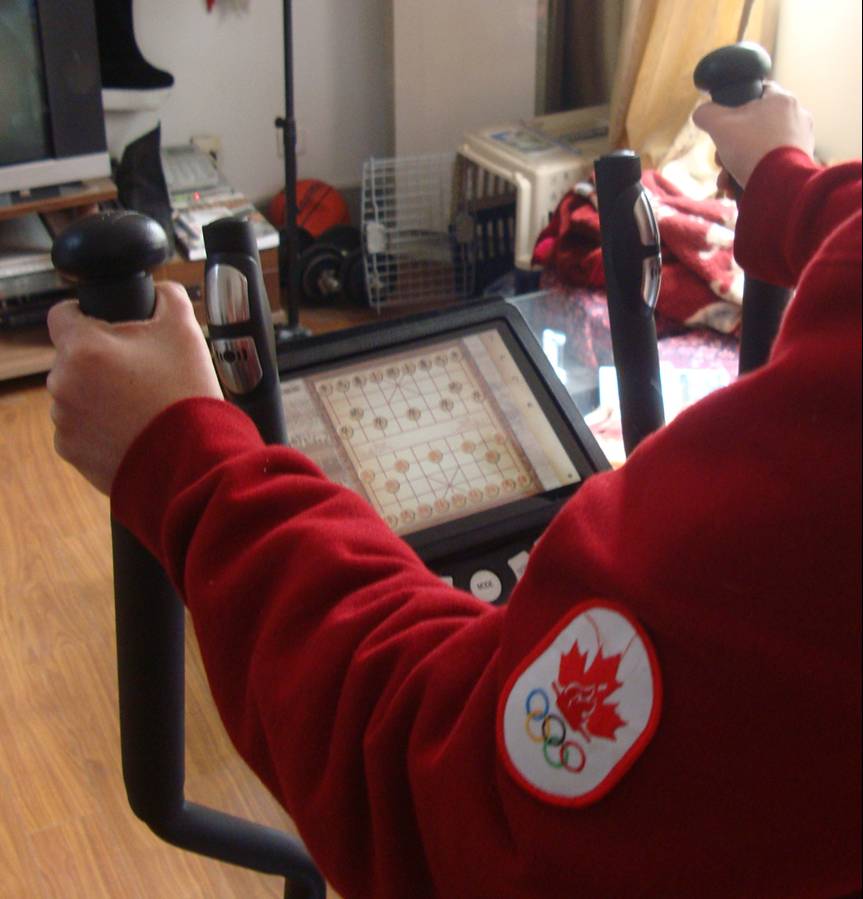
|
Pros
1. We're using it all the time.
2. The Chinese chess application is really great. Now
I can play with myself all day.
3, The Anki application is also great. Anki is a flash
card program that uses review based on your learning patterns to
make memorizing things more efficient. Think of it as a
souped up flash card program. We use it daily.
4. The iPad in its case sits nicely on our elliptical
trainer, so I can read a book without a problem with the pages,
or play xiang qi (Chinese chess). Makes a half hour of
sweating fly by.
5. It's lighter and more convenient than a laptop.
6. It seems to have a fantastic battery life.
7. Really great bright screen the perfect size.
8. The version I have won't multi-task, but the apps open so
quickly that this doesn't bother me.
9. I've found the Keynote app (a PowerPoint clone) to be a nice
way to pitch a concept. This is a mixed blessing. (See #7 on
the cons list).
10. The Pleco app is
very useful, because we can draw in a Chinese character and
quickly identify it. Ruth was beside herself with delight
over this feature. (I still miss Wenlin, which will only run on a
PC).
|
Cons
1. Everybody in China "jailbreaks" (installs a hacked operating
system) their iPad. You know the big boss is a control freak
when an entire country modifies the software as soon as they buy
the machine, just so it will do what they want to do with it.
2. There's no simple way to store files, and know where they are
stored. They seem to be filed with the applications
themselves, instead of in some kind of folder system. Even if you
install iFile, which you can do after you get the jailbreak
software installed (see 1) it's not easy to find, store, or play
files.
3. My childhood was full of reprimands for touching glass.
Don't put your fingerprints on the window. Don't touch the
display case. No matter how clean my fingers are, my
iPad is always greasy with prints. I'm trying to get used to
this, but it's a deep seated aversion that goes way back.
4. I'm a very fast typist. I type almost as fast as I
talk. But not on a touch screen. You can get a
keyboard for the iPad, provided it's been jailbroken (see 1).
But then what you have is a laptop with a separate screen. I
haven't invested the big bucks in a keyboard yet, and I'm not
about to start the Great Canadian Novel on the touch screen.
5. No flash. Steve Jobs thinks he can kill that
application because he's so big and powerful. It's annoying
that half the stuff on the Internet won't play because of a
corporate market share grab.
6. No Windows Movie Viewer that I can find that works.
I'm sure one is out there, but that's also annoying. So many
little clips people send me won't play, or play out of synch.
7. The Keynote app is okay for showing PPT presentations that I
made on my PC, though the animation isn't the same. It's a
pain to work with if I want to change a presentation.
8. iTunes, the only way to get software onto the iPad, seems to be
designed for people who grew up with the iPhone. I'm not all
that interested in having tons of music in my iPad, and iTunes is
a long way from being intuitive. It's as if they put all the
brains of the company into the hardware, and left the software to
for geeks with poor communication skills.
9. Everybody raves about Apple. Sorry, folks, it's
just another computer. It can be as annoying as any
other computer, and the iPad would be much more useful if it ran
the same programs I'm using on my PC. Instead of trying to
be exclusive, and locking consumers into using Apple products and
only Apple products, it would make more sense to allow us to do
what we want with the magic machine. That would build real
brand loyalty. As it is, I'm just waiting for some viable
competition to bring machines on the market so I can throw
this thing away. I think Google might be listening.
|
Looking over this list, I see that numerically the pros balance the
cons, but the cons list is longer and they sound more bitter than
the pros. I find it hard to feel affection for this device, the
kind of affection you feel when something keeps surprising you with it's
design and perfection. It's definitely a love hate relationship
for me. But I do use it every day, so it MUST be useful.
There's one gag I want to put together for which the iPad will be perfect. If I can find an application that will let a camera view show
on the screen, I could mount a camera on my back, hang the iPad on my
stomach, and make it look like there's a hole right through me.
What a zombie costume that would make. Halloween next year maybe.
Comment
on this Post
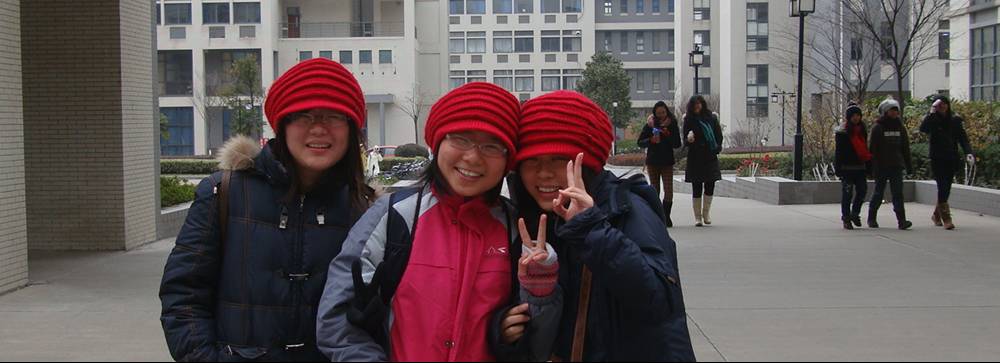
Chinese Word of the Day: 典礼
(diǎn lǐ ) n. ceremony; celebration
December 27, 2010 Fourth Annual
Christmas Bursary Completed
Once again we got the biggest emotional return by handing out small amounts of
money instead of giving each other presents. This year, bursary
recipients bought
warm boots, a warm coat, a pair of jeans, winter boots, a selection of
otherwise unaffordable books, test fees for translation
certificates, and some comfort for grandparents, among other purposes
for the money. We're very impressed that few of the applicants asked for
money for themselves. Most made requests on behalf of friends or
family. The money's gone,
but it was VERY well spent.
Comment
on this Post
A Christmas in China
Story
To make a good story you need events, funny moments, problems,
disasters. This story has none of those things. Thank
goodness. I was worried. This was my first time driving in
China. Finally I made use of my Chinese drivers license.
On Thursday I got our favourite driver to take me to the rental place to
do the paperwork. Then on Friday, Christmas Eve right after class
I collected the car, drove it back to the campus to pick up Ruth and
together we packed up the dog, dog house, dog food and dog toys, a
guitar, a violin, a mandolin, an erhu, and a set of harmonicas, plus two
bottles of rum, a bottle of whiskey, two boxes of cream, (ingredients
for the eggnog) a selection of both Ruth's delicious home made and not
so delicious but acceptable store bought sugar cookies, two packages of
shortbread to go with two bottles of sherry, assorted small Christmas
presents, and enough essential electronics to outfit a space shuttle.
Off we went to Nantong, about an hour and a half away, for a traditional
Canadian turkey dinner on Christmas Day. And from then on it was
uneventful, if you want to call turning out perfect uneventful.



When I picked up the car, the rental agent went over the vehicle and
photographed every little scratch. This became my biggest worry as I ventured into Chinese
traffic. I would much have preferred to pay for comprehensive
insurance, and not worry if the vehicle got dinged. Aside from the
fact that, predictably, the car was very dirty, stunk of cigarettes, and
the ashtray was full, it was a good vehicle. Well, okay, the GPS
gave me a white screen and then refused to do anything at all, including
shut itself off. The ashtray wasn't so much full as seemed to be
missing the lining, but the hole had been used anyway so the butts
couldn't be easily emptied. The passenger side interior light was
burned out, giving me no confidence in the maintenance level. But
it got us to Nantong and back, so what's to complain about.
Nantong traffic is hairy, with rules of the road
considered just suggestions and flocks of e-bikes riding through red
lights and head on into opposing traffic. It's more like driving a
boat in a crowded harbor than driving a car on a road. Great fun
if your nerves can handle it.


The chef hard at work on the candied yams. His two lovely helpers
stir the gravy.


And what would Christmas be without kids. There were two at this
party, this three year old and a very charming seven year old.
Both too cute for words.


This turkey came from Shanghai in a limousine. Only in China.
Ruth is whipping the egg whites stiff for the nog.


Simon (wrestling the turkey) and Lv Min (appreciating Ruth's whipping of
the eggnog cream) were our students five years ago in Weihai.
They're now married, living and working in Shanghai, but we could lure
them to Nantong with a turkey dinner. They'd never had turkey
before. The only turkey we've seen previously in China was in a zoo.

This
is a very large bowl containing the better part of a bottle
of rum, a bottle of scotch, twelve eggs, a liter of milk and another
liter of cream, plus a cup and a half of sugar. It
was potent eggnog, perfect and universally appreciated.

Now that's a turkey. Ten and a half kilograms of majestic bird.
Half of it was enough for ten adults and two kids. We took the
remainder home and will have turkey soup and turkey sandwiches for a
month.

Documentary photographers start young these days.

For the benefit of my students, here's a Canadian turkey dinner.
Components vary, but this is pretty standard.

I'm happy to report that every musical instrument got played.
Carols were sung. Kids were well behaved and very cute.
Granny, seated left on the sofa, seemed to enjoy herself with no need to
speak English or understand the conversation. Small presents were exchanged. All in all, it was our best
Christmas in China. Thanks Rob and Michelle and Kathy and all our
friends who made it possible.
Comment
on this Post
Heading Home:
The highway system here would be familiar to any Canadian or American,
because the Chinese sent engineers to America and copied everything
right down to the colour of the road signs, which are in both Chinese
and English. So driving isn't difficult once you hit the freeway.
But missing a turn off is costly. We managed to miss three on our
way back to Wuxi, twice requiring a very long drive to the next exit,
twelve kilometers in one case, exiting the toll road, paying the toll
again and retracing our path. Also, gas stations are not as frequent or
as obvious as they are back home. We were running on fumes
by the time we made it to the gas station back in Wuxi.

That's a smile of relief. I was happy to get the car back
without an additional scratch or the inconvenience of running out of
gas..

We brought a full half of the turkey back to Wuxi with us. It's
now deboned and divided into sandwich meat and soup stock. We
expect to enjoy turkey for some time.
Comment
on this Post

Chinese Word of the Day: 租
(zū) v. rent; lease
December 24, 2010
The Plan for Christmas
I'm renting a car after my last class today. We'll drive to
Nantong this evening. Tomorrow my old friend Robert is cooking a
Christmas turkey dinner with all the trimmings. Former students
Simon and Lv Min, now working in Shanghai, will join us for Christmas.
They've never tasted turkey. So that will make seven adults and two
kids. I'm renting the car so we can take the dog with us. The
children are three years old and seven years old. It will be like
family.
Barry, another friend, is playing a gig at a bar and wants me to join
him in a jam session tonight. All in all, it's shaping up to be a
great Christmas.


The administration laid on another feast for Christmas. What would
Christmas be without carols on a bus.

The buffet dinner at the Sheraton Hotel. Simply fabulous.
What a dinner. Thanks, Ms. Liu and all the helpers in the
office. You guys are wonderful. And that's all I have time
for today. Dishes to wash, then off to class, and then off to pick
up the rental car.
Comment
on this Post

Chinese Word of the Day: 圣诞老人
(Shèng dàn lǎo rén literally "holy born old person") n. Santa Claus
December 19, 2010
Christmas is Coming
As usual there's been a lot going on. Yesterday evening I played
Santa and handed out presents at the door for an English Flying Bar
Christmas Party. That was fun, but unfortunately their PowerPoint
system wasn't working, so all of my carefully prepared slide show with
the story of Santa, bringing home Christmas trees, mixing pudding, and
all the other icons of my childhood Christmases was wasted. We
sang Jingle Bells for the crowd and then escaped.

Comment
on this Post
Having the Birds for
Dinner
We had fellow
teachers Don and Bonnie Bird over for a western style dinner at our home
on Thursday. Once again I managed to turn out a full meal with our
limited kitchen - ribs with mushroom sauce, mashed potatoes, broccoli, -
and Ruth added garlic bread her famous Caesar salad. Bonnie says she
just can't get the hang of chopsticks, so she was delighted when we gave
her this pair that came with training wheels, a flexible rubber figure
at the top that turn the sticks into tweezers.


Don was suffering from a bad cold, so I introduced him to another
secret of the orient, 罗汉果(luóhànguǒ) n. identified in my Chinese
dictionary only as the botanical name mangosteen. These are kiwi
sized gourds which, when the the hard shell is cracked and they are
soaked in hot water, have an amazingly sweet taste and are supposed to
sooth a cold. Like much of Chinese traditional medicine, I'm not
sure it actually works. But it's pleasant enough to drink.
Comment
on this Post
The American Dream
Comes to China
Last year the word that I investigated was "individualist", which I
found to have a completely negative interpretation in China thanks to
the political instruction. I did my best to explain our connotation
on the word as neutral tending to positive. This past week I
became aware of another bit of confusion. I asked a student what
the American Dream is, and was told "The American dream is to control
the world. Uh...Not quite, though that might be some American's
dream.

It's a shame that it's called the American dream, because it's
is also the Canadian dream, and now the Chinese dream. When
it originated, it was a revolutionary idea. In the old days, a
Russian peasant, for example, knew that his grandfather had been a
peasant, his father was a peasant, and no matter how hard he worked, his
son would be a peasant. But the American dream changed that.
It's the most powerful social motivator ever invented - the idea that
your children can become wealthy and rise above your current social
class. The idea that the son of a worker can become the president.
I illustrate the power of this idea with my son, Victor, who bought a
house when he was only seventeen. It wasn't much of a house,
because he didn't have much money, but he's worked on it every day since
he bought it, some fifteen years ago. Now it's a much better
house, but if he'd been renting he would have done nothing to improve
the place. Ownership motivates. Depriving people of
ownership takes away their incentive to work.
Comment
on this Post
Survival in China for
University Grads
I've read that this year China will release over six million graduates
into the job market. We can expect more next year, and the year
after that when my sophomores graduate. I'm worried for them.
Already, college grads are flooding into Shanghai, Beijing and
Guangzhou. They are known as the ant people. They live in
slums and squalor, and take whatever jobs they can get. I heard of
a job opening for a public washroom guard that attracted applications
from thirty thousand college grads. My students have two and a
half years before they graduate. I'm trying to get them to think
ahead, devise strategy, develop a resume.

The good news
is that China is in transition from a manufacturing economy into a
service economy. Once China starts to develop its own middle class
of consumers, there's going to be a lot of opportunities. But not
necessarily for those who simply hope to find a job.
Comment
on this Post
The Letters I Live For
I'm
such a sucker for appreciation. One of my students asked me for a
reference letter. She's applying to study in Canada, my country.
Here's one of her letters to me that is part of that conversation.
|
Hi David ~ I'm so glad to get your
answer. Yeah ~ I forgot to say Merry Christmas!!! I know you are
very busy and I totally understand it. Actually i'm really sorry
to bother you. However, i do think that you are one of the most
proper professors to write a recommendation letter because you
have teached me within two years. Though we are not so familiar
with each other, but you did know little about me.
Yesterday, after Ruth's class, I had a short talk with her about
love because at class she showed us a lot of pictures of your
wedding ceremony and i thought though it's not a big or grand
ceremony but it was the most sweet, warm and exotic one. At that
time, i was totally touched by this kind of warmth. Before we live
the teaching building, Ruth asked my name. I told her that i was
the translator of the teaching meeting of Honor School several
weeks ago. Since i am the student of Honor School and also the
student of Ruth so the teachers in Honor School wanted me to be
the translator of Ruth at the meeting. I knew that i was only a
sophomore and not so qualified to be a translator but I remembered
that after the meeting Ruth told me that i did a good job and it
was an valuable experience for me which i can put it on my future
resume. At that time i felt really encouraged and greatful.
As for your class. To be honest, i have experienced a kind of ups
and downs. At the frestman year, your class was my favourite
class, during the preperation and the real performance on the
classroom stage, i find my passion for English. Since then i often
met you and Ruth in English Corner and different English parties
such as the Halloween and the Chrismas Party held by you and Ruth.
I also invited you to several English parties (i am not sure if
you remembered) because i am one of the organizers of the English
Flying Bar. I think that you are really a talented person in a
wide range of filed. However, at the beginning of this semester
sometimes i felt bored in your class because you talked a lot and
did not give us chance to speek or show something. But soon i
noticed that you made a change. You chose some heated topics and
changed the form of speech. For instance, setting a topic and
letting us to make a speech--The ruler of the universe; making
some topic notes and exchanging it with others; The boss election;
votes for some issues and then debate etc. I think all this are
good ways to enable us to be active in class. I know that
different class have different "class personality", the atmosphere
in some class is horrible which ignited your anger. I feel sorry
for them and i'm glad to know that you have already felt better. I
think most of us highly support your class and want to paticipate
in.
There are several class scenes still in my mind. I remembered at
the first class in this term you asked us whether we read some
books in summer holiday. At that time it raised my hand and told
you that i read a book named Animal Farm so you wanted me to made
a book report next class. It was a kind of challenge becuase i
wanted to introduce it without any speech papers in hand but
finally i still had to look the preperation paper several times.
Though the result was not so satisfied but you still praised me
for my loud and confident speaking which made me feel so
encouraged. Another one is the speech contest--The ruler of the
universe. You think my speech was impressive compared to other
students which gave me a lot of energy to become a better public
speechman or even diplomat haha. The third one is that i got
shocked by your introduction of the PR company in the USA and
asked us to design some advertisement for a tabacoo company. That
was one of the most exciting classes i have ever had. At that time
i felt that i learned a lot from your class and i was growing up.
Best wishes for you and Ruth~
|
"One of the most exciting classes I have ever had." Woo whoo.
Comment
on this Post
Chinese Word of the Day: 好玩
(hào wán literally "good + play") = fun
December 16, 2010
Good Fun
I was looking over files today and stumbled into this video clip from
last term. I'm posting this because it's a great example of what
happens when a class is going well and just watching it lifted my
spirits. I assigned groups of students to practice and present a
song last year. This is the group that called themselves Sky.
It's about 80 megs, so it will take a few minutes to download. But
check out the creativity and English language level of these students.
Check out the fun we can have in some classes.

Click here, or
click the picture to watch the video.
Comment
on this Post

Chinese Word of the Day: 怒气
(nù qì literally "anger" + "vital energy") n. anger; rage; fury
December 11, 2010
Spitting the Dummy in China
I try to keep this site upbeat and positive, and to make teaching in
China sound like one fun class after another. But of course there
are ups and downs. Last Wednesday I "spat the dummy" at my 1:30
Oral English Class. I threw a temper tantrum, announced that I
hadn't come fifteen thousand miles to waste my time trying to get
students who are not interested in making any progress to participate in
the class and that I was going to go back to Canada. That's it. 下课
(xià kè get out of class; finish class) Class over. A mere thirty
minutes into the first period I stomped out of the classroom. In
short, I handled a moment of frustration very badly.
|
To "spit the dummy" is Australian idiom I learned last year when I
was asking about tickets to the Nigel Kennedy violin concert in
Melbourne. "He spat the dummy the last time he was here, you
know." the man in the tourist information center told me. I
had to ask our host what he meant, and it seems that the thing
Canadians call a soother, they call a dummy. To spit the
dummy is to act like a baby and spit out your soother in a fit of
temper. What a wonderful image, and, sadly, what a great
description of what I did.
|
 |
Why did it happen? I'm still not sure. Of course I have no
intention of quitting, or of going back to Canada just yet. I'll
have to apologize and try to repair the relationship with my students.
According to what I've heard, they thought the class was like every
other class they've had, and didn't understand why I got so angry.
Exactly. That class was like every other class we've had - always
very frustrating. On Wednesday I just wasn't in the emotional shape to
handle it any longer.
What is it with that class? They should be like
all the other classes. But their body language suggests that their
dog just died, and any request for participation is met by bowed heads
and a general refusal to make eye contact.
I can't figure out why the
classes can be so different.
One thing I know is that it is my failure. I have
not engaged those students. Maybe something I said in an earlier
class has been taken the wrong way, or turned them off. Maybe they
just don't like me. I may think I'm a likeable guy, but that is a
real possibility. I need a new approach. I'm going to come
up with something by this coming Wednesday.
After throwing my temper tantrum, I could really feel
the tension in my neck and shoulders and the bad adrenalin roaring
through my head. I went home to a comforting hug from Ruth, then spent a
hard ten minutes on the exercise machine, sweating out the toxins,
followed by a shower. My next class, the 3:25 Oral English class,
was just wonderful. Students were participating, having fun,
making speeches, volunteering when asked, cracking jokes and laughing at
and with each other. I got a round of applause when the class
ended, which is not unusual with that group of students. What a
contrast to the 1:30 class.
Comment
on this Post
Culture Shock and Adaptation
When I first came to China, I spent a lot of time searching for a
dish rack. You know the kind of thing EVERYBODY has in Canada to
stack dishes in after they are washed. Nobody in China seems to
use them, and they aren't in any of the supermarkets. While I
continued to search for this familiar item, and even considered bringing
one from home, I had to wash dishes of course. So I started
stacking the dishes beside the sink on the counter, on a clean towel.
Gradually it dawned on me that I will never use a dish rack again.
The towel system has advantages - it is infinitely expandable, easy to
put away, and takes up no space while not in use. How did we ever
get hooked on dish racks?


The dish rack is unavailable here, but the clean towel is better
anyway.
Culture shock comes at us in very small ways, almost unnoticed. We
just find ourselves unable to do something the same way we did it back
home, and feel irritated. It's no big deal, but that is culture
shock. Once I adapt, I sometimes find that life has actually
improved.
Our kitchen is a case in point. It's tiny, and
has only a hotplate, a small electric oven that Ruth purchased so she
could bake brownies, and a microwave. If a forty pound turkey
would fit in the oven, which it won't, I'm sure I could turn out a full
Christmas dinner with all the trimmings with these basic appliances.
Kitchens and stoves as we know then in Canada are definitely overkill.
Our kitchen also does not have hot water. We carry two basins of
hot water from the bathroom each time we wash dishes. One basin
loads a sink for washing, and the other sits in the sink for rinsing.
Ruth and I take turns cooking dinner, and the person who didn't cook
washes the dishes. The person who did cook helps set up for
washing, and brings the hot water. Hot water in the kitchen would
be more convenient, but we've adapted. Again, no big deal.
Comment
on this Post

Chinese Word of the Day: 圣诞节
(Shèng dàn jié literally "holy" + "birth" + "festival") = Christmas
December 04, 2010 Here Comes Santa
|
Fourth
Annual
Christmas Bursary
5,000 RMB
Bursary* Offer
We know that
many of the students here have families that are not wealthy,
and parents who are sacrificing to give their son or daughter a
university education.
If you are a
Jiangnan University student, and know of somebody who really could
use some money right now, send an email to David@themaninChina.com
with "Christmas bursary" in the subject line and tell us (in 200
words or less) why you, or someone you know, needs some help.
Let us know the amount you are requesting and what a little bit of
money will do. The smaller the amount requested, the more
likely we will be able to grant the request. (Please don't
forget to put your name in both Chinese characters and pinyin and
your student number in your email.)
Deadline for
application - Sunday, December 19, 2010
Successful applicants will be notified December 25, 2010,
Christmas Day
Sorry. The Deadline for Applications Has
Passed.
No More Applications Accepted.
*An English
explanation is in order here. A bursary is different from a
scholarship. The latter is awarded to the student with the
highest marks, the former to a student who has a
demonstrated need or record of exceptional service, although that
student's marks may be just average. |
Once again it is time to express our gratitude and thanks to China,
to this university, and to the wonderful students here.
So, please, feel free to apply if you are a Jiangnan
University student. If there are a lot of applicants, five
thousand yuan won't go very far. But last year we had very few
applicants, and managed to grant every request. You never know.
Applications will be kept confidential and successful applicants will
not be publicly identified, so don't worry about embarrassing
yourself or your family.
Also, in the past we've had contributions from the
wealthier students and other teachers to add to this bursary. So
if you like the idea, but don't want to spend your own time
administering it, feel free to contribute. We'll announce new
totals should the amount increase.
Comment
on this Post
|
Origins of a Tradition
Christmas in China and a Bursary Offer
(, originally posted December 18, 2007)
Last night we put up our little fake tree
and strung our lights. I was flooded with memories of
Christmases past; classic Dickensian childhood Christmas
with my mother mixing the Christmas pudding, gifts from
grandparents now long departed, Christmas with my own children,
Christmas lights, midnight services, white Christmases
and rainy Christmases, all coming to mind like a movie montage of
fast dissolves.

Ah, the sweet pain of nostalgia. Then we settled back with some
Harvey's Sherry for me, some Bailey's for Ruth, and some
shortbread cookies for both of us to contemplate the fast approach
of our fourth Christmas together in China. A comfortable
contentment settled over us both.
Ruth suggested some days ago that we have
enough "stuff" and don't really need anything. This year
rather than exchange gifts we should do something different.
Between us we came up with the idea of offering a bursary to
Jiangnan University students. So we have each kicked in 2000
yuan and it's up for grabs.
-the
lead up to Christmas, 2007 |
Update to the Current
Year and the Christmas Bursary 2010
So here we go again. It's hard to believe but this will be the fourth
year of our Christmas Bursary, and now our seventh Christmas in
China. Yes, it has taken our time to administer our Annual Christmas
Bursary, but it has turned out to be very emotionally rewarding.
Until we started doing this, I didn't see the truth in the old saying:
It is better to give than to receive.
I'm not much of a believer in true altruism. I
don't really do this for my students, but for myself. It's a very
selfish program.
Neither of us needs more "stuff" or material expression of our feelings
for each other, and I can't think of many things I have done which have
given me this kind of a kick. The Christmas Bursary has brought us
great joy and real thrills as we learned more about the living
conditions of our students and could feel we were making a meaningful
difference, however small, in at least a few lives.
Our tiny amounts of money have gone to such diverse purposes as a
bicycle for one student's father, a blood pressure monitor, a warm coat
for a student's mother, and a pair of warm winter boots for another.
Small amounts of money, but a huge bang for our buck.
I intend to say it early, and say it often: Have a Merry Christmas Everybody.
Comment
on this Post
Time to archive again: So soon? So much has happened in the
past few months. The really good stuff is in the archives,
folks. I hate to bury it back there, because I fear that
nobody will ever click on the links. But you should. Really.
I promise. Especially this time. I didn't really want to
archive November yet, but too much happened to leave it all on the home
page.
Also, last time I archived I created two
pages -
the chronological archive accessed through the archive index, and a
special archive for our incredible Summer of 2010 Wedding and Honeymoon.
I'm going to live that link below for now. Please visit our
wedding and honeymoon, but only if you can handle lots of expressions of
love and happiness.
The Man in China archive index
The Incredible Summer of 2010 Wedding and
Honeymoon
The Man in China Home
























































 yǎnjing n. eye
yǎnjing n. eye jiàn
n. arrow
jiàn
n. arrow




 shī = corpse or dead body
shī = corpse or dead body mǐ = rice
mǐ = rice
 shǐ
= excrement
shǐ
= excrement






































 shǒu.
shǒu.
 when
it becomes a radical.
when
it becomes a radical. 






























 gǔ (ancient)
gǔ (ancient) shí
(ten)
shí
(ten)  kǒu
(mouth)
kǒu
(mouth)

 yuè
yuè




























































































































